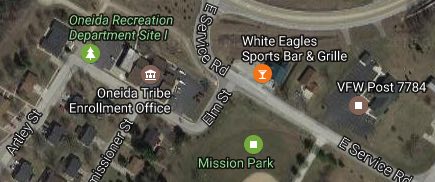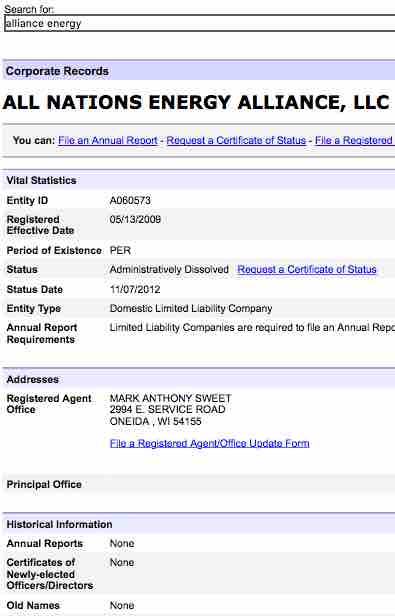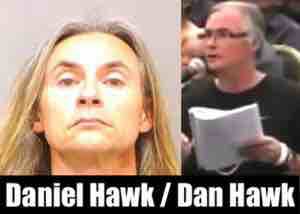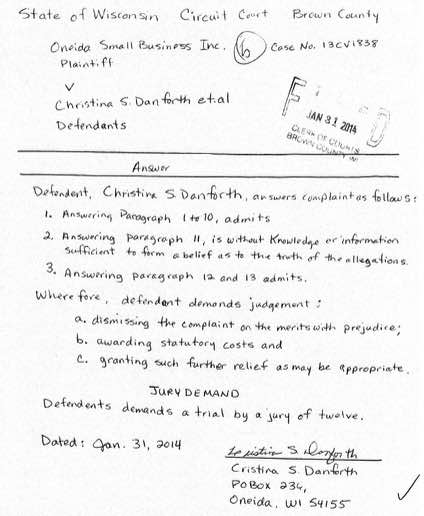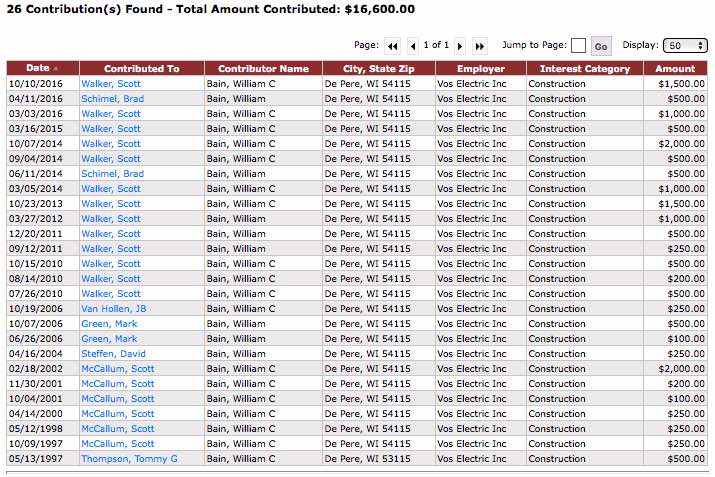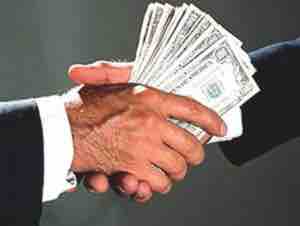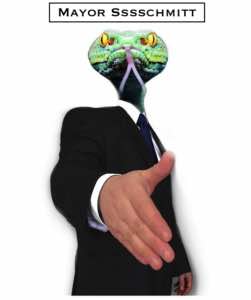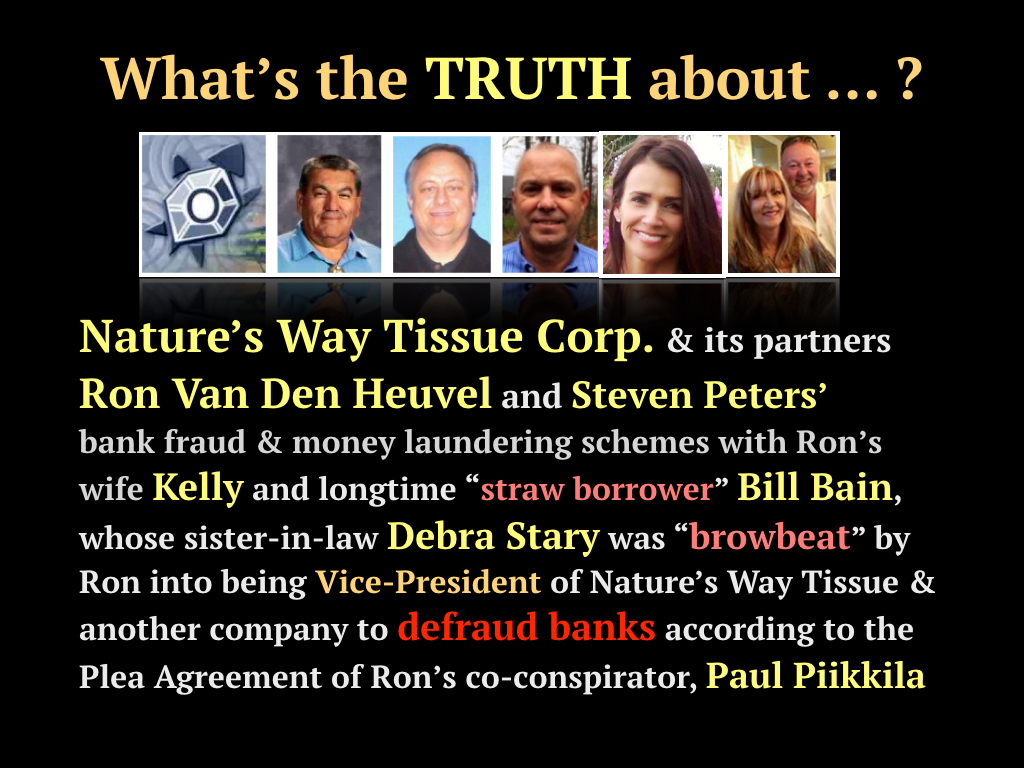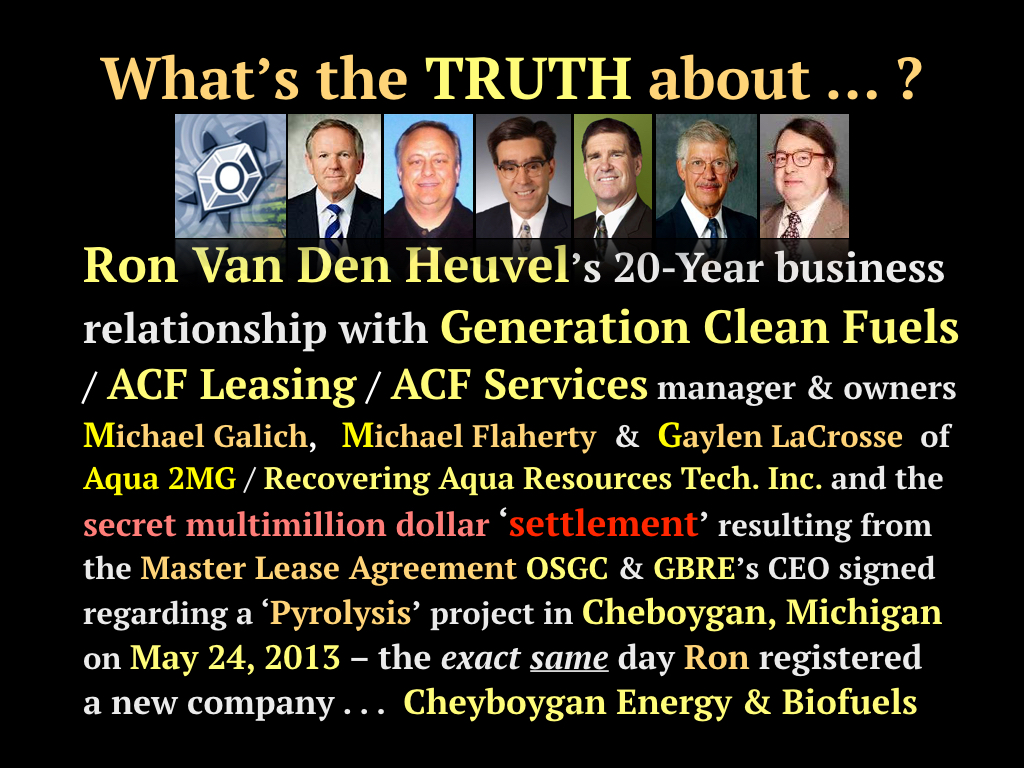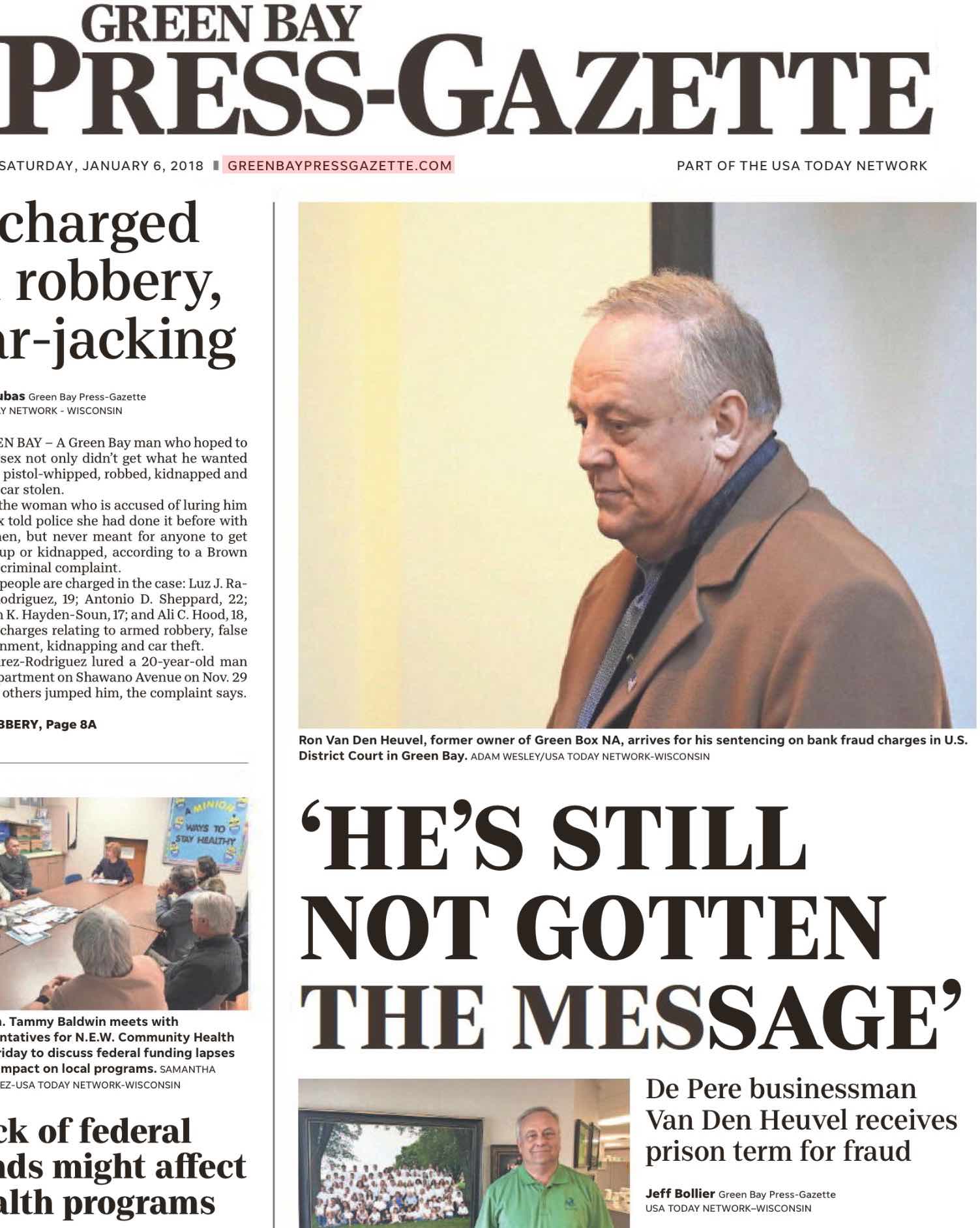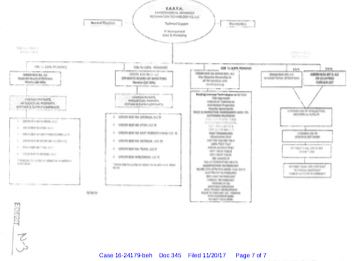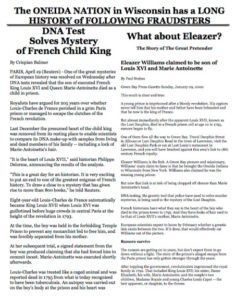Be sure to see
our revamped GALLERY!
09/04/18 : September 4, 2018 Evidentiary Hearing minutes, U.S. District Court, Eastern District of Wisconsin, Case No. 17-CR-160, United States of America v. Ronald H. Van Den Heuvel
10:16 am The Court FINDS that Mr. Van Den Huevel has knowingly and voluntarily given up his right to have an attorney represent him.
10:21 am Further inquiry as to competence, mental alertness and competence to make the decision to represent himself.
The Court notes the record is to reflect that his wife is shaking her head no in the back of the Courtroom.
The Court inquires as to any question of competence.
Mr. Krueger requests further questioning, not a formal evaluation.
Mr. LeBell responds that both criteria are satisfied.
Mr. Krueger responds, does not see need for further evaluation.
The Court inquires as to blood sugar levels and documentation.
Mr. LeBell responds.10:24 am The Court is satisfied that defendant is not suffering from any mental incompetence or impairment.
The Court finds that Defendant has freely and voluntarily waived his right to have counsel represent him and ACCEPTS his waiver of right to counsel.
Mr. LeBell is to supplement record with any evidence of Defendant’s physical condition today.10:25 am Motion to remove Mr. LeBell as legal counsel is GRANTED.
The Court would like Mr. LeBell to remain on this case as stand-by counsel.
The Court will enter an order clarifying the responsibilities of stand-by counsel.10:26 am The Court takes a recess.
10:44 am The Court resumes.
The Court DENIES Defendant’s Motion for change of venue at this time. …4:24 pm … The Court inquires if Defendant would like to reconsider his Motion to dismiss court appointed counsel.
Defendant WITHDRAWS his Motion to dismiss court appointed counsel. GRANTED.
Mr. LeBell is re-appointed as counsel of record for Defendant.
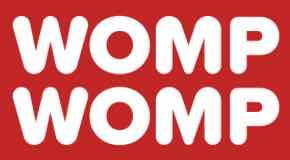
08/31/18 : August 31, 2018 Reply Brief for Defendant Ron Van Den Heuvel’s Motion for Change of Venue, U.S. District Court, Eastern District of Wisconsin, Case No. 17-CR-160, United States of America v. Ronald H. Van Den Heuvel
[V]irtually every event that has occurred in the defendant’s cases, as well as matters relating to the defendant, but not specifically part of the court filings, is described in the blog or is easily accessible through a link conveniently provided by the blog’s author. There is virtually no need for access to PACER in this case because the Oneida Eye has provided the same service to the public. PACER, at least, offers the reader the documents in a non-editorialized fashion.
The blogger from the Oneida Eye has depicted [Ron] Van Den Heuvel as the virtual
Anti-Christ. Contrary to the claim of the government, the pretrial coverage is not simply routine press offerings. They, in concert, paint a vivid picture of the defendant’s alleged criminal conduct.
![]()
It should be noted that – contrary to the caption in this and previous court filings by Atty. Robert LeBell – the Defendant’s REAL NAME is Ronald H. Van Den Heuvel / Ronald Hewry Van Den Heuvel.
When confronted by Oneida Eye on 8/10/18 in front of U.S. Atty. Matthew Krueger about using the wrong middle initial (‘D’), defense attorney Robert LeBell blamed his secretary – yet Attorney LeBell continues to submit court filings using the WRONG NAME for his client.

Of course, Ron Van Den Heuvel doesn’t spell his court-appointed attorney’s name correctly, either…
08/22/18 : August 22, 2018 Defendant Ron Van Den Heuvel Pro Se Motion to Dismiss court-appointed counsel Atty. Robert LeBell, U.S. District Court, Eastern District of Wisconsin, Case No. 17-CR-160, United States of America v. Ronald H. Van Den Heuvel
I. Failure to communicate
Attorney Robert LaBell [sic] has failed to adequately communicate with the defendant, severely prejudicing the defendant’s ability to prepare for trial and aid in his own defense.II. Failure to investigate
The defendant asserts that Attorney Robert LaBell [sic] has failed to review numerous documents, or obtain expert assistance on technical matters of which the defendant’s case relies heavily on, that would aid in the proper defense of the defendant.
![]()
- August 22, 2018 Defendant Ron Van Den Heuvel Pro Se Motion for Return of Property, U.S. District Court, Eastern District of Wisconsin, Case No. 17-CR-160, United States of America v. Ronald H. Van Den Heuvel
The Defendant contends that the failure by the government to return Defendant’s server from where it was seized to the Defendant has allowed for the illegal sharing of documents. These emails and documents have been illegally taken, in some instances altered and given to the government and the Oneida Eye.
![]()
08/20/18 : August 20, 2018 Memorandum in Support of Defendant Ron Van Den Heuvel Motion for Change of Venue, U.S. District Court, Eastern District of Wisconsin, Case No. 17-CR-160, United States of America v. Ronald H. Van Den Heuvel
It respectfully suggested that the court change venue to Milwaukee. Jury management for the Eastern District of Wisconsin in Milwaukee has advised that it seeks to secure jurors from a geographical area close in proximity to the city. Milwaukee jurors would not have been infected with the same taint as prospective jurors form [sic] Green Bay.
![]()
08/09/18 : August 9, 2018 Motion by Thomas W. Patton to Withdraw as Defendant-Appellant Ron Van Den Heuvel’s Appointed Counsel on Appeal of 16-CR-64, U.S. 7th Circuit Court of Appeals, Appellate Case No. 18-1147, United States of America, Plaintiff-Appellee v. Ronald H. Van Den Heuvel, Defendant-Appellant
Based upon his thorough and conscientious review of the entire record of the proceedings in the district court below, and from communications with the Defendant-Appellant, the undersigned attorney has concluded that there exists no non-frivolous issue that can be raised in this appeal on behalf of the Defendant-Appellant. …
Wherefore, Thomas W. Patton respectfully requests the entry of an order granting him leave to withdraw as the Defendant-Appellant’s appointed counsel on appeal in the above-entitled cause.
![]()
- August 9, 2018 Brief in Support of Motion by Thomas W. Patton to Withdraw as Defendant-Appellant Ron Van Den Heuvel’s Appointed Counsel on Appeal of 16-CR-64, U.S. 7th Circuit Court of Appeals, Appellate Case No. 18-1147, United States of America, Plaintiff-Appellee v. Ronald H. Van Den Heuvel, Defendant-Appellant [152 pages w/ Exhibits including 01/05/18 Sentencing Hearing transcript]
SUMMARY OF ARGUMENT
Van Den Heuvel cannot raise any argument regarding the motion to suppress because it has been waived for direct appeal in this case. He waived the issue by withdrawing the motion in the district court and by entering into a unconditional guilty plea.
Any argument challenging Van Den Heuvel’s conviction would be frivolous where he entered into an unconditional, knowing, and voluntary plea of guilty, pursuant to a plea agreement, and the district court substantially complied with Federal Rule of Criminal Procedure 11 when accepting his plea. The Rule 11 colloquy in this case was thorough and adequately advised Van Den Heuvel. Furthermore, the district court did not err by denying Van Den Heuvel’s motion to withdraw the guilty plea. He was not coerced into the plea because it contained an agreement to dismiss charges against his wife and he did not provide any evidence that he was actually innocent of the conspiracy he pled guilty to.
The district court did not abuse its discretion by denying Van Den Heuvel’s motion to adjourn the sentencing hearing and did not err in denying counsel’s motion to withdraw as attorney. Both motions were made a few days prior to sentencing and were not supported by evidence or adequate reasons for granting.
Any argument challenging Van Den Heuvel’s sentence would be frivolous where his sentence was not imposed in violation of the law, was not the result of an incorrect application of the guidelines, and was not unreasonable. The district court did not err by imposing a term or the conditions of supervised release.
![]()
- August 9, 2018 Notice: Counsel for the defendant has filed a motion for leave to withdraw under Circuit Rule 51(b), U.S. 7th Circuit Court of Appeals, Appellate Case No. 18-1147, United States of America, Plaintiff-Appellee v. Ronald H. Van Den Heuvel, Defendant-Appellant
On August 9, 2018, your attorney filed a brief stating that your appeal is frivolous and requesting permission to withdraw from the case.
1. You have 30 days from the date at the top of this notice to present any argument that you believe shows that your conviction or sentence is invalid. …
![]()
- August 9, 2018 Defendant Ronald Van Den Heuvel’s Local Rule 12c Statement, U.S. District Court, Eastern District of Wisconsin, Case No. 17-CR-160, United States of America v. Ronald H. Van Den Heuvel
![]()
08/07/18 : Green Bay Press-Gazette / USA TODAY– Ron Van Den Heuvel wants to dismiss court-appointed attorney Robert LeBell, federal prosecutors claim it’s a stall tactic

 July 31, 2018 USA’s Response to Defendant Ron Van Den Heuvel’s 07/20/18 Motion & Memo w/ Exhibit re: Van Den Heuvel’s attempt to get out of jail for a few months by demoting Ron’s court appointed counsel Robert LeBell to being the co-counsel of Ron’s on/off-again ‘attorney’ Ty Willihnganz, U.S. District Court, Eastern District of Wisconsin, Case No. 17-CR-160, United States of America v. Ronald H. Van Den Heuvel
July 31, 2018 USA’s Response to Defendant Ron Van Den Heuvel’s 07/20/18 Motion & Memo w/ Exhibit re: Van Den Heuvel’s attempt to get out of jail for a few months by demoting Ron’s court appointed counsel Robert LeBell to being the co-counsel of Ron’s on/off-again ‘attorney’ Ty Willihnganz, U.S. District Court, Eastern District of Wisconsin, Case No. 17-CR-160, United States of America v. Ronald H. Van Den Heuvel
Excerpt of Exhibit A, Brown Co. Jail telephone conversation transcript:
Ron Van Den Heuvel: I need, I need that, I need that thing so bad that I got a couple, a couple people think that it’ll get me 12-14 weeks out of here. So…
Michael Garsow: Oh, wow.
Ron Van Den Heuvel: Yep.
![]()
- July 20, 2018 Defendant Ronald Van Den Heuvel’s Memorandum of Law, U.S. District Court, Eastern District of Wisconsin, Case No. 17-CR-160, United States of America v. Ronald H. Van Den Heuvel
The Department of Justice and prosecution know for certain that millions of illegally gained private documents from the general search have been given to the Oneida Eye. This allows Google to pick them up for the social media.
![]()
- July 20, 2018 Defendant Ronald Van Den Heuvel’s Notice of Motion and Motion to Dismiss the Use of Defendant’s Court Appointed Counsel, U.S. District Court, Eastern District of Wisconsin, Case No. 17-CR-160, United States of America v. Ronald H. Van Den Heuvel
Defendant’s counsel and the late attorney, Mike Fitzgerald had on multiple occasions requested the return of over 290,000 pages of documents and the defendant’s server which were both taken 2077A and 2077B offices in the raid. To date, the server has not been returned. Through due diligence, the defendant located the PCDI server. Failure by the defendant’s counsel to report the email hacking incident allowed for the breach to continue unchecked. The 1,700 pages presented by the DOJ is clear proof that this theft of emails and delivery of them to the DOJ and the Oneida Eye did occur.
![]()
- 07/06/2018: Green Bay Press-Gazette / USA TODAY –
Green Box owner
Ron Van Den Heuvel jailed
for witness intimidation and
unauthorized spending
by Jonathan Anderson
[original version]
[Ron] Van Den Heuvel has been convicted of conspiracy to commit bank fraud for using straw borrowers to obtain loans under false pretenses for personal use and to keep his business, Green Box NA, and associated businesses afloat. He was sentenced in January to three years in prison, but he was allowed to remain free under certain conditions while additional federal charges — wire fraud and money laundering — remain pending.
U.S. District Court Judge William Griesbach had required Van Den Heuvel to notify the government of any financial transactions larger than $500, file monthly reports disclosing income and bank statements and disclose his legal and financial troubles to potential investors.
Prosecutors alleged that Van Den Heuvel in May paid $3,500 in cash to Oneida Golf and Country Club without the government’s approval and had previously paid nearly $15,000 to the club between September 2017 and February 2018.
The government also alleged that Van Den Heuvel failed to submit bank account statements as required, even though prosecutors believe that Van Den Heuvel has numerous accounts under his control but not in his name. …
Van Den Heuvel also was accused of engaging in “subtle intimidation of witnesses in recent contacts,” selling a van without authorization and attempting to sell a pyrolysis machine that is the subject of claims from multiple creditors.
Van Den Heuvel is charged in federal court with 14 counts of wire fraud and money laundering related to $9 million collected from investors in his now-bankrupt Green Box recycling business. The case is scheduled to go to trial on November 13.
[updated version]
Ron Van Den Heuvel, the De Pere businessman accused of bilking millions from investors, was jailed Friday after authorities alleged he committed more fraud and intimidated witnesses while free on bond.
“Fraud has continued,” U.S. District Court Judge William Griesbach said. “He’s continued to commit crimes.”
Van Den Heuvel was sentenced to three years in prison in January for conspiracy to commit bank fraud and, in a second case, also faces 14 counts of wire fraud and money laundering for allegedly deceiving investors out of $9 million in his now-bankrupt Green Box recycling business. …
Court records show Van Den Heuvel and his family spent more than $18,000 in total at the club between September and May — all while he claimed to be indigent and in need of a public defender.
Van Den Heuvel, who took the witness stand to testify, said he told the lender the $20,000 loan would be used for business expenses.
Receipts show most if not all of the money was used to buy equipment, golf lessons and food such as shrimp cocktails and tacos for Van Den Heuvel’s wife and children.
Van Den Heuvel’s wife also transferred the title of a van worth $2,500 to help pay down a debt.
Krueger said Van Den Heuvel also failed to submit bank account statements as required. Investigators believe that Van Den Heuvel has numerous accounts under his control even though not all are in his name.
- July 6, 2018 Bond Review Hearing Minutes re: Government’s Motion for Revocation or Modification of Release Order of Ron Van Den Heuvel, U.S. District Court, Eastern District of Wisconsin, Case Nos. 17-CR-160 and 16-CR-64, United States of America v. Ronald H. Van Den Heuvel
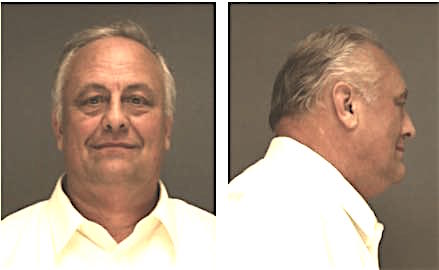
#LockedHimUp
- 07/09/18: ABC 2 WBAY – “Fraud has continued”: WEDC funding recipient Ron Van Den Heuvel’s release revoked in fraud case
On July 6, the court ordered a bond hearing. There was testimony that Van Den Heuvel had received a $20,000 loan and spent thousands of dollars at Oneida Golf and Country Club.
“The Court is satisfied that fraud has continued and the defendant has shown disregard for the orders of this Court,” reads the federal court records. “The Court finds the temptation to flee or take steps to avoid responsibility of facing trial is strong.”
Van Den Heuvel still faces prosecution for a federal indictment on 14 counts of wire fraud and money laundering.
Prosecutors say he fraudulently obtained more than $9 million in loans and investments for his eco-friendly “Green Box” business plan.
The indictment alleges that Van Den Heuvel claimed that Green Box could turn post consumer waste into usable consumer products and energy. …
Van Den Heuvel allegedly defrauded a range of victims, including individual acquaintances, the Wisconsin Economic Development Corporation (WEDC), a Canadian private investment firm, and Chinese investors in the EB-5 immigrant investor program.
In October of 2011, WEDC provided Green Box NA Green Bay, LLC with a loan of $1,116,000 to purchase equipment to create 116 jobs in the “Green Box” operation.
Instead, the indictment says he submitted false certifications claiming to have spent the funds properly.
In January of 2012, WEDC also awarded Green Box with a $95,000 grant to reimburse the company for costs to train new workers. Van Den Heuvel is accused of submitting fraudulent time records for training that never happened.
Counts 1-10 of the indictment charge Van Den Heuvel with executing the scheme to defraud by use of interstate wire communications. Maximum penalty on each count includes not more than 20 years in prison, a fine of $250,000 or both, plus a mandatory $100 special assessment and a period of supervised release.
Counts 11-14 charge Van Den Heuvel with unlawful financial transactions involving the ill-gotten gains. The maximum penalty for each individual count includes not more than 5 years in prison a fine of $250,000 or both. Plus a mandatory $100 special assessment and a term of supervised release not to exceed three years.
- 07/11/18 : Wisconsin State Journal – WEDC writes off $1.1 million loan to convicted De Pere businessman Ron Van Heuvel
- Milwaukee Journal Sentinel / USA TODAY – Wisconsin jobs agency WEDC writes off $1.1 million loan owed by De Pere businessman Ron Van Den Heuvel jailed for defrauding investors
- FOX 11 WLUK – WEDC to write off loan to failed De Pere business Green Box NA Green Bay LLC owned by Ron Van Den Heuvel
See also:
• July 11, 2018 WI State Senator Dave Hansen Press Release,
WEDC’s Continued Failure, Green Box Edition
• July 11, 2018 WI State Senator Jennifer Shilling Press Release,
Can’t pay back $1 million loan? WEDC says ‘No worries’; Walker’s troubled job agency leaves taxpayers with the bill, again
• July 11, 2018 Democratic Party of Wisconsin Press Release,
Walker’s WEDC foots taxpayers with $1 million loan given to conman in exchange for zero jobs; WEDC’s mismanagement casts more doubt on Foxconn deal

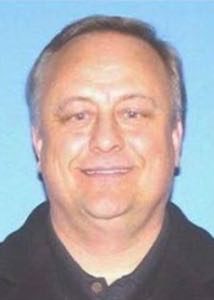
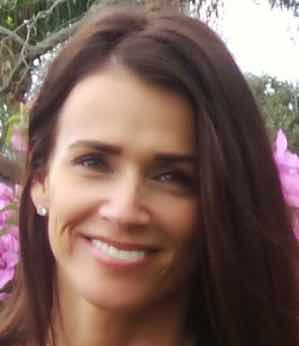 July 3, 2018 USA’s Motion for Revocation or Modification of Release Order of Defendant Ronald Van Den Heuvel w/ Exhibits, U.S. District Court, Eastern District of Wisconsin, Cases No. 16-CR-64 and 17-CR-160, United States of America v. Ronald H. Van Den Heuvel [27 pages]
July 3, 2018 USA’s Motion for Revocation or Modification of Release Order of Defendant Ronald Van Den Heuvel w/ Exhibits, U.S. District Court, Eastern District of Wisconsin, Cases No. 16-CR-64 and 17-CR-160, United States of America v. Ronald H. Van Den Heuvel [27 pages]
[Ron] Van Den Heuvel appears to keep bank accounts and assets out of his name to avoid detection. First, the government’s investigation has found numerous bank accounts that Van Den Heuvel controlled but titled in the names of entities or other individuals, often with his wife Kelly Van Den Heuvel having signatory authority. …
This pattern suggests that Van Den Heuvel is likely using bank accounts in others’ names without disclosing the accounts to Pretrial Services. …
The government recently learned that Van Den Heuvel attempted to persuade a company located in Boise, Idaho [Dynamis Energy] to purchase a pyrolysis machine[.] …
In recent weeks, Van Den Heuvel has contacted individuals after learning that they made statements to investigating agents. In several cases, Van Den Heuvel apparently had no legitimate reason to contact the witnesses but rather made the contact for the purpose of conveying his awareness of their cooperation with law enforcement. …
First, on June 18, 2018, the United States submitted to Pretrial Services the report of interview of Oneida Golf & Country Club employee M.J. The United States also provided Van Den Heuvel’s counsel with a copy of the report. That same day, Van Den Heuvel called M.J. to “thank” her and express apologies for her having to speak with the investigative agent, whom he described as an “asshole.”
Second, that same day, June 18, 2018, Van Den Heuvel sent a text message to a witness [Mason Kashat] whose statement had been disclosed to Van Den Heuvel in discovery. They spoke by phone the next day and Van Den Heuvel claimed he had nearly closed a deal and would be able to repay Ma.K. soon. Van Den Heuvel also added that he had read Ma.K.’s “testimony” and was “not mad” at Ma.K. or his partner, who had also made a statement to investigators.
[A]lso on June 18, 2018, Van Den Heuvel called [Brian Glimes], who previously worked for Van Den Heuvel at a sorting and pulping facility. Van Den Heuvel claimed he called to relay that he planned to purchase the facility. But then Van Den Heuvel went on to say he got a “cute note” from the FBI, which reflected that B.G. had used his own money to pay for business expenses at Van Den Heuvel’s request. This apparently referred to a statement that Van Den Heuvel read in a report of interview that B.G. had given. …
[I]n April 2018, very shortly after receiving information in discovery about [Alex Knapp]’s cooperation with the government, Van Den Heuvel called A.K. According to A.K., Van Den Heuvel screamed and cursed at him because A.K. had forwarded an email from Van Den Heuvel to the government. …
[Ron] Van Den Heuvel has not provided meaningful disclosure of his finances to Pretrial Services. He and his family must be using some bank accounts, but he has not disclosed any account records. It appears that the only financial records Van Den Heuvel has produced are records he generated himself. Given his bank fraud conviction and the pending charges in this case, the Court should be highly skeptical of records he produces. That is why obtaining records from third-party financial institutions is so important. The government’s investigation has identified dozens of bank accounts opened by the Van Den Heuvels at numerous banks over the years. Because they switch accounts so frequently, however, Pretrial Services has no effective way to monitor Van Den Heuvel if he does not disclose his financial records. …
Given the evidence that Van Den Heuvel violated release conditions and committed additional crimes, detention is warranted on the ground that Van Den Heuvel is “unlikely to abide by any condition or combination of conditions of release.” … Van Den Heuvel has demonstrated his inability to comply with even simple conditions of release, such as seeking Pretrial Services’ approval for financial transactions. The evidence suggest this inability flows from intractable dishonesty. … These patterns are longstanding with Van Den Heuvel, who was convicted of defrauding Horicon Bank and now faces charges for another convoluted fraud scheme in Case No. 17-CR-160.
[Ron] Van Den Heuvel has displayed no sign of stopping his fraudulent conduct. …
This reinforces the conclusion that [Ron] Van Den Heuvel is a persistent, unrepentant fraudster, even after being convicted of bank fraud and sentenced to three years of imprisonment.
In sum, the Court cannot find that Van Den Heuvel would comply with new release conditions. The defense will likely propose home confinement or restrictions on Van Den Heuvel’s ability to communicate with witnesses or engage in financial transactions. His track- record, however, provides no basis to believe he would comply with those conditions. In addition, the burden on Pretrial Services to try to monitor his compliance would be unreasonable. …
The nature and circumstance of the offense charged, although not a violent crime, is very serious, with fraud loss amounts exceeding $9 million. If convicted of the whole scheme, Van Den Heuvel would be exposed to the potential of lengthy incarceration. This creates an increased likelihood of flight and of Van Den Heuvel engaging in extreme actions, as he has already shown a willingness to contact witnesses inappropriately. …
Numerous witnesses, both victims and individuals who worked with Van Den Heuvel, will testify that Van Den Heuvel made false representations about the Green Box process and how lenders and investors’ funds would be used. Representations about how the funds would be used were also reduced to writing in agreements. Financial records and receipts of expenditures show, in concrete and undisputable fashion, how Van Den Heuvel quickly diverted huge sums of investors’ and lenders’ funds to unauthorized purposes to fuel his lavish lifestyle. This overwhelming evidence increases the risk that Van Den Heuvel will flee or act dangerously towards others. …
Van Den Heuvel has demonstrated increasingly erratic behavior, as shown by his inappropriate contacts with witnesses. Further, Van Den Heuvel is relatively sophisticated and well-traveled with an uncanny ability to persuade people to lend him large sums of money. His wife and children recently visited the Cayman Islands. … As the trial in this case approaches and Van Den Heuvel runs out of ways to delay incarceration, there is a significant risk that he may seek to flee. …
[W]itnesses have stated that Van Den Heuvel can become verbally aggressive and that he physically assaulted one witness. Specifically in August 2011, former business partner [Howard Bedford] confronted Van Den Heuvel regarding his fraudulent misuse of funds, and Van Den Heuvel responded by punching H.B. in the head. H.B. states that he took himself to a hospital afterwards and was diagnosed with a concussion. More recently, Van Den Heuvel was verbally abusive towards A.K., and he has engaged in subtle intimidation of witnesses in recent contacts.
Taken together, the Court could also base detention on the finding that no condition or combination of conditions will assure that Van Den Heuvel will not flee or pose a danger to the safety of another person or the community. …
The above discussion … shows why Van Den Heuvel cannot show that he is unlikely to flee, given the significant incarceration he faces, his ability to access funds, and his familiarity with international travel. Nor can he show he is unlikely to be dangerous to others, given his persistent fraud schemes and aggressive behavior to individuals who have been confronted him and cooperated with the government. …
Given Van Den Heuvel’s disregard for his conditions of release, it is appropriate for the Court to follow through with its initial plan of having him begin to serve his sentence in Case No. 16-CR-64. …
Once Uponzi Time . . .
![]() • UpNorthLive.com
• UpNorthLive.com
Multi-million dollar investment
lands jobs for Cheboygan
– by Marc Schollett /
WPBN – Traverse City, MI
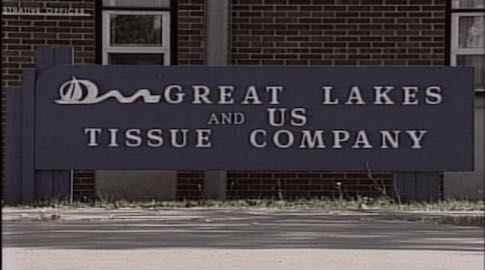
Thu, 29 May 2014 00:33:33 GMT —
More than 130 workers could be on the job at Cheboygan’s Great Lakes Tissue Company thanks to a $150 million investment. Green Box NA, LLC is investing close to $350 million dollars, split between facilities in Cheboygan and Detroit.The project will take restaurant paper waste from around the Detroit area, and after some pre-processing, transfer the material to Cheboygan in the form of bails and pellets for final processing into both commodity and value-added, finished product components. This process is supposed to keep the paper from restaurants, which they probably waste a lot of, out of landfills and reuse the paper or it will be recycled. Chairman of Greenbox [sic / Green Box NA], Ron Van Den Heuvek [sic / Ron Van Den Heuvel], says they are looking to revitalize Great Lakes Tissue Company Mill by acquiring them and installing $150 Million in new equipment. The Cheboygan facility’s operation will include production of bath, facial, napkin and towel tissue products, as well as biofuels, fuel pellets and soil enhancements.
The project should be up and running in the next 18 months. “Today’s projects will help strengthen and revitalize these Michigan communities and help growing companies generate new job opportunities,” said [Michigan Economic Development Corp.] MEDC President and CEO Michael A. Finney. “We should all applaud these investments in Michigan’s future.”
According to the April 6, 2015 Plaintiffs–Appellants’ Brief in Cook County IL Case No. 2014-L-2768, ACF Leasing LLC, ACF Services LLC and Generation Clean Fuels LLC v. Green Bay Renewable Energy LLC, Oneida Seven Generations Corp. and the Oneida Tribe of Indians of Wisconsin [n/k/a Oneida Nation WI], w/ Exhibits:
Louis Stern and Kevin Cornelius signed the [Generation Clean Fuels, LLC] Agreements in May and June, 2013. …
Throughout the negotiations of the Agreements, OSGC and the Tribe representatives repeatedly represented to ACF that they are acting on behalf of the Tribe/OSGC and referred to the Tribe, OSGC and GBRE as though they were one and the same. … Kevin Cornelius and Bruce King repeatedly corresponded with ACF regarding the Project, utilizing OSGC email addresses and OSGC letterhead and utilized OSGC’s office. … Kevin Cornelius and Bruce King represented to ACF that GBRE was only a vehicle for tax purposes, that the Agreements were with the Tribe/OSGC and that Kevin Cornelius had authority to enter into the Agreements and waive sovereign immunity on behalf of the Tribe, OSGC and GBRE. …
In reliance on the representations of Kevin Cornelius, Bruce King, and William Cornelius that they had they permission of the Tribe and OSGC to enter into the Agreements, ACF continuously performed a variety of tasks to meet its obligations under the Agreements once they were executed. … In fact, Kevin Cornelius and Bruce King sent numerous documents related to the Project to Eric Decator in Illinois, but none of these documents referred to GBRE, which was consistent with ACF’s understanding that the actual parties to the Project were OSGC/the Tribe.
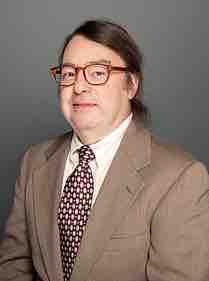
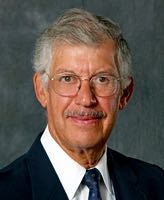 08/30/13 : According to the April 6, 2015 Plaintiffs–Appellants’ Brief in Cook. Co. Case No. 2014-L-2768, GCF/ACF v. ONWI & OSGC et al., and Exhibits:
08/30/13 : According to the April 6, 2015 Plaintiffs–Appellants’ Brief in Cook. Co. Case No. 2014-L-2768, GCF/ACF v. ONWI & OSGC et al., and Exhibits:
On August 30, 2013, Bruce King [CFO of OSGC/Treasurer of GBRE], Cathy Delgado [Cristina Danforth’s sister and OSGC Board member], William Cornelius [Oneida Gaming Commission attorney and OSGC Chairman & Board President], Brandon Stevens [Oneida Business Committee member] and Michael Galich [ACF/GCF co-Owner] went to ACF’s plant in Bakersfield, California to examine the type of machines that would be utilized in the Project. …Based on all of the foregoing meetings, telephone conferences and visits to ACF’s plant by the Tribe and OSGC, ACF believed it was negotiating the Project with the Tribe and OSGC. …ACF relied upon the representations of the Tribe/OSGC that they were acting on behalf of the Tribe/OSGC.
- 09/03/13:
Green Box NA Georgia Macon Ethanol LLC registered w/ WDFI; Registered Agent listed as Ron Van Den Heuvel’s ‘umbrella company’ of fraud Environmental Advanced Reclamation Technology HQ, LLC [a/k/a EARTH; f/k/a Nature’s Choice Tissue Corp., renamed Reclamation Technology Systems / RTS]; GBNAGME was Administratively Dissolved 09/14/15
THAT SAME DAY . . .
- NBC 26 WGBA: Oneida Seven Generations Corp. CEO Kevin Cornelius steps down
JUST DAYS LATER . . .
 09/06/13 : Judgment, Brown Co. Case No. 09CV439, Glory LLC v. Ron Van Den Heuvel & Tissue Technology LLC [and dismissed defendants: Partners Concepts Development Inc; Custom Paper Products Inc; Natures Choice Tissue LLC; Purely Cotton Products Corp; Eco Fibre Inc; ReBox Packaging Inc; Tissue Products Technology Corp; Patriot Project Services LLC; Chat LLC; Patriot Investments LLC; Patriot Services Inc; RVDH Inc; Waste Fiber Technology Inc; Recovering Aqua Resources Inc; RV Jet Inc; KYHKJG LLC; Patriot Paper Services Inc; Fibre Solutions LLC; Doc-U-Mince LLC; and dismissed third-party defendants: Ross J. Nova; Godfrey & Kahn.] – MONEY JUDGMENT AGAINST TISSUE TECHNOLOGY, LLC: $1,227,880.01
09/06/13 : Judgment, Brown Co. Case No. 09CV439, Glory LLC v. Ron Van Den Heuvel & Tissue Technology LLC [and dismissed defendants: Partners Concepts Development Inc; Custom Paper Products Inc; Natures Choice Tissue LLC; Purely Cotton Products Corp; Eco Fibre Inc; ReBox Packaging Inc; Tissue Products Technology Corp; Patriot Project Services LLC; Chat LLC; Patriot Investments LLC; Patriot Services Inc; RVDH Inc; Waste Fiber Technology Inc; Recovering Aqua Resources Inc; RV Jet Inc; KYHKJG LLC; Patriot Paper Services Inc; Fibre Solutions LLC; Doc-U-Mince LLC; and dismissed third-party defendants: Ross J. Nova; Godfrey & Kahn.] – MONEY JUDGMENT AGAINST TISSUE TECHNOLOGY, LLC: $1,227,880.01
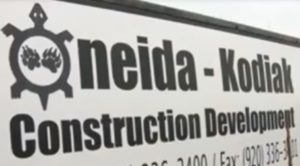 Glory, LLC changed Registered Agent w/ WDFI – previously Kevin Cornelius; currently OSGC Managing Agent Pete King III
Glory, LLC changed Registered Agent w/ WDFI – previously Kevin Cornelius; currently OSGC Managing Agent Pete King III
- Oneida-Kodiak Construction, LLC changed Registered Agent w/ WDFI
RELATED . . .
Mrs. [Sheri] Cornelius’ Class
Hello! I’m so happy to be teaching at CES [Cherokee Elementary School]! I grew up here and graduated from the Cherokee school system and I am the daughter of Lee and Peggy Jenks. I moved away and met my husband and raised our children in Green Bay WI. I then went back to to school to get my teaching degree. I knew that I wanted to return home and teach at the same school that I graduated from. I love teaching and I am really happy to be home again.
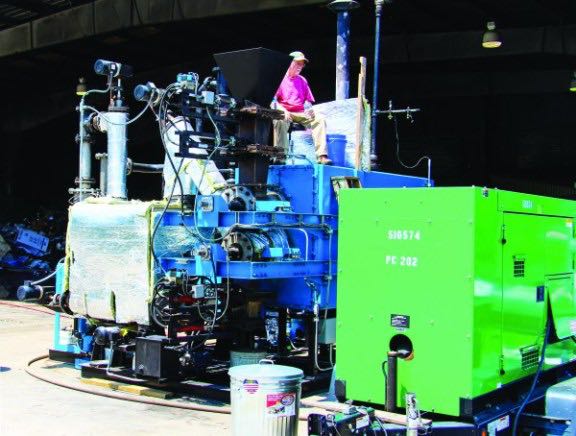
 • May 26, 2016 –
• May 26, 2016 –
Tribe looking into
waste-to-energy program
The Eastern Band of Cherokee Indians
in North Carolina is currently looking into
a waste-to-energy process known as
pyrolysis at the Tribal Transfer Station
– by Scott McKie /
Cherokee One Feather
A machine currently located at the Tribal Transfer Station off of Olivet Church Road looks like something out of “Charlie and the Chocolate Factory”, but it is the future of waste disposal and energy production according to the Tribe’s energy program coordinator.
The machine is running a two-week demonstration of pyrolysis (thermal distillation) which converts recycled bottles, old tires and other waste into a synthesis gas known as Pyrogas. “This process has been around since World War II,” said Cameron Cooper, who garnered three grants from the Department of Energy and Mineral Development for the Eastern Band of Cherokee Indians totaling over $750,000 to study this process. …
The machine that is being used for the two-week demonstration came from American Renewable Technologies Inc. [ARTI] based in Los Angeles. …
The second part of the grant is the two-week demonstration itself, and the third portion of the grant will allow for a prolonged demonstration and allow Cooper and staff to experiment with different feed stocks and municipal solid wastes. …
Cooper said the reason for the two-week demonstration is easy. “I wanted to bring it here for the Cherokee people to see. I want them to come out here to kick the tires so to speak. I didn’t want them to get the wrong impression that it was an incinerator. I didn’t just want to submit a business plan. I wanted people to feel it, touch it, smell it, see it.”

REALITY CHECK :
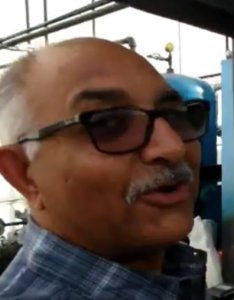
Abdul Latif Mahjoob
- December 5, 2016 Order Granting Plaintiff’s Motion to Compel Defendants Mahjoob et al. to Produce Documents, U.S. District Court, District of Nevada/Las Vegas, Case No. 2:2015CV694, CH2E Nevada LLC v. Abdul Latif Mahjoob & American Combustion Technologies Inc. / ACTI
This action arises out of a business dispute. … Plaintiff purchased specialized equipment from [Abdul Latif Mahjoob & American Combustion Technologies Inc. / ACTI], which allegedly did not perform as promised. …
Additionally, [Abdul Latif Mahjoob & ACTI] did not provide certain documents that Plaintiff asserts they were contractually required to provide. … Plaintiff therefore brought claims for fraudulent inducement, negligent misrepresentation, breach of contract, breach of warranty, and revocation…
The Court agrees with Plaintiff. Plaintiff’s complaint alleges that Defendants provided equipment that, “as designed and manufactured,” cannot “function at the levels promised and warranted by Defendants.” … The information Plaintiff seeks is relevant and necessary to determining whether manufacturing defects exist.
- November 2, 2017 CH2E Nevada LLC’s Motion for Status Conference w/ Exhibits re: “[American Combustion Technologies Inc.] ACTI’s threatened bankruptcy and fraudulent conveyances to its new company, ARTI [American Renewable Technologies Inc.]“, U.S. District Court / Nevada Case No. 15-CV-694, CH2E Nevada LLC v. [Abdul] Latif Mahjoob and American Combustion Technologies of California Inc. [ACTI]
8. CH2E believes that ACTI is filing this bankruptcy as a litigation tactic to avoid paying any judgment to CH2E. After the commencement of this litigation, ACTI’s founder, Latif Mahjoob, started a new company called American Renewable Technologies Inc. (“ARTI”). When asked about ARTI at his November 4, 2015 deposition, Dr. Mahjoob testified that ARTI was not a pyrolysis company like ACTI, but instead was a “gas to liquid fuel” company:
Q. Okay. What is American Renewable Energy [sic], Inc.?
A. It’s a company I own.
Q. What does it do?
A. It customer [sic / converts ] gas to liquid fuel. We take natural gas and turn it into liquid fuel.
Q. It’s not a pyrolysis unit – process?
A. No, not really.
[Ex. C (Mahjoob Dep. Tr.) at 174:10-16. 9.]However, publicly available information demonstrates that Dr. Mahjoob is now using ARTI to carry on the pyrolysis business of ACTI, the assets of which he is depleting in an attempt to avoid paying any judgment in this case. Indeed, ARTI is holding itself out as ACTI with respect to its experience as a pyrolysis company—including with respect to the pyrolysis equipment ACTI sold to ARTI.
See Ex. D (ARTI Website, available at
https://www.americanrenewabletech.com).
- May 24, 2018 TEXT ONLY Chapter 7 Trustee’s Report of No Distribution, U.S. Bankruptcy Court / California Central District Case No. 17-bk-23617, Chapter 7, American Combustion Technologies of California Inc. /ACTI
I, Elissa Miller (TR), having been appointed trustee of the estate of the above-named debtor(s), report that I have neither received any property nor paid any money on account of this estate; that I have made a diligent inquiry into the financial affairs of the debtor(s) and the location of the property belonging to the estate; and that there is no property available for distribution from the estate over and above that exempted by law. Pursuant to Fed R Bank P 5009, I hereby certify that the estate of the above-named debtor(s) has been fully administered. I request that I be discharged from any further duties as trustee. Key information about this case as reported in schedules filed by the debtor(s) or otherwise found in the case record: This case was pending for 7 months. Assets Abandoned (without deducting any secured claims): $2,056,146.04, Assets Exempt: Not Available, Claims Scheduled: $11,049,423.32, Claims Asserted: Not Applicable, Claims scheduled to be discharged without payment (without deducting the value of collateral or debts excepted from discharge): $11,049,423.32. Filed by Trustee Elissa Miller (TR).
- Letter dated September 12, 2017 and ‘signed’ with rubber stamp marked ‘A.L. Mahjoob’ on behalf of American Combustion Technology Inc. and mailed to Oneida Eye Publisher Leah Sue Dodge:
Latif Mahjoob
American Combustion Technology Inc.
Compton, CA 90220
09/12/2017Dear Leah Sue Dodge:
It has come to ACTI’s attention that a defaming comment was posted on www.youtube.com under the username “Oneida Eye” that has been linked to Ms. Dodge. ACTI asks that Ms. Dodge immediately remove all comments made about Latif Mahjoob and ACTI or legal action will be taken for defamation of character. …
Your failure to remove all the defaming material will result in an immediate legal action against you.
Sincerely,
A. L. Mahjoob (rubber stamped)
Latif Mahjoob
American Combustion Technology Inc.Cc: James Kawahito, attorney.
PROBLEM:
Beyond the fact that the letter does not contain a valid signature, Oneida Eye is not aware of any companies owned by Abdul Latif Mahjoob that are named “American Combustion Technology Inc.“
The only companies owned by Abdul Latif Mahjoob that Oneida Eye is aware of include:
- Arian Engineering & Combustion Systems, Inc. [AECS] registered w/ the Illinois Sec. of State; Registered Agent & President A. Latif Mahjoob
- American Combustion Technologies, Inc. / ACTI
- American Combustion Technologies of California, Inc. / also ACTI

- American Renewable Energy Corp. / AREC in Kansas City, MO; President, Director, Treasuer – Stuart Z. Hirschman; President – Eduart Z. Itiraclussas; Secretary – Irving M. Bush; Director – A. Latif Mahjoob
- Green Peak, Inc. in Nevada; President & Director – Latif Mahjoob; Treasurer – Lila Mahjoob; Director – Daniel Rekitar; Member – Regina Kautskaya
- Q & L Holdings, LLC in California; Members – Abdul Latif Mahjoob; Qudsia Mahjoob (age 61)
Perhaps the threat letter was sent to Oneida Eye by one of Abdul Latif Mahjoob’s relatives:
- Arian Mahjoob
- Qays Mahjoob
 Related?:
Related?:
- Leagle.com: April 6, 2016 Decision, Docket No. B259878, Court of Appeals of California, Second District, The People of California v. Qays Mahjoob
04/25/2018:
DOE Office of Indian Energy
The Office of Indian Energy, in partnership with Western Area Power Administration, hosted a webinar on best practices for tribal energy business structures, including their advantages and disadvantages, goals associated with different business models, and examples of various models. Tribal leaders and community members will also learn how to select the best structure for their goals, existing codes, and laws.
Our tribal case study today is from the Eastern Band of Cherokee Indians. We have two individuals presenting their project: Cameron Cooper and Kevin Cornelius. Mr. Cooper was formerly the energy coordinator for the Eastern Band of Cherokee Indians. While serving as the energy coordinator he started a waste energy project to look at reducing waste-hauling and convert those waste _____ into energy. Mr. Cooper is presently serving as the retail development specialist for the Eastern Band of Cherokee Indians. This position supports retail development efforts by providing research data and marketing of the commercial interests of the Eastern Band of Cherokee Indians. Mr. Cooper still plays an integral role in the energy initiative and has oversight of the waste energy project that has been funded through multiple grants awarded by the Division of Energy and Metal Development.
Mr. Kevin Cornelius works for the Red Fern LLC to develop green energy projects.Over the past five years Red Fern has worked with multiple tribes on feasibility studies to determine the viability of using a variety of heat ducts for conversion to renewable energies. …
Mr. Cornelius was CEO of [Oneida Seven Generations Corp. / OSGC] and he completed thermal conversion technology demonstration projects and had the technology completely vetted and received EPA and State of Wisconsin DNR permits. …
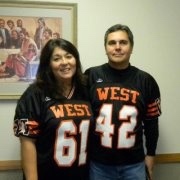 Sheri & Kevin Cornelius
Sheri & Kevin Cornelius
[NOTE: According to WDFI.org, RED FERN, LLC was Organized on 03/27/15 and was recently Administratively DISSOLVED on 03/17/18, its address listed as 6921 N. Barnett Lane, Milwaukee, WI, and its final ‘Registered Agent’ listed as Fmr. Asst. Sec. for Indian Affairs / Fmr. Oneida Nation WI Chief Counsel / Oneida Seven Generations Corp. (OSGC) ‘Independent Tribal Vendor’ Attorney / GODFREY & KAHN S.C. Shareholder – CARL J. ARTMAN – owner of ARTMAN LAW, LLC, and currently ‘teaching’ at Arizona State University Sandra Day O’Connor College of Law, and whose ‘legal’ representations involving various ONWI & OSGC business ventures have resulted in OVER $100 MILLION in LOSSES.
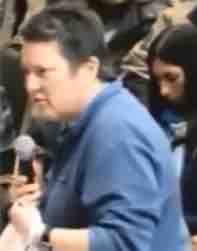 CARL ARTMAN is also Former ONEIDA NATION WI CHIEF COUNSEL, and he is the first cousin of Wisconsin Bar-licensed attorney and current ONWI CHIEF COUNSEL JO ANNE HOUSE]
CARL ARTMAN is also Former ONEIDA NATION WI CHIEF COUNSEL, and he is the first cousin of Wisconsin Bar-licensed attorney and current ONWI CHIEF COUNSEL JO ANNE HOUSE]
Cameron Cooper: And so one of the things I’m easily started looking at was well, if I can put municipal solid waste through, what it’s getting out on the back end is a synthetic gas, and that synthetic gas appears to be, you know, pretty reliable and comparable to natural gas. And I was like, “Well heck, if I can do that then I can run generators and I can run electricity.” So, you know, bright-eyed and bushy-tailed, that’s the way I started looking at this project. Well, as I started kind of researching it more I run into Kevin Cornelius, who you’ll hear from here in a little bit, and they were looking at this stuff in the Oneida region in Wisconsin. And so as was talking to him, you know, he kind of even broadened my horizons even more that, “Cameron, I mean plastics is the way to go.” You know, plastics is oil, as it’s created from oil anyway, so if we can break it back down to it’s baser form or what it just was created from then we can recapture that and sell the byproduct.
And so what you find is even with this municipal solid waste, where there’s plastics, and the real kicker, tires; all three of those put together, you can create biofuels from all three, and each one of them have some other byproducts that are valuable to several different markets.
One of the things we’ve really found this past go-around is that tires have valuable byproducts. And so when we got to this point for us—and I feel like I need to explain this for everybody in the room is, you know, we came up with a goal within our strategic energy plan and we moved forward with that goal, and that goal was to see what was out there, not only to help offset tribal costs, but to offset, you know, or to create money and generate revenue, ’cause that’s how I look at stuff, there’s always a way to potentially help your tribe out in several different classes.
And so one of the things we noticed right off the bat when he started talking to me about plastics, and even tires and municipal solid waste, immediately I started saying, “Well, we have it.” All right? So in Western North Carolina, as I talked about it being mountainous, the western-most counties, so west of Asheville, North Carolina—if you’re a Google person and like to get on Google Maps, look up Asheville, North Carolina, and to the west of Asheville pretty much every county past Buncombe County, which is where Asheville sits, is they’re hauling their trash. So they’re transferring it. They have transfer stations and they’re hauling it to – Georgia is pretty much the biggest spot that they’re tipping their municipal solid waste, and that’s everything from plastics to tires to just regular municipal solid waste. And so there’s tipping fees involved in that, there is hauling fees involved in that, and, you know, for us as a tribe it’s pretty much about, you know, a $300,000.00 haul bill a year. And so, you know, immediately I was like, “Well, if we can offset that and create electricity off of that, or even create oil products or even other potential byproducts, that would be great.”
And so as we started coming up with this idea in our head, well, we’ve got to figure out a way to vet this, because there is nobody – and I challenge each and every one of you on this call to get on Google and look up waste energy projects. You’re going to see a million different leads and what you’re going to find out is nobody is doing this the correct way or the right way in any facet. Everybody’s idea is kind of the same, but it’s all different, and everybody holds everything close to the chest. And the reason why is because the technology is not patent-able. The reason why is because it is so basic. I mean in reality I like to joke with people and I say—when I show you, and you’ll see a picture of it in the next slide or two, I like to equate it to, you know, we’re here in the mountains, so we tend to love our moonshine here in Western North Carolina. And one of the things about that is that this to me is a glorified still, a glorified moonshine still is what I like to call it.
And so when you look at it from that perspective, everybody holds everything close to their chest. So we had to go out there and figure out a way that we could vet this to our people. Not only that, but to see if it looks true and if it holds a value there. And so what we did is we worked with the Department of Energy and Mineral Development, Michael Stephenson there, you know, he really helped us get our feet underneath us as we went through a waste characterization study to look at our waste and to see how much plastics was in there, ’cause that was kind of the focused when we started, was to look and see how much plastic stream we had coming through our transfer station.
And then with the second grant we went out there to demo version to get the demo version here so that everybody could kind of kick the tires, so to speak, and see that it wasn’t detrimental to the environment. And that’s the cool thing about this process, at no point does feedstock every come in contact with an open flame. Everything is degraded over an amount of time, and so you have what they call a retort time, where your byproduct is sitting there breaking down and then basically you condense that gas into usable items.
And so with the third grant we just prolonged the demonstration project to really start looking at feedstocks and then what we’re getting out of that third grant was an actual business model or a business plan. And I think you can go to the next slide there, James.
And so to reiterate this, this is the thermal conversion unit. And as you can see, you see where it says “feedstock hopper.” This is a dual _____ system; you want this thing completely oxygen-deprived as much as possible. You do not want oxygen in this. And so they go as far as proving to your constituency or even paper that you’re trying to sell this to, that there is no open flame to feedstock. Where you see the upper and lower retort auger chambers, those are internal. So the feedstock goes into that, and that big blue bin basically is the chamber. And underneath that is a low-burning natural gas or propane burner.
But here’s the neat thing, it’s a self-sustaining system. So once the system is up and running and you’re running it 24/7 you can basically produce enough gas that it runs itself to heat that chamber. But on top of that, through the pyrolysis process the feedstock, as it breaks down, creates its own heat. And so it’s actually heating up as it’s breaking down as well. And so then you have the discharge valves, where it comes out, and then after that point, like I said, it goes through what I consider a glorified distiller, so you can siphon off whatever gases or byproducts that may be available.
The one thing that we found with our tire study is that there is a lot of carbon, and that carbon we have found at this point appears to be carbon black. Now it might not be the most purified form of carbon black, but it’s pretty close. And so with that being said, what that gives us is another byproduct that is pretty valuable out there on the market. And I’d say it can go anywhere from, what is it, $0.49 a pound now?
Kevin Cornelius: _____ to $1.96 a pound.
Cameron Cooper: Yeah, up to $1.96 a pound. And if it’s pure, if we can figure out a process to create pure carbon black, I mean you’re talking, what is it 500—yeah, go ahead. I’ll let Kevin kind of talk about the carbon black.
Kevin Cornelius: So just a little bit with the tires, when we went through the process, we’re trying to get the best carbon black. And that’s something when we started, the system is not designed to handle tires, and so we had to make some modifications for it to run without jamming up with the carbon black in it. And we’ve been able to do that. We get – on our test results we’re about 92-percent pure carbon black. For it to have the high value we’ve got to be at 99-percent. And some of it has some graphene in it, but it’s not a pure graphene. So if we’re looking at how we can refine the carbon black, the value of that can increase to quite a bit if we can get the higher-value carbon black. But the problem is getting from that 92-percent to the 90-percent, and we’ve done that through – or we’re working on that through different temperatures and different residence time of the tires. But it does work well.
So what we’ve done is we’ve really taken a system and made changes to it so that it can run tires through effectively. The system itself is only designed to run 100 pounds per hour, and we’re running at 75 pounds per hour. So even though the tires with the carbon black is difficult, we’re still almost running it as efficient as you can run the machine if you were just running what it was intended to do.
So with that I think what we’re looking at is working with the tribe to say how can we go forward with – the tribe owns the intellectual property because we’ve been doing all this testing and modifications on their behalf, and so now we want to look at how can we combine and take this to the next step.
Cameron Cooper: The reason why I kind of want to get it detailed a little bit more so on the project itself is so that I can show people kind of where we’re at as far as moving forward with the structure, because this has a lot of moving parts, as we’ve kind of found out over the past couple years in looking at this project. And as I said before, earlier, there’s nobody to turn to, there’s nobody I can go out here and say, “Build me one and get it up and running tomorrow.” We’re having to do this. And nobody wants to do that. There’s no tribe out here that I’ve ever seen to have an appetite that won’t just be the first on the block to do anything. We’re kind of a monkey-see monkey-do so to speak for lack of a better phrase. And so in reality, you know, we’ve kind of had to figure out a lot of this stuff as we’ve went along.
But as you can see in this picture, the one thing I want you to notice too which makes this business venture even more kind of—another moving part, is the fact that I hope that you can see the scale there, and underneath, where that says “dual discharge valve,” that’s a wheelbarrow. Now the most efficient part of this system would be that you would want a one-ton unit. This one that’s in this picture is pretty much the one that we have here, which is a 100-pound unit. A one-ton unit you’re probably looking at I’d say around about 15-percent larger than what we’re looking at in this picture right now, which means it’s very mobile.
And so that’s one of the other things that we’re looking at too, is how do we make this mobile and potentially go out here to Indian Country or anybody else that may need or have a landfill that’s overfilled, ’cause we can put already-processed landfill waste back through this system. Or plastics that are sitting out here or, you know, case-in-point, one of the examples I think that we would want to go after eventually is the fact that China has recently said that they no longer want our recyclable plastics. And so you’re going to have an influx of plastics sitting somewhere and this machine is definitely a machine that can take that load and produce something from it. And so that’s kind of where we’re at. So next slide, James.
Which brings us to _____ just kind of explained to at this point is, you know, LLC/Section 17. Well, we’ve looked at both, and it took us an education period of about five years for our tribe to get to the point where our constituency understood what Section 17 and LLC means. Let’s see, hold on just a second. I was bringing up something I needed to look at real quick so I can explain this next part.
So anyway, what we’re looking at is kind of from an LLC standpoint, because we kind of feel like we’re behind the ball; we’ve got some extenuating circumstances here in Western North Carolina, as our only pretty much income for the Tribe itself and its operation is its casino operation. We enjoy a 200-mile radius of no competition in Western North Carolina. We’re within 75-percent of the entire USA population within a day’s drive. So needless to say, we kind of like we say we’re sitting in the catbird seat in Western North Carolina with our casino, which is great. But there’s impending doom on the horizon for the Tribe as we’re looking—as Georgia is looking to potentially get some formed of organized gaming. And so on the horizon we have tried to prove to our constituency that we do need to diversify our economy and one of those ways is Section 17.
Well, we did a summit of Section 17, which basically said, you know, “Hey, Tribe, you can set this up how you want. It comes down to you setting up and you can put in it what you want to.” And then you have other tribes out there at _____ Summit that say, “We have a Section 17 but we’ve shelved it. We’re primarily using an LLC structure.” And so as a tribe right now we’re kind of in that crunch point where we don’t have really time to sit down for a Section 17, though I do believe that we will exercise that later down the road because I think it is something that we can shelf and have for future purposes.
So right now we have set up an LLC code as of this year. Earlier this year we set it up, so as of next month and our next council session we are going to be hopefully putting a board together to, you know, come force with LLC plan for the LLC and obviously to request money for that LLC. And so as we move forward in this project we’ve gotten to a point where like we know at this point we’re just going to have to pretty much jump off the deep end with this technology and invest in it.
And that’s one reason, even though, you know, I know some of you probably think it would be a lead and they’d potentially be able to help us from a granting perspective, and that is true, I think this is definitely something up that road, but I just don’t think that we’re ready yet. And so what we’ve got to have is we’ve got to have a buy-in from an LLC standpoint of the tribe’s going to have to set up an initiative for this because of so many moving parts and the upswing of it potentially having, you know, from the different byproducts that we can produce off of this machine. So it needs to be more of a business decision as opposed to a government entity or a government decision.
And so I put LLC code there because obviously I just said that we’ve created one, and so that’s definitely an option that we’re looking at, and that may be the best option for us as far as just this project is concerned. However, that’s where the other moving part comes in and where a joint venture for us may make sense underneath the LLC parent company and spinning off a subsidiary LLC, which would be a joint venture with Red Fern. And the reason why we’d have to do that is even though the tribe owns the studies from DEMD and the reports and everything that goes along with that, Red Fern pretty much has the technology in hand, and so they’re the experts in the field for us. And so there’s probably most likely going to have to be some form of a joint venture or there’s going to have to be an outright buying out of Red Fern for the technology purposes.
The reason why I put Boys Club there, Boys Club is our – it was a service set way back in like I think the ’50s is whenever it was started, and it was actually done through the state. And it kind of laid in the weeds and nobody really thought about it as we started talking about Section 17 five years ago, and now all of a sudden it’s come to the forefront. Well that charter was actually set up through the state. It’s its own corporate charter, even though it’s a 501(c)3. And what they do is they provide bus service for our local school. They also provide mechanic work for our local area and they also have charter bus service as well, and they provide most of the fuel for the tribal vehicle fleet.
And so they have a lot of the technology that this wasted energy could utilize or even help kind of put out there. So we’ve put Boys Club in the mix because their current board, which is not necessarily a business-oriented board as much as it is a community board, though it is a legitimate board, because of the 501(c)3 they’re kind of looking at that we could potentially change the structure so the Boys Club can be less of a breakeven 501(c)3. We could keep that arm of it, but we need to create an LLC part of it so that we can go after. So that’s potentially another factor for us to exercise and look at to see if it’s the way we want to take this venture. And so it’s definitely an option.
But I think what this whole time what I’m trying to get across is that with the project that we have there are so many different moving parts as far as the byproducts that are available is that we’re going to have to look at a mix of a joint venture. We’re also going to have to look at a mix of whether we do it with our tribal LLC or whether the Boys Club actually creates their own LLC and they kind of have that infrastructure that would be needed for this venture and there would be less buy-in from the LLC. So it’s one of those things, it’s kind of like a flip of the coin, but we’re really not just flipping the coin; we’ve really got to see which one is going to make more sense. And that’s where we are in our stage. And so it took a lot of planning to get to this point, but in reality we’re kind of at that precipice, we’ve got to make that next step, and so what we’re really trying to do is create a model that makes sense, that can be explained to our public but also can be explained to either our LLC board, which is pending, or the Boys Club pending board.
And so at that point I’ve pretty much said all I need to say. I’ll let Kevin kind of take over from here to kind of fill in any gaps that I’ve left.
Kevin Cornelius: So part of the reason why we would look at a joint venture is, as I mentioned before, our system wasn’t really designed to take tires, and working with the Tribe, we’ve modified it so we’ll take tires. The Tribe collects 50 to 60 tons of tires and with the Tribe’s help we’ve created a front-end system that will do a proper feed and when we distill the oil, as it comes out at the back end, you know, we’re getting the naphtha, the kerosene, the gasoline, the diesel, and what that dose is tires are made with sulfur so that they don’t catch fire. Because naphtha is one of our byproducts, we’re able to separate and really get a clean sulfur. And that’s got value; it’s not a lot, but still, it’s got value.
So the point for us to work with the Tribe is our system can take 50 to 60 tons of tires per year, they have 50 to 60 tons of tires per year and they have a site where we can do it without having to go through a lot of hurdles. So it makes it beneficial for us because they have the site, they have the tires. We as a corporation can go through the state and get certified as a tire collection facility and therefore get reimbursed for the tires they collect, along with the selling of the byproducts. So it makes those benefits to us along with the Tribe.
Cameron Cooper: And one of the things I forgot to mention is, and if you’ve kind of seen the vision here, if I’ve explained it well enough, is the ability to build capacity with this project. We’re just solely talking about our waste stream on the Eastern Band of Cherokee Indians. So the 300,000 haul bill I was talking about earlier, that includes all the potential municipal solid waste we get now, that includes the tires we get now as well. And so in reality this is not including going out to the other surrounding counties and asking them to bring their waste to us to cut down on their haul bill, but on top of that, going ahead and collecting the tipping fees that they’re currently paying. And we could charge them probably the same tipping fees that they’re paying the Georgia landfill now and, you know, _____ _____, but it would still be cheaper for them because they’re having to haul it less—or they’re having to haul it less of a distance.
And so, you know, that’s just kind of where we’re at in our business structure moving forward and what our options are. So, you know, as far as a case study I would like to say that we’re in the infancy of looking at moving forward with a structure; however, our tribe is technically in infancy looking at that type of LLC. Though our casino has its own separate board and entity, you know, we’ve never expanded into looking at what seems to be the trend right now in Indian country, which is a diversification move. And so that’s kind of where we’re at. …
James Jensen: … A question for the Eastern Band Cherokee project, how soon are you ready to commercialize?
Cameron Cooper: I think initially as soon as we get the LLC or whatever structure we’re going to go within place. I’d say we’re within a year of making sure that the market—that we vet the market out there who would buy the byproducts, to make sure that we have a quality product to sell and make sure that we have vendors out here in our area that are willing to buy those products. I think once we have that year underneath our belt, I’d say that within two years after that they should be—we would move from a 100-pound unit up to one-ton units. And I think the overall initial business plan would be that we would own three one-ton units. This would just be for our area, for our purposes at this point, before we’d make it mobile or anything of that nature. And we would own three one-ton units: one devoted to tires, one devoted to plastics, and one devoted to municipal solid waste, and each one would have their own form of byproducts.
So I think commercialization is just right around the corner, as soon as we have a structure and we can get an LLC or the Boys Club to buy into that structure.
James Jensen: Great. A few more questions on the details of the project. And if you don’t want to make it public that’s certainly understandable. But how much did it cost to build the system and how much electricity is it producing?
Cameron Cooper: I’ll let Kevin answer that one.
Kevin Cornelius: Yeah. We don’t really want to talk about how much it cost us. For a 100-pound unit, tires, we can produce right around 54 to 55 kw of energy. The system uses 12 kw. And if we added a second unit of that size then—it’s about 54 kw off of 100 pounds of tires.
04/17/18 : USA TODAY / Green Bay Press-Gazette
Judge William Griesbach: Green Box owner Ron Van Den Heuvel must disclose fraud conviction to potential investors
[U.S. Judge William] Griesbach said his intent in imposing the conditions was to protect the public and ensure anyone who chooses to give Van Den Heuvel money knows with whom they’re dealing.
“With a mandatory disclosure, then at least people who want to deal with Mr. Van Den Heuvel can do so with eyes wide open,” Griesbach said. “The goal is to ensure there are no more victims. …”
Griesbach’s conditions were imposed as part of the wire fraud and money laundering case, which is scheduled to go to trial on [November 13, 2018].
- April 17, 2018 Motion Hearing Minutes re: Government’s Motion to Amend Conditions of Release of Ron Van Den Heuvel, U.S. District Court, Eastern District of Wisconsin, Case No. 16-CR-64 and 17-CR-160, United States of America v. Ronald H. Van Den Heuvel
- April 17, 2018 Order Setting Conditions of Release of Ron Van Den Heuvel, U.S. District Court, Eastern District of Wisconsin, Case No. 16-CR-64 and 17-CR-160, United States of America v. Ronald H. Van Den Heuvel
Defendant shall seek approval by U.S. Probation for any transactions involving $500.00 or more, either personally or on behalf of his business entities.
Defendant must provide full disclosure to any party he is attempting or soliciting to conduct business with:
a) that he has been convicted of bank fraud and sentenced to a term of 3 years imprisonment.
b) that he is facing an additional 14 counts for wire fraud and money laundering.
c) that he has court appointed counsel in these matters and has been determined to be indigent.Defendant must submit monthly financial reports to Pretrial Services to include:
a) any amount and source of monthly income received.
b) current assets and any disposal of assets which are in his name, or over which he has control or is able to convey.
c) provide copies of account statements from any bank or financial institution held in his name or over which he has control.
04/12/18 : USA TODAY / Green Bay Press-Gazette
Feds: Ron Van Den Heuvel continues fraudulent pitches; concerned Ron Van Den Heuvel could continue to defraud investors even after conviction

Federal authorities are concerned that Ron Van Den Heuvel’s conviction for bank fraud and another 14 additional counts of fraud have not deterred him from continuing to solicit investments under false pretenses.
U.S. Attorney Matthew Krueger has asked U.S. Judge William Griesbach to impose a new restriction on Van Den Heuvel’s conditions of release: A $500 cap on any financial transaction unless the U.S. Probation Office pre-approves it. Griesbach will decide whether to impose the condition during a hearing next week.
The request was made in the government’s second fraud case against Van Den Heuvel, filed in September 2017. Federal prosecutors allege he defrauded investors in companies connected to Green Box N.A. out of $9 million between 2011 and 2015.
In his motion, Krueger said the government continues to investigate several transactions and pitches to investors that started in summer 2016 and continued through March when Van Den Heuvel told his probation officer he intended to conduct “several complicated and sizable financial transactions in the near future.”
Van Den Heuvel has already been convicted of bank fraud in a case filed in April 2016. He was found guilty of using straw borrowers to obtain loans under false pretenses to keep his businesses afloat. He was sentenced in January to three years in prison but is awaiting notice from the U.S. Department of Corrections on when he will begin his prison term. …
One person [Ron] encouraged to invest in his companies was sent documents that included a resume with false statements and letter on Van Den Heuvel’s attorney [Ty Willihnganz’s] letterhead with the attorney’s last name misspelled. …
![]()
![]()
![]()
04/03/2018:
- April 3, 2018 USA’s Motion to Amend Defendant Ronald Van Den Heuvel’s Conditions of Release w/ Exhibits [129 pages] U.S. District Court, Eastern District of Wisconsin, Case No. 17-CR-160, United States of America v. Ronald H. Van Den Heuvel
I. BACKGROUND
Defendant Ronald Van Den Heuvel has been under court supervision since April of 2016, when he was first indicted in case number 2016-CR-64. Van Den Heuvel has now been sentenced in that case for conspiracy to commit bank fraud, and he is under a court order to pay $316,445.47 in restitution to the victim (2016-CR-64, Dkt. 184). Van Den Heuvel was also sentenced to a term of 36 months’ imprisonment, but he has not yet been remanded to the custody of the Bureau of Prisons.
Van Den Heuvel was indicted a second time in September of 2017 in this case (2017- CR-160), in which he faces charges of wire fraud and money laundering. The Court imposed the same conditions of release and supervision in this case as in the first one, which include a requirement that Van Den Heuvel refrain from violating any federal, state, or local laws (2017- CR-160, Dkt. 5).
In recent months, the Government has learned about multiple questionable financial transactions initiated by Van Den Heuvel since he has been under court supervision. The Government has not completed its investigation of these transactions. Given their frequency, size, and indicia of fraud, however, the Government seeks to update the Court about these transactions and to modify Van Den Heuvel’s conditions of release to prevent this conduct going forward. In the Government’s view, a modification of Van Den Heuvel’s conditions of release is necessary to protect the public as well as Van Den Heuvel’s previously identified victims, who are statutorily entitled to restitution.
The information that follows is based upon interviews with witnesses, a review of documents provided by those witnesses, and information received from the U.S. Probation Office. The Government has consulted with the U.S. Probation Office and that Office has agreed that, given the complexity of Van Den Heuvel’s transactions, the Government should present this material directly to the Court.
II. Transactions/Attempted Transactions Involving John Lozo
Beginning in the summer of 2016, and continuing into early 2018, Van Den Heuvel negotiated with a man named John Lozo in an effort to solicit funds for various projects or equipment. Van Den Heuvel sent Lozo a plethora of information during those negotiations, some of which was false or highly misleading. For example, on June 7, 2017, Van Den Heuvel sent Lozo and others an “Executive Summary” of the “Great Lakes Tissue” project in Cheboygan, Michigan, which promised “world changing technologies that process food contaminated waste streams to create” various products. (Exhibit A) The “Executive Summary” included financials, which represented, in part, that $7.7 million in “EB5 Funds were paid” for equipment for the project. Van Den Heuvel’s solicitation of EB-5 funds and subsequent misuse of those funds are part of the wire-fraud scheme alleged in case number 2017-CR-160. The Government’s tracing of the EB-5 funds indicates that Van Den Heuvel received substantially less than $7.7 million, and that the funds were mostly not used for equipment for the Cheboygan, Michigan project. The owner of Great Lakes Tissue in Cheboygan, Michigan, has informed law enforcement that neither he nor Great Lakes Tissue has received funds from Van Den Heuvel.
As another example, on September 11, 2017, Van Den Heuvel sent Lozo an email with several attachments, including (a) a letter, purporting to be on attorney Ty Willihnganz’s letterhead, but with Willihnganz’s name misspelled; (b) a “consulting agreement” dated March 16, 2017, purporting to promise Van Den Heuvel $47,000 per month for five years; and (c) a resume for Van Den Heuvel containing several false statements, such as that “Green Box has partnered with Cargill Inc.” (all parts of Exhibit B) As alleged in the 2017 indictment, Cargill had long ago terminated its agreement with Green Box, although Van Den Heuvel falsely claimed otherwise in soliciting funds for his companies.
Van Den Heuvel’s communications with Lozo included efforts in late 2017 to sell, or obtain an investment in, pyrolysis machines manufactured by Kool Manufacturing. Lozo served as a broker in that potential transaction, and helped to arrange a “demonstration” of a pyrolysis machine for potential investors/buyers, run by Van Den Heuvel, in November of 2017. (Incidentally, Van Den Heuvel attempted to charge $5,000 for that November 2017 demonstration.) The Kool pyrolysis machines are also part of the wire-fraud scheme charged in case number 2017-CR-160; as noted in that indictment, Van Den Heuvel fraudulently obtained funds from victim Cliffton Equities, as well as other entities, to purchase those machines. When Van Den Heuvel’s company Green Box NA Green Bay filed for bankruptcy in 2016, the Kool machines were also listed as assets of the estate, which meant that they were subject to the bankruptcy court’s supervision until the bankruptcy case was ultimately terminated on December 29, 2017. As a result, court permission would have been required for Van Den Heuvel to sell the Kool units or pledge them to new investors; no such permission was obtained. In materials that Van Den Heuvel sent to Lozo, he often changed the spelling of the machines, calling them “Cool Units” rather than “Kool Units,” perhaps in an effort to suggest these were different machines. For example, Power Point presentations that Van Den Heuvel sent to Lozo on September 11, 2017 contain this new spelling. (E.g., Exhibit C) Lozo has confirmed, however, that the pyrolysis machines in question were manufactured by “Kool.”
The Government is not aware whether Van Den Heuvel successfully obtained any funds through his work with Lozo. It is clear, however, that Van Den Heuvel has continued to make materially false statements in an effort to obtain “loans” or “investments,” including statements that are closely related to his charged misconduct.
III. Transactions/Attempted Transactions Involving Knapp, Kashat, and Kalet
Aside from his work with Lozo, Van Den Heuvel has been soliciting funds (in the form of “loans” or “investments”) from several other people. Two individuals named Mason Kashat and Alex Knapp, both of New York, have loaned substantial sums to Van Den Heuvel in the past several months. According to Kashat and Knapp, they jointly loaned Van Den Heuvel approximately $60,000, receiving in exchange an equity stake in a company called Purely Cotton, a lien against the proceeds of one of Van Den Heuvel’s lawsuits (against Sharad Tak), and a “personal guarantee” from Van Den Heuvel. According to Knapp, he also made two smaller loans to Van Den Heuvel, for approximately $7,500 (to “Tissue Technology Inc. and Purely Cotton Products Corp.”) and $20,000 (to “PCDI MI”), between July and December of 2017. Those two smaller loans are already in default. Van Den Heuvel pledged Purely Cotton assets as collateral for Knapp’s loans, in addition to a long list of other equipment. That equipment consisted primarily of “after dryers,” which, according to a knowledgeable witness, Van Den Heuvel does not currently own or control. Knapp also received an equity stake in Purely Cotton, a lien against proceeds from a Tak lawsuit, and a “personal guarantee” from Van Den Heuvel.
Van Den Heuvel and Kashat also worked with a man named Mike Kalet, a broker in New York, to obtain additional funding for projects proposed by Van Den Heuvel. In connection with these projects, Knapp, Kashat, and Kalet all received written materials from Van Den Heuvel. For example, Kalet received a document entitled “Great Lakes Tissue Executive Summary 12 1 17,” which seeks to justify a $7.5M loan for “PCDI Michigan” to support the “Great Lakes Tissue Company.” (Exhibit D) That “Executive Summary” appears to be an updated version of the “Executive Summary” that Van Den Heuvel sent Lozo in June of 2017. (Exhibit A) The December 2017 version contains questionable representations, including that Kelly Van Den Heuvel (the defendant’s wife) is the President of Tissue Technology, LLC and of PCDI Michigan, and that she has a net worth of $29 million. Kalet also received a document entitled “Great Lakes Tissue Ron Van Den Heuvel Resume,” dated June 6, 2017. (Exhibit E) That “resume” appears to be an updated version of the “resume” that Van Den Heuvel sent to Lozo in September of 2017. (part of Exhibit B) While the resume sent to Lozo falsely represented that Green Box was “partnered with Cargill Inc.,” the resume sent to Kalet claimed that “Tissue Technology has partnered with Cargill Inc.” (emphasis added) and that Van Den Heuvel’s companies hold “Exclusive Intellectual Property Rights” in Cargill’s “Enhanced Fibre Additive (EFA) Patent and System Design, Equipment and Software.” In fact, Cargill terminated its EFA license agreement with Green Box in October 2013, and has not, to the Government’s knowledge, renewed that license agreement with Tissue Technology or any other company affiliated with Van Den Heuvel. Finally, Van Den Heuvel also informed Kalet that he had already prevailed in at least one lawsuit against Sharad Tak and was simply waiting for a determination of damages. At least with respect to the federal case involving Van Den Heuvel and Tak, that is untrue; to the contrary, Tak has prevailed in that matter.
Again, the Government is not aware whether Van Den Heuvel successfully obtained any funds through his work with Kalet. These misrepresentations, however, are similar to those alleged in the 2017 indictment against Van Den Heuvel. Relying on Van Den Heuvel’s representations, Kalet, in turn, sent misleading materials to other potential investors.
IV. New Transactions Proposed to Probation
On March 23, 2018, Van Den Heuvel met with U.S. Probation Officer Mitchell Farra to inform Farra about Van Den Heuvel’s intent to conduct several complicated and sizeable financial transactions in the near future. Van Den Heuvel provided Farra with an organizational chart summarizing the companies involved in these transactions. (Exhibit F) Given Van Den Heuvel’s pattern of conduct in the past year, and the nature of the newly proposed transactions, the Government has serious concerns about the legitimacy of these transactions. The proposed transactions are listed below, as well as some of the related inconsistencies that explain the Government’s concern:
- Proposed Transaction: In April 2018, Van Den Heuvel plans to sell 5% of his stock in Tissue Technology to a man named “Ray McDonial,” who owns a hedge fund in Dallas, Texas. As part of this deal, Van Den Heuvel will receive $1M on the closing date and then $1M per year for the following 4 years for a total of $5M.
- In preparing the pre-sentence report for Case Number 2016-CR-64, Van Den Heuvel represented that he owns 83 million shares of Tissue Technology, contained in KR Trustco, a trust controlled by other individuals. Van Den Heuvel also stated that the trust and its holdings are subject to ongoing litigation. Van Den Heuvel represented that the Tissue Technology stock is not publicly traded and has no currently ascertainable value. Given those facts, the legitimacy of a $5M sale of Tissue Technology stock is questionable.
- In addition, according to “Executive Summary” sent to Kalet, Kelly Van Den Heuvel is the “president” of Tissue Technology and potentially owns 74% of the company. (Exhibit D) Kelly’s role in this transaction is unclear.
- Proposed Transaction: In the second week of May 2018, Van Den Heuvel will sell $1M in stock in Purely Cotton to Great Lakes Tissue. This transaction will result in Van Den Heuvel receiving $2M in royalties on patents he owns.
- Van Den Heuvel has repeatedly misrepresented information about “patents” he “owns” to potential investors, including EB-5 investors.
- Ownership and control of these entities is unclear:
- According to the organizational chart provided by Van Den Heuvel (Exhibit F), Great Lakes Tissue and Purely Cotton already have the same owner; both are subsidiaries of Tissue Technology. As a result, it is unclear what this sale entails or how it would generate royalties for Van Den Heuvel.
- According to the “Executive Summaries” sent to both Lozo and Kalet, by contrast, PCDI owns or will own Great Lakes Tissue. (Exhibits A, D) The “Executive Summary” sent to Kalet also represents that Kelly Van Den Heuvel is the president of PCDI.
- The company called “Great Lakes Tissue” in Cheboygan, Michigan is owned by Clarence Roznowski, not by Van Den Heuvel or one of his companies. Roznowski has no plans to buy any stock in Purely Cotton and is, in fact, unsure whether Purely Cotton has any assets.
- In addition, Van Den Heuvel pledged Purely Cotton equity to Kashat and Knapp as collateral for their (unpaid) loans. It is not clear how this equity stake differs from the $1M in Purely Cotton stock that Van Den Heuvel now proposes to sell.
- Proposed Transaction: In June, Van Den Heuvel will sell 5% of his ownership in Partners Concepts Development, Inc. (PCDI) to a man named Kaoumi in Ghana. Van Den Heuvel estimates this will be a $6M sale.
- In preparing the pre-sentence report for Case Number 2016-CR-64, Van Den Heuvel represented that he owns 65 million shares of PCDI, contained in KR Trustco [LLC], a trust controlled by other individuals. Van Den Heuvel also stated that the trust and its holdings are subject to ongoing litigation. Van Den Heuvel represented that the PCDI stock is not publicly traded and has no currently ascertainable value. Given those facts, the legitimacy of a $6M sale of PCDI stock is questionable.
- The “Executive Summary” sent to Kalet claimed that Kelly Van Den Heuvel is the President of PCDI. (Exhibit D) Her role in this transaction is unclear.
- Proposed Transaction: Van Den Heuvel has, or will be entering into, ten-year consulting agreements with Great Lakes Tissue Company and True Sustainability to receive $38,000 per month in salary.
- In preparing the pre-sentence report for Case Number 2016-CR-64, Van Den Heuvel represented that his monthly income consisted entirely of $4,099 in social security income.
- According to the organizational chart provided to Probation, both True Sustainability [Trustco LLC] and Great Lakes Tissue are subsidiaries of Tissue Technology, Inc. (Exhibit F) Van Den Heuvel represented in the pre-sentence report that he owns 83 million shares of Tissue Technology; according to “Executive Summary” sent to Kalet, Kelly Van Den Huevel is the “president” of Tissue Technology and potentially owns 74% of the company. (Exhibit D) And another of Van Den Heuvel’s proposed transactions entails selling 5% of Tissue Technology stock to a man named Ray McDonial.
- The company called “Great Lakes Tissue” in Cheboygan, Michigan is owned by Clarence Roznowski, who has informed law enforcement that he has no intention of hiring Van Den Heuvel as a consultant or paying him $38,000/month.
- It is thus unclear who controls these companies or has agreed to pay Van Den Heuvel a total of $4.56M to “consult” for them.
- Proposed Transaction: Van Den Heuvel has a royalty agreement with PC Fibre Box in which he will receive $48,000 per month in royalties on his intellectual property.
- In preparing the pre-sentence report for Case Number 2016-CR-64, Van Den Heuvel represented that his monthly income consisted entirely of $4,099 in social security income.
- Van Den Heuvel has repeatedly misrepresented information about “patents” he “owns” to potential investors.
- According to the organizational chart provided by Van Den Heuvel (Exhibit F), PC Fibre is a subsidiary of EARTH / RTS / The Green Box Companies. Edward Kolasinski, a current executive of RTS, has indicated that a royalty agreement with PC Fibre does exist, but that PC Fibre is currently generating no profits and none are projected in the near future.
- Proposed Proposed Transaction: Van Den Heuvel plans to withdraw $1M from a company called Patriot Services Inc., which will earn a $1M profit this year.
- The Government has only very limited information about this company. In preparing the pre-sentence report for Case Number 2016-CR-64, Van Den Heuvel did not disclose any income, potential income, or ownership interest in a company called Patriot Services.
As outlined above, each of the proposed transactions has indicia of illegitimacy. Van Den Heuvel’s representations about these businesses and transactions appear to differ depending on his audience. The Government is concerned that should these “transactions” go forward, Van Den Heuvel will defraud new victims and/or risk depriving pre-existing victims of restitution, including the $316,445.47 he has already been ordered to pay.
IV. CONCLUSION
For the aforementioned reasons, the Government proposes that Van Den Heuvel’s conditions of release be modified to include a prohibition on [Ron] Van Den Heuvel engaging in any financial transactions with a dollar value over $500 without obtaining pre-approval from the United States Probation Office, and a requirement that Van Den Heuvel provide access to all financial information requested by the United States Probation Office.
Dated at Milwaukee, Wisconsin, this 3rd day of April, 2018.
Respectfully submitted,
MATTHEW D. KRUEGER
United States Attorney
By: s/Rebecca Taibleson
Images from court Exhibits of Ron Van Den Heuvel’s various fraudulent ‘green energy’ / ‘recycling’ / ‘waste-to-electricity’ / ‘pyrolysis’ presentations for the bogus
GREAT LAKES
TISSUE PROJECT
at
437 SOUTH MAIN STREET
CHEBOYGAN, MI 49721:
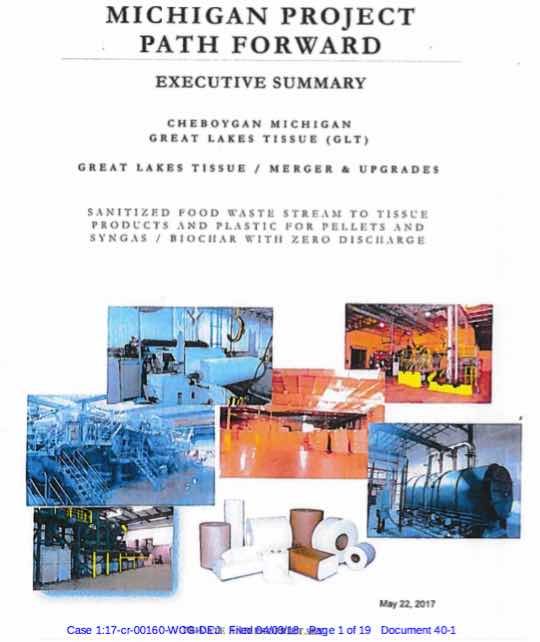
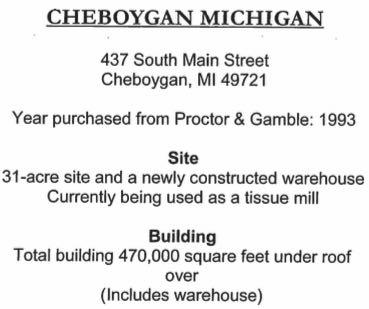
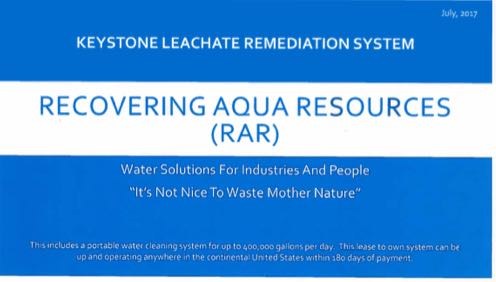
Filtration unit patented by Generation Clean Fuels, LLC owner
and Ron’s Recovering Aqua Resources partner Gaylen LaCrosse :
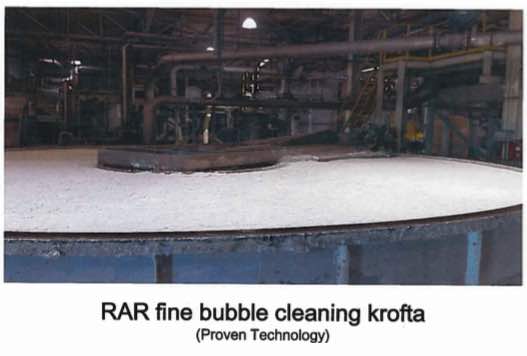
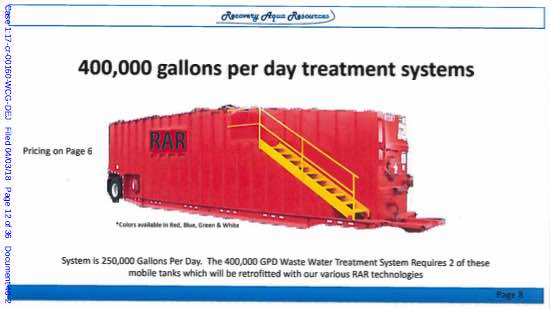
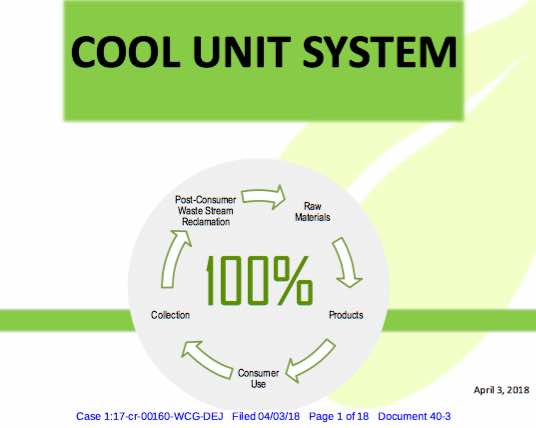
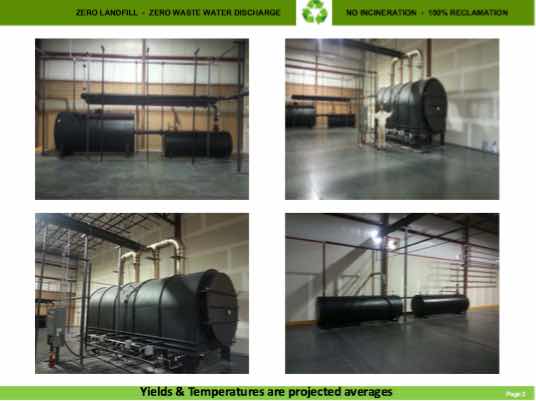
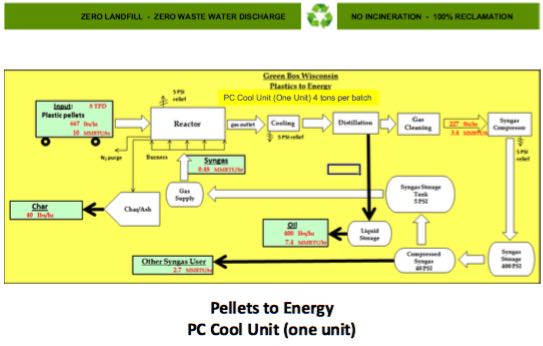
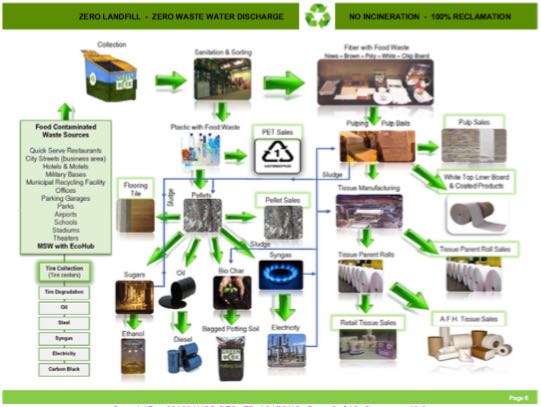
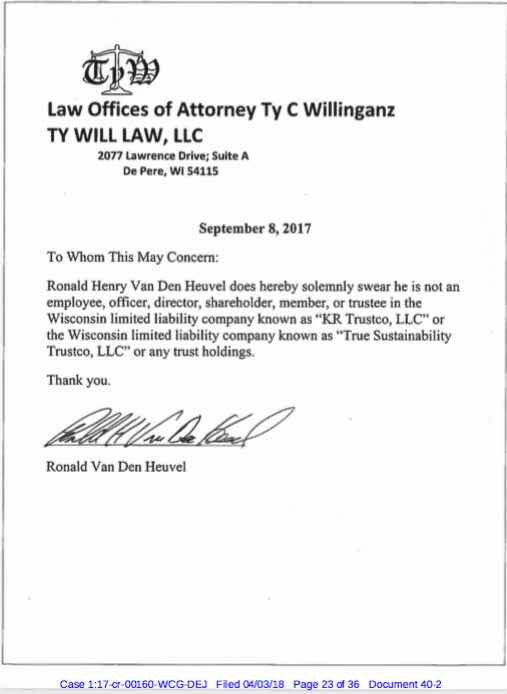
FLASHBACK:
Master Lease Agreement
between Arland Energy Systems, LLC and Arland Clean Fuels, LLC / aka Generation Clean Fuels, LLC and Naples, FL-based ASC Lease Income, LLC and Veterans Capital Corp. of which Joseph E. Wold Jr. is President.
Veterans Capital Corp. was to lease a
“poly conversion liquefaction machine”
for Oneida Seven Generations Corp. / OSGC
and for OSGC wholly-owned subsidiary
Green Bay Renewable Energy, LLC / GBRE
that was to be located & operated at
437 South Main Street
CHEBOYGAN, MI 49721
 after being manufactured by
after being manufactured by
Spartan, Inc. of Bakersfield, CA,
of which the President was
ACF / GCF Principal Louis Stern
and its Vice-President Charles Hinson,
a co-patent holder with Gaylen La Crosse.
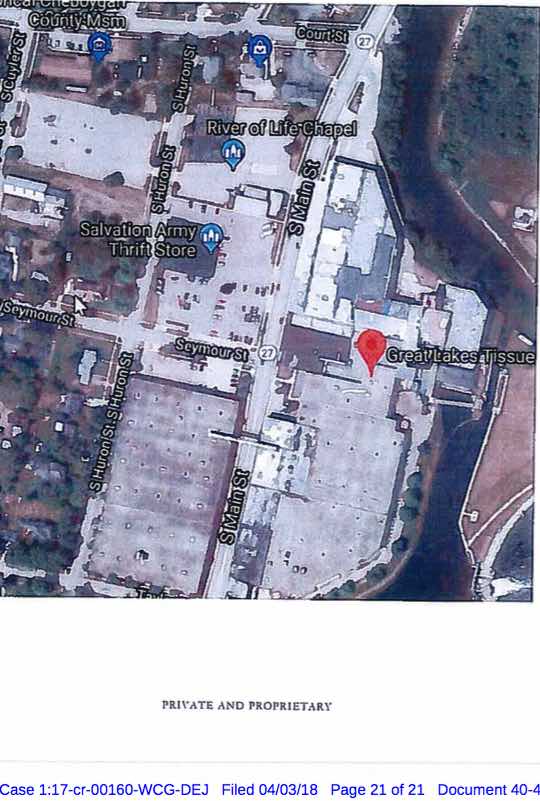
GUESS WHO’s the New CEO of
GREAT LAKES
INTER-TRIBAL
COUNCIL INC.?
- January 27, 2013, Decision & Order of the Wisconsin Tax Appeals Commission, various dockets, Steven Peters, Ronald Van Den Heuvel & Artley Skenandore Jr. v. WI Dept. of Revenue
[re: NATURE’S WAY TISSUE CORP.]
[Artley] Skenandore had no expertise in the paper industry. Nevertheless, he was made president [of Nature’s Way Tissue Corp.]
Nature’s Way Tissue Corp. fraud scheme principals: OSGC, Artley Skenanadore Jr., Ron Van Den Heuvel, and Steven Peters (who was also a ‘straw borrower’ in Ron’s bank fraud scheme during the same time period that Nature’s Way Tissue Corp. violated state tax laws and ONWI lost over $4 Million)
- November 7, 2017 Opinion,
U.S. Tax Court
Docket Nos. 4756-15, 21583-15,
VHC Inc. and Subsidiaries v.
Commissioner of Internal Revenue [IRS]
B. VHC Ownership and Employees
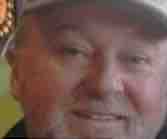 During the tax years at issue members of the Van Den Heuvel family (VDH family), including relatives by blood and marriage, had a controlling interest in VHC. In 1998 the following VDH family members collectively owned approximately 75% of the voting stock and 63% of the nonvoting stock of VHC: Ronald H., Steven, Raymond II, David, Guy Piontek (G. Piontek), Timothy, and C. Kassner. [VOS Electric Inc. VP] William Bain (W. Bain) was related to the VDH family by marriage until approximately 30 years ago. In 1998 W. Bain owned approximately 7% of the voting stock and 10% of the nonvoting stock – the same percentage of shares as David, Timothy, and Raymond II. G. Piontek is married to one of Raymond and Patricia’s daughters. …
During the tax years at issue members of the Van Den Heuvel family (VDH family), including relatives by blood and marriage, had a controlling interest in VHC. In 1998 the following VDH family members collectively owned approximately 75% of the voting stock and 63% of the nonvoting stock of VHC: Ronald H., Steven, Raymond II, David, Guy Piontek (G. Piontek), Timothy, and C. Kassner. [VOS Electric Inc. VP] William Bain (W. Bain) was related to the VDH family by marriage until approximately 30 years ago. In 1998 W. Bain owned approximately 7% of the voting stock and 10% of the nonvoting stock – the same percentage of shares as David, Timothy, and Raymond II. G. Piontek is married to one of Raymond and Patricia’s daughters. …

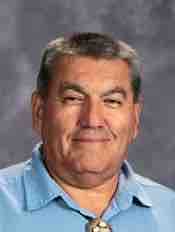 PCDI owned 67% of Custom Tissue, LLC (Custom Tissue), and the remaining portion was owned by employees or other related parties. Custom Tissue was incorporated in Wisconsin in 2003. Custom Tissue owned 49% of Nature’s Way Tissue Corp. (NWTC), a Wisconsin corporation that was majority owned by Native American investors. TPTC performed management functions for NWTC under a management agreement. NWTC converted tissue rolls into finished, packaged products. NWTC owned 100% of both Custom Paper Products, Inc. (CPPI), and Purely Cotton Products Corp. (Purely Cotton). CPPI was incorporated in 2000 in Wisconsin. It operated as a converting operation, which took large tissue rolls and cut them into consumer-size rolls. Purely Cotton owned the patents, technology, and intellectual property regarding a process for making tissue out of cotton. Custom Tissue, NWTC, CPPI, and Purely Cotton were administratively dissolved in 2012. …
PCDI owned 67% of Custom Tissue, LLC (Custom Tissue), and the remaining portion was owned by employees or other related parties. Custom Tissue was incorporated in Wisconsin in 2003. Custom Tissue owned 49% of Nature’s Way Tissue Corp. (NWTC), a Wisconsin corporation that was majority owned by Native American investors. TPTC performed management functions for NWTC under a management agreement. NWTC converted tissue rolls into finished, packaged products. NWTC owned 100% of both Custom Paper Products, Inc. (CPPI), and Purely Cotton Products Corp. (Purely Cotton). CPPI was incorporated in 2000 in Wisconsin. It operated as a converting operation, which took large tissue rolls and cut them into consumer-size rolls. Purely Cotton owned the patents, technology, and intellectual property regarding a process for making tissue out of cotton. Custom Tissue, NWTC, CPPI, and Purely Cotton were administratively dissolved in 2012. …
Beginning in 2000 William Bain, a VHC shareholder and former brother-in-law, served as a straw borrower for Ronald H. by obtaining loans on behalf of Ronald H. at different banks. In 2000 he obtained a loan for $125,000 from Associated Bank and a loan for $250,000 through Nicolet Bank. In 2002 he used his personal credit to obtain a $500,000 loan of which Ronald H. used the proceeds to buy out an EcoFibre shareholder.
- February 4, 2013 Order Granting Plaintiff’s Motion for Summary Judgment and For Entry of Judgment, Brown Co. Case No. 12CV479, Julie Gumban v. Ron Van Den Heuvel, Kelly Van Den Heuvel, KYHKJG LLC, Tissue Products Technology Corp. & Tissue Technology LLC
- March 20, 2013 Amended Complaint and Jury Trial Demand, Brown Co. Case No, 13CV463, Marco Araujo, M.D. v. Ronald Van Den Heuvel and Green Box N.A.
- March 31, 2013 Oneida Seven Generation Corp./OSGC Narrative Report re: Energy Project & Litigation with City of Green Bay
“On or about May 3, 2013, Kevin Cornelius informed ACF that 4 out of 5 OSGC Board members approved the commitment letter.” [April 6, 2015 Plaintiffs-Appellants’ Brief, Cook Co. IL, ACF/GCF v. ONW/OSGC et ]
- May 3, 2013 – 3:32 PM Email from Eric Decator of ACF/GCF to OSGC/GBRE’s Kevin Cornelius re: OSGC Board members willing to sign Commitment Letter
Kevin:
Did you sign the commitment letter yet?
Eric
- 3:54 PM Email from Kevin Cornelius to Eric Decator re: OSGC Board members willing to sign Commitment Letter in reply to 3:32 PM Email from Eric Decator of Arland Clean Fuel/Generation Clean Fuels
We are still waiting for one more board member to give us a yes. We have 4 yes votes, but we’d like to have all 5 votes.
We have two options. First, we will talk with Craig at the bank and if he needs it by today then we will sign the commitment letter since we have the votes.
Second, if we wait till Monday [May 6, after the Sunday, May 5, 2013 GTC Meeting Kevin Cornelius attended on behalf of OSGC where GTC voted to prohibit OSGC from engaging in ACF/GCF’s project on the Oneida Reservation,] then we will work with the board member to get his vote by Monday. He is not opposed, but he had a few questions and we have sent him the answers, but he has not gotten back to us.
- May 5, 2013 General Tribal Council Special Meeting packet materials regarding Oneida Eye Publisher Leah Sue Dodge’s petition to prohibit OSGC from conducting gasification on the ONWI Reservation
4. Petitions …
b. Petitioner Leah Sue Dodge: General Tribal Council directs the Oneida Business Committee to stop Oneida Seven Generations Corporation (OSGC) from building any “gasification” or “waste-to-energy” or “plastics recycling” plant at N7329 Water Circle Place, Oneida, WI or any other location within the Oneida Tribal reservation boundaries
Motion by Karen Skenandore, seconded by Tammy Skenandore, to end discussion. Motion approved by show of hands.
Motion by Leah Sue Dodge, seconded by Cathy L. Metoxen, to direct the Oneida Business Committee to stop Oneida Seven Generations Corporation (OSGC) from building any ‘gasification’ or ‘waste-to-energy’ or ‘plastics recycling’ plant at N7329 Water Circle Place, Oneida, Wisconsin or any other location within the Oneida Tribal boundaries. Motion by Loretta V. Metoxen, seconded by Larry Smith, to table [the petition submitted by Leah Sue Dodge]. Motion to table failed by hand count: Yes—755, No—814, Abstentions–18, Total votes–1,587
Motion by Leah Sue Dodge, seconded by Cathy L. Metoxen, to direct the Oneida Business Committee to stop Oneida Seven Generations Corporation (OSGC) from building any ‘gasification’ or ‘waste-to-energy’ or ‘plastics recycling’ plant at N7329 Water Circle Place, Oneida, Wisconsin or any other location within the Oneida Tribal boundaries. Motion approved by a show of hands.
- TRANSCRIPT – May 5, 2013 General Tribal Council Meeting Transcript, including GTC’s vote to prohibit OSGC & its subsidiaries from engaging in ‘pyrolysis,’ ‘waste-to-energy’ and ‘plastics-to-oil’ anywhere on the Oneida Nation of Wisconsin reservation.
- AUDIO – May 5, 2013 GTC Meeting re: OSGC wherein GTC votes to prohibit OSGC from conducting gasification on the Oneida reservation, yet OSGC got caught doing it anyway!
SUBSEQUENTLY . . .


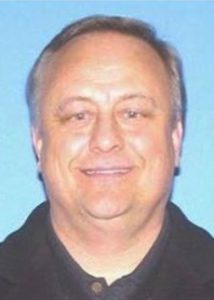

- May 24, 2013 Articles of Organization for
CHEYBOYGAN ENERGY & BIOFUELS, LLC,
2077B Lawrence Dr., De Pere, WI 54115; Organizer signature: Ty. C. Willihnganz; Initial Registered Agent: Environmental Advanced Reclamation Technology HQ LLC [E.A.R.T.H.]; Current Registered Agent: Ron Van Den Heuvel
- May 24, 2013 Master Lease Agreement between Green Bay Renewable Energy LLC and ACF Leasing, ACF Services, Generation Clean Fuels LLC, signed by GBRE Chairman & OSGC CEO Kevin Cornelius to build a PYROLYSIS PLANT IN CHEBOYGAN, MICHIGAN, resulting in Cook County IL Case # 14-L2768, ACF Leasing LLC, ACF Services LLC & Generation Clean Fuels LLC v. Green Bay Renewable Energy, LLC, Oneida Energy Inc. & Oneida Energy Blocker Corp.
According to the April 6, 2015 Plaintiffs–Appellants’ Brief in Cook. Co. Case No. 2014-L-2768, GCF/ACF v. ONWI & OSGC, et al., and Exhibits:
Louis Stern and Kevin Cornelius signed the [GCF] Agreements in May and June, 2013. …
Throughout the negotiations of the Agreements, OSGC and the Tribe representatives repeatedly represented to ACF that they are acting on behalf of the Tribe/OSGC and referred to the Tribe, OSGC and GBRE as though they were one and the same. … Kevin Cornelius and Bruce King repeatedly corresponded with ACF regarding the Project, utilizing OSGC email addresses and OSGC letterhead and utilized OSGC’s office. … Kevin Cornelius and Bruce King represented to ACF that GBRE was only a vehicle for tax purposes, that the Agreements were with the Tribe/OSGC and that Kevin Cornelius had authority to enter into the Agreements and waive sovereign immunity on behalf of the Tribe, OSGC and GBRE. …
In reliance on the representations of Kevin Cornelius, Bruce King, and William Cornelius that they had they permission of the Tribe and OSGC to enter into the Agreements, ACF continuously performed a variety of tasks to meet its obligations under the Agreements once they were executed. … In fact, Kevin Cornelius and Bruce King sent numerous documents related to the Project to Eric Decator in Illinois, but none of these documents referred to GBRE, which was consistent with ACF’s understanding that the actual parties to the Project were OSGC/the Tribe.
 According to the May 22, 2014 Complaint w/ Exhibit ‘Master Lease Agreement’ filed in U.S. District Court, Middle District of Florida, Fort Meyers Division, Case No. 2:14-cv-283, Generation Clean Fuels v. Veterans Capital Corp. [Joseph E. Wold Jr., President]:
According to the May 22, 2014 Complaint w/ Exhibit ‘Master Lease Agreement’ filed in U.S. District Court, Middle District of Florida, Fort Meyers Division, Case No. 2:14-cv-283, Generation Clean Fuels v. Veterans Capital Corp. [Joseph E. Wold Jr., President]:
14. Pursuant to an Equipment Manufacture and Purchase Agreement, dated August 15, 2012 (the “Purchase Agreement”), between GCF and SPARTAN, Spartan agreed to manufacture the Machine, which was to be located in CHEBOYGAN, MICHIGAN. A true and complete copy of the Purchase Agreement is attched hereto as Exhibit B.
 Louis Stern was President of SPARTAN, INC., of Bakersfield, CA, which was supposed to build a poly conversion liquefaction machine for Veterans Capital Corp. to lease to Louis Stern’s and Atty. Eric Decator’s Generation Clean Fuels, LLC, which would then sublease the machine to OSGC & GBRE, but the machine was never built.
Louis Stern was President of SPARTAN, INC., of Bakersfield, CA, which was supposed to build a poly conversion liquefaction machine for Veterans Capital Corp. to lease to Louis Stern’s and Atty. Eric Decator’s Generation Clean Fuels, LLC, which would then sublease the machine to OSGC & GBRE, but the machine was never built.

![]()
06/11/13–06/13/13 : From the Native American Finance Officers Association [NAFOA] Energy Summit at the Sandia Resort & Casino Hotel in Albuquerque, New Mexico
- June 11, 2013 ‘Green Energy: Developing Tribal Energy Resources and Economies’ PowerPoint by John Clancy & Brian Pierson of Godfrey & Kahn – Click to view Godfrey & Kahn’s presentation encouraging tribes to FINANCE & FLIP ‘Green Energy’ schemes like those of Ron Van Den Heuvel’s various Green Box NAs / EcoHub / EARTH / RTS, and Oneida Seven Generations Corporation and OSGC subsidiaries Oneida Energy, Inc. & Green Bay Renewable Energy, LLC
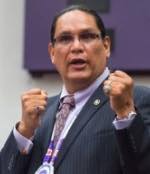 9:00 a.m. Round-Table Discussion: Economic and Energy Challenges and Opportunities for Indian Country – Tex G. Hall, Mandan, Hidatsa & Arikara, Chairman-Mandan, Hidatsa & Arikara Nation; …Ernie Stevens [Jr.], Oneida Nation, Board-Chairman National Indian Gaming Association; …Tina Danforth, Delegate-Native American Finance Officers Association and Treasurer-Oneida Tribe of Indians of Wisconsin…
9:00 a.m. Round-Table Discussion: Economic and Energy Challenges and Opportunities for Indian Country – Tex G. Hall, Mandan, Hidatsa & Arikara, Chairman-Mandan, Hidatsa & Arikara Nation; …Ernie Stevens [Jr.], Oneida Nation, Board-Chairman National Indian Gaming Association; …Tina Danforth, Delegate-Native American Finance Officers Association and Treasurer-Oneida Tribe of Indians of Wisconsin…
1:30 p.m. Session 3: Funding Development on Tribal Lands: EB-5 Foreign Investment, New Market Tax Credits, DOE Programs and Equity and Debt Partners…
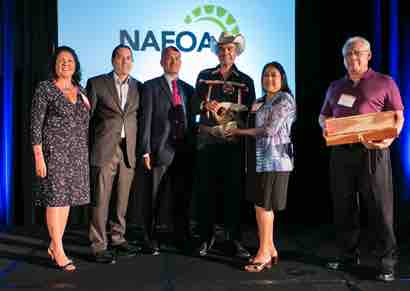 OBC Treasurer Cristina Delgado-Danforth’s Report to the OBC re: her presentation pitching OSGC’s waste energy scheme at the Native American Finance Officers Association/NAFOA Energy Summit in Albuquerque, New Mexico; OBC Chair Cristina Danforth is the President of the NAFOA Board as well as a member of the Board of Directors of both the Native American Bank NA & Native American Bancorporation Co. [NABNA] in the State of Colorado:
OBC Treasurer Cristina Delgado-Danforth’s Report to the OBC re: her presentation pitching OSGC’s waste energy scheme at the Native American Finance Officers Association/NAFOA Energy Summit in Albuquerque, New Mexico; OBC Chair Cristina Danforth is the President of the NAFOA Board as well as a member of the Board of Directors of both the Native American Bank NA & Native American Bancorporation Co. [NABNA] in the State of Colorado:
I was asked to be a speaker at the NAFOA Energy Summit to talk about renewable energy sources. The source of my inspiration was the Oneida Seven Generations Corporation Gasification Plant. Converting recycled food grade plastics into base oil, char ash and vapor gas is the basic model for this energy source. The base oil would be sold to oil refineries or a reseller of synthetic oil. With many of the newer cars requiring synthetic oil, the use of this oil is increasing. Char ash which is high in carbon would be sold to paving companies for driveways, parking lots, and roads. The vapor gas burns cleaner than propane gas and could be sold as a replacement for propane. The concept of using recycled food grade plastics and converting it to a renewable energy source not only keeps items from landfills but would provide a more economical product to the general population.
Despite our own trials and tribulations with the OSGC project, many of the other Tribes in attendance were eager to learn more. It was a great opportunity to highlight a project OSGC has been working on for some time …
Even though our own [Oneida Seven Generations] Corporation has been the target of negative press and conversations, they are the only entity connected to our Tribe that thought outside the box and did their best to make something happen that would generate additional revenues for our Tribe. Even though we all do not see the value in their work, they did the best they could with what they had. Their project may not be welcome on our reservation but other Tribes liked the idea and wanted to learn more. It is just unfortunate for us that we were unable to bring this technology to light.
Cristina Danforth is now President of the Native American Finance Officers Association Board [NAFOA] as well as a member of the Board of Directors of the Native American Bank NA [NABNA] and the Native American Bancorporation Co. in the State of Colorado.

According the FY2017 GTC Annual Meeting Packet, the Oneida Nation of Wisconsin has so far LOST 70% of its $1,000,00 investment in 8% ownership of NABNA.
Tina Danforth misses ~50% of OBC and GTC Meetings due to her travel for NABNA and the Native American Finacce Officers Association [NAFOA], work for which she is presumably paid even as her incompetence leads to MILLIONS OF DOLLARS IN LOSSES TO GTC.
MEANWHILE, the Native American Bank NA makes money when tribes borrow millions from the BIA for boondoggles like Ron Van Den Heuvel’s & OSGC’s ‘renewable energy’ fruad schemes, and the Native American Bank NA Annual Report 2015 says:
2014 … We became a dominant institution in the utilization of BIA loan guarantees, accounting for nearly 30% of all dollars under this type of guarantee in the country.
For the second year in a row we received a Bank Enterprise Award in the amount of $265,496 and a Performance Lending Award from the US Department of Interior, Office of Indian Energy and Economic Development Division of Capital Investment.
An AUGUST 15, 2011 DOCUMENT
provided by ONEIDA TIMES Publisher YVONNE METIVIER re: Statements made by former OSGC Secretary MIKE METOXEN to former OBC Chair EDWARD DELGADO about four (4) Wisconsin-registered corporate entities formed by OSGC for purpose of the “biomass grant project” named the following OSGC subsidiaries:
• Oneida Recycling Solutions, LLC
• Broadway Manufacturing, LLC, and
Italicized notes at the end of the Memo state
the “biomass pyrolysis device”
was being sold to OSGC by…
…and the notes said that the seller of the biomass pyrolysis device was in delinquent status with WDFI as of 04/04/11.
HOWEVER . . .
Oneida Eye believes “Alliance Energy Alliance, LLC” is a typo and was actually in reference to a company that the Oneida Nation of WI’s General Tribal Council was never informed even existed –
– which was registered w/ WDFI on 05/13/09 and delinquent as of 04/01/11; Registered Agent Mark Anthony Sweet; Principal Office:
2994 E. Service Road, Oneida, WI, 54155.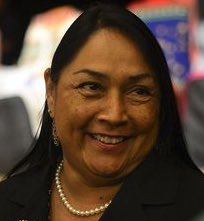
MEANING THAT COMPANY SHARES
THE EXACT SAME ADDRESS AS
ONEIDA BUSINESS COMMITTEE
CHAIR & FORMER OBC TREASURER
CRISTINA DANFORTH’s
OWN PERSONAL FAMILY BUSINESS
. . .
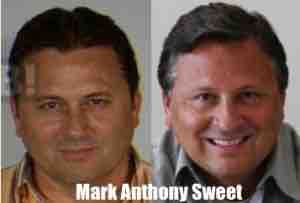
MARK ANTHONY SWEET is also the listed as being the Manager of…
ALL NATIONS DEVELOPMENT ALLIANCE, LLC
registered w/ Minnesota Secretary of State on 04/04/10;
Registered Office: 7241 Ohms Ln. #275, Edina, MN, 55439; Principal Office: 350 N. Main Street, Suite 236, Stillwater, MN, 55082.
THINK
ABOUT THAT
OBC & OSGC tried
to convince the ONWI
General Tribal Council
to borrow millions in loans
to buy a ‘machine’ from
a company located in
a rez bar owned by
Cristina Danforth
(fmr. OBC Treasurer,
exiting OBC Chair)
whose sister
Caterina ‘Cathy’ Delgado
was on
OSGC’s
Board of Directors
which the OBC ‘oversees.’

Cristina Danforth obtained & defaulted in bankruptcy against loans against her drinking establishment …
(and secret energy company headquarters) from…
According to court documents in Brown County Case No. 2013CV1838, Oneida Small Business, Inc. v. White Eagle Sports Bar & Grill, LLC, Paul Danforth, and Cristina Danforth:
On November 18, 2009, Defendant, White Eagle Sports Bar & Grill, LLC, delivered to Plaintiff a Business Note for consideration. The Note was in the sum of $48,925.16. On August 18, 2006, Defendants, White Eagle Sports Bar & Grill, LLC, Cristina Danforth and Paul Danforth, signed a General Business Security Agreement pledging assets of the LLC as collateral on the Business Note and on August 18, 2006, Defendant, Cristina Danforth, married to Paul Danforth at the time, signed a Continuing Guaranty (Unlimited), personally guaranteeing the loans of White Eagle Sports Bar & Grill, LLC.
…As of November 13, 2013, the date of Plaintiff’s Summons and Complaint, there is owed the sum of $54,358.80, comprised of principal, accrued interest and late charges. Interest against the principal accrues at 4.0% interest.
…Cristina Danforth, in her Answer to the Summons and Complaint in this case, did not deny she was in default on the note.
As a result of the defaults in payment, Plaintiff, as it is entitled to do under the note, has declared the indebtedness immediately due and payable and demands payment in full and surrender of the business assets which secures repayment of the indebtedness.
…In her answer, Defendant, Cristina Danforth, failed to state any valid counter claim or defense relating to her failure to make payments on the note as they became due.
Excerpt from Defendant Tina Danforth’s handwritten Answer (with her own name misspelled TWICE):
Defendents [sic] demands
a trial by a jury of twelve.
That was after Cristina Danforth had been dropped as a client by Attorney John Petitjean…
who was also at that same time the attorney for Ron Van Den Heuvel and his fraudulent companies.
On May 24, 2013 and June 10, 2013 ACF / GCF CEO Louis Stern signed Master Lease & Service Agreements with OSGC CEO / GBRE Chair Kevin Cornelius resulting in ACF / GCF filing a bogus $400 Million lawsuit against the Oneida Nation of Wisconsin which appears to be an extortion racket designed to defraud the ONWI General Tribal Council of undisclosed MULTIMILLIONS of dollars.
Louis Stern & Ron Van Den Heuvel’s 20-year
business partner Gaylen LaCrosse are co-owners
of Arland Clean Fuels aka Generation Clean Fuels
which sued Oneida Nation WI for $400 Million
& got an undisclosed multimillion ‘settlement‘
To defend their criminal fraud scheme, OSGC & GBRE have engaged in malicious litigation against the City of Green Bay at the behest of OSGC / GBRE counsel and co-conspirators…
GODFREY & KAHN S.C.

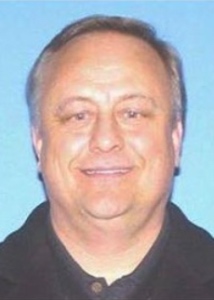

 QUESTION:
QUESTION:
WHAT IS…
OF WHICH RON VAN DEN HEUVEL IS REGISTERED AGENT…
AND WHY DID RON’s WAREHOUSE-RESIDING ‘ATTORNEY’
(WHEN NOT SUSPENDED) TY C. WILLIHNGANZ ORGANIZE IT
ON MAY 24, 2013 [ARTICLES of ORGANIZATION] WITH RON’s
E.A.R.T.H. AS ‘REGISTERED AGENT’ … THE EXACT SAME DAY
ONEIDA SEVEN GENERATIONS CORP. CEO & OSGC SUBSIDIARY
GREEN BAY RENEWABLE ENERGY LLC CEO KEVIN CORNELIUS
SIGNED MASTER LEASE CONTRACTS WITH ACF LEASING LLC,
ACF SERVICES LLC & GENERATION CLEAN FUELS LLC…
FOR OSGC’s ‘PYROLYSIS’ SITES IN MONONA, WISCONSIN…
& IN CHEBOYGAN, MICHIGAN?
- October 18, 2017:
GreatLakesEcho.org / Capital News Service:
Major ‘recycling’ scam in Michigan & Wisconsin sparks indictment
A bogus scheme
to build an eco-friendly
“green energy”
waste processing facility in Detroit defrauded lenders and investors — including Chinese investors hoping to qualify for U.S. visas — of $4,475,000, according to a federal grand jury in Milwaukee.
MORE INFO BELOW…
See also:
Ron & Bill’s ‘straw borrower’ bank fraud schemes continued long after the year 2000:
- September 20, 2016 Superseding Indictment re: ‘Straw Borrower’ Bank Fraud Scheme, U.S. District Court, WI Eastern District Docket No. 16-CR-064, USA v. Ron Van Den Heuvel, Paul Piikkila & Kelly Van Den Heuvel
Compare & contrast:
Recipients include:
- WI Gov. Scott Walker
- WI Atty. General Brad Schimel
- Former WI Atty. General
J.B. Van Hollen
HMMM…
 BANK FRAUD
BANK FRAUD
TO
BUY FAVORS
STRAW BORROWERS
STRAW DONORS
STRAW CORPORATIONS
- November 9, 2009 Contract #LEG FY10-19812, $2 Million Legislative Award Agreement between the Wisconsin Dept. of Commerce and Oneida Seven Generations Corp. / OSGC
- September 30, 2011 Wisconsin Economic Development Corp. Contract #WEDC FY12-21010, $1.2 Million Loan Agreement Between the Wisconsin Economic Development Corporation and Green Box NA Green Bay, LLC with exhibits, amendments and General Business Security Agreement with Ron Van Den Heuvel’s signed personal Unlimited Guaranty, along with the signature of Fmr. Green Bay Mayor & Fmr. WEDC CEO Paul Jadin, and renegotiation contract signed by WEDC Vice-President Jake Kuester
- November 16, 2011 Contract #SEP FY10-20265, $2 Million State Energy Program Loan Agreement between the Wisconsin Economic Development Corporation / WEDC and Oneida Seven Generations Corp. / OSGC-subsidiary Oneida Energy Inc.
- VIDEO Excerpt of September 9, 2015 WI Joint Legislative Affairs Committee Meeting, in which Fmr. WEDC Board Member & WI State Sen. Julie Lassa testified:
[WEDC] had invited Green Box as late as [March 20, 2015] to participate in a ‘trade trip’ to Tanzania, even though Green Box is being investigated and it might be something like a Ponzi scheme or a check-kiting organization.
20 YEARS AGO…
EXPOSÉ of RONALD’s PAY-to-PLAY…
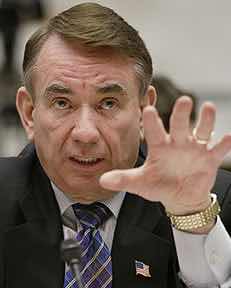
 November 2, 1997:
November 2, 1997:
Milwaukee Journal Sentinel
by Daniel Bice
Businessman Ronald Van Den Heuvel says he donated money through Wisconsin residents to Gov. Tommy Thompson’s campaign for several years while living in Georgia – an apparent violation of state election laws.
In a recent interview, Van Den Heuvel was questioned about $10,000 in campaign donations that he and his wife [Jan Marie Summers Van Den Heuvel] made one day before the state approved a large issue of tax-free bonds for one of his businesses. Van Den Heuvel responded by saying he had given similar amounts in the past.
When asked why reporters had not spotted those earlier donations on Thompson’s financial reports, Van Den Heuvel said, “Yeah, you may not have because when I was a Georgia resident, I gave it to people here.”
Those Wisconsin individuals, whom he did not name, then turned the money over to Thompson, he said. Van Den Heuvel, owner of VOS Electric in Green Bay and other businesses, said he moved to Wisconsin three years ago. …
Kevin Kennedy, executive director of the state Elections Board, said state law specifically bars people from laundering campaign donations or knowingly accepting laundered funds. Kennedy said it could be either a civil or criminal offense, depending on whether prosecutors believe they can prove the campaign money was given or received in intentional violation of the law. …
11/02/1997 – Milwaukee Journal Sentinel:
by Steve Schultze
and Daniel Bice
Like others before him, Ron Van Den Heuvel, a Green Bay-area entrepreneur, found the route to state largess with the help of Gov. Tommy G. Thompson.
Van Den Heuvel hit the jackpot in late September when an obscure state board awarded $24 million worth of tax-free bond financing to help him reopen an Oconto Falls tissue factory – the largest such approval this year and among the largest ever made by the state.
The award culminated nearly a year’s effort that included a formal application through the Commerce Department. But Van Den Heuvel worked informal channels to Thompson as well. And last May – the day before an initial financing award was made by the state – Van Den Heuvel and his wife [Jan Marie Summers Van Den Heuvel] donated a total of $10,000 to the governor’s campaign fund. Van Den Heuvel said he had been asked for the donation by Thompson’s fund-raiser in November 1996.
When asked by reporters last month about the campaign donations, Thompson moved quickly to return the money.
The subsidy will save Van Den Heuvel’s company at least $2 million in short-term financing costs, Van Den Heuvel said. The financing covers nearly half of the $52 million cost of renovating the Oconto Falls factory.
The circumstances of the case and others reviewed by the Journal Sentinel in an eight-month investigation suggest a trend in which donors and well-connected firms enjoy a close and mutually beneficial relationship with the Thompson administration. …
![]()
![]()
![]() 02/19/2018:
02/19/2018:
Aldermen voting to support giving $2.5 Million ‘settlement’/ransom to RICO extortion fraud scheme Oneida Seven Generations Corp.:
Tom DeWane
Barbara Dorff
Bill Galvin
Joe Moore
David Nennig
Randy Scannell
Tom Sladek
Mark Steuer
John Vander Leest
Chris Wery
Aldermen voting against $2.5 Million ‘settlement’/ransom to RICO extortion fraud scheme Oneida Seven Generations Corp. – which one of the City’s insurers refuses to fund:
Andy Nicholson
Guy Zima
02/12/2018:
- Green Bay Press-Gazette / USA Today:
Green Bay to pay Oneida Seven Generations Corp. $2.5 million to settle lawsuit over waste-to-energy plant
- ABC 2 WBAY: Green Bay to pay Oneida Seven Generations Corp. $2.5 million in waste-to-energy plant lawsuit settlement
- FOX 11 WLUK: Green Bay could pay Oneida Seven Generations Corp. $2.5M to settle suit on waste-to-energy plant
The City Council’s Finance Committee is expected to discuss the settlement proposal at its Tuesday meeting, according to the agenda. And then the full City Council would have to approve the deal.
Once the payment has been made, the lawsuit would be dismissed, according to the five-page settlement agreement[.]
Mayor Jim Schmitt [01/04/18], OSGC Managing Agent Pete King III [01/16/18], and John Breuninger [01/11/18] of [OSGC subsidiary] Green Bay Renewable Energy signed the document last month.
[Compare & contrast with another Godfrey & Kahn client’s ‘agreement’ with another municipality when the mayor was simultaneously an employee of the adversarial corporation:
• June 20, 2014 Draft Settlement Agreement and Mutual Release between the City of Adams, Wisconsin and GEITS Corp.
• January 18, 2014: Milwaukee Journal Sentinel – Green energy plan raises red flags in City of Adams; Controversy centers on charges of conflict of interest involving mayor]
QUESTION:
Why is one of Green Bay’s insurance carriers resisting paying any part of the $2.5 Million ‘settlement’ ransom to OSGC/GBRE?
Maybe that insurer didn’t want to fund ongoing RICO Extortion Fraud Schemes just because a few people in City Hall (& Brown Co. gov’t) wanted to intentionally lose a bogus appeal of a dismissed lawsuit in order to cover-up their own complicity?
WTF MAYOR SCHMUCK?!
Previously:
FIVE YEARS AGO…
01/09/2013:
01/16/2018:
Oneida Eye Publisher Leah Sue Dodge
and Atty. Stuart Gross of Gross & Klein
were PREVENTED from even giving
General Tribal Council presentations at the
Jan. 16, 2018 GTC Special Meeting about
investigating ‘green energy’ fraud schemes and
the Oneida Nation in WI’s growing amount
of tens of millions in losses & damages.
An Amendment to delete the Petition item from
the Agenda was made by ONWI Land Office
Manager Lori Elm and seconded by ONWI
Trust & Enrollment Chair / Public Relations
Director Bobbi Webster, and 700+ of
more than 1,700 GTC Meeting attendees
voted to support unethical censorship
and ongoing corruption & fraud by
ONWI officials & corporations…
…so here’s the Petitioner’s
By eliminating Leah Sue Dodge’s Agenda item and presentation to GTC, Lori Elm and Bobbi Webster also helped the Oneida Business Committee and Oneida Law Office to further avoid finally addressing this information from OLO Chief Counsel Jo Anne House’s analysis of the Petition in the GTC Meeting Packet regarding the SECRET MULTIMILLION DOLLAR ‘SETTLEMENT’ paid to Ron Van Den Heuvel’s associates at Generation Clean Fuels LLC by Green Bay Renewable Energy, LLC, about which the OBC, OLO and OSGC have told GTC multiple untruths regarding what looks like a possible EXTORTION arrangement to benefit unscrupulous insiders and reimburse some ‘investors’:
“Upon receipt of the petition submitted by Ms. Dodge, a legal review of the settlement agreement and the actions of the Oneida Nation was conducted. [OSGC-owned, Delaware-registered Green Bay Renewable Energy, LLC, which – like GBRE’s executives & officers – lacks ‘sovereign immunity’] was sent correspondence by the Oneida Law Office that requested the unredacted settlement agreement based on the commitments made by the Oneida Business Committee to the General Tribal Council predating entering into the agreement that the corporation was, or should have been, aware of at the time of entering into the agreement. The settlement agreement resolved all issues between Green Bay Renewable Energy LLC, as well as to other subsidiaries of OSGC [that also – like their executives & officers – lack ‘sovereign immunity’], for a specific sum paid to ACF Leasing LLC and its attorneys. The case was dismissed soon thereafter.
“As identified above the amount of the settlement is subject to a confidentiality clause. However, after a legal review it was determined that the General Tribal Council has a right to be made aware of the amount of the settlement. That right is subject to maintaining confidentiality within the General Tribal Council. As a result, the amount of the settlement will be reported by the Oneida Business Committee and will not be included in this written opinion. Members, upon being made aware of the amount of the settlement, are notified that the amount must be maintained confidential and should not be released to news reports, placed on social media sites, or other public forums.
“OSGC is continuing to press its claims of damages against the City of Green Bay regarding failure to issue a use permit and allowing the conditional use permit to lapse. This initial step of this litigation was decided in the corporation’s favor when the Wisconsin Supreme Court decided that City of Green Bay erred in not issuing a permit.**
“OSGC then filed a lawsuit for damages against the City of Green Bay. The claim was dismissed by the trial court determining that the corporation failed to exhaust its administrative remedies and that it was not precluded from doing so because OSGC alleged the business opportunity had closed with the lapse of various tax incentives and financing opportunities. The corporation appealed the decision and accepted an opportunity to settle the matter with the City of Green Bay in lieu of further litigation. As of the drafting of this opinion, those settlement discussions are ongoing. The corporation has been reminded that any settlement agreement is prohibited from containing a confidentiality clause.”
10/11/19 UPDATE:
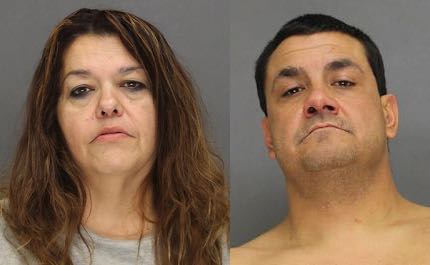
- October 11, 2019 Complaint, Brown Co. Case No. 19-CF-1560, State of Wisconsin v. LORI ANNE ELM / LORI ELM [Oneida Nation WI Division of Land Management Office Manager] re: HARBOR/AID FELON; RESIST/OBSTRUCT OFFICER from apprehending Ryan Chad Stevens
- SEE ALSO:
- Brown Co. Case No. 19-CM-920, RESIST/REPEATER, State of Wisconsin v. Ryan Stevens
- Brown Co. Case No. 19-CF-1117, THEFT/FELON w FIREARM, State of Wisconsin v. Ryan Stevens
- Brown Co. Case No. 17-CF-1328, POSSESS METH, State of Wisconsin v. Ryan Stevens
- Brown Co. Case No. 14-CF-1196, BATTERY/WEAPON, State of Wisconsin v. Ryan Stevens
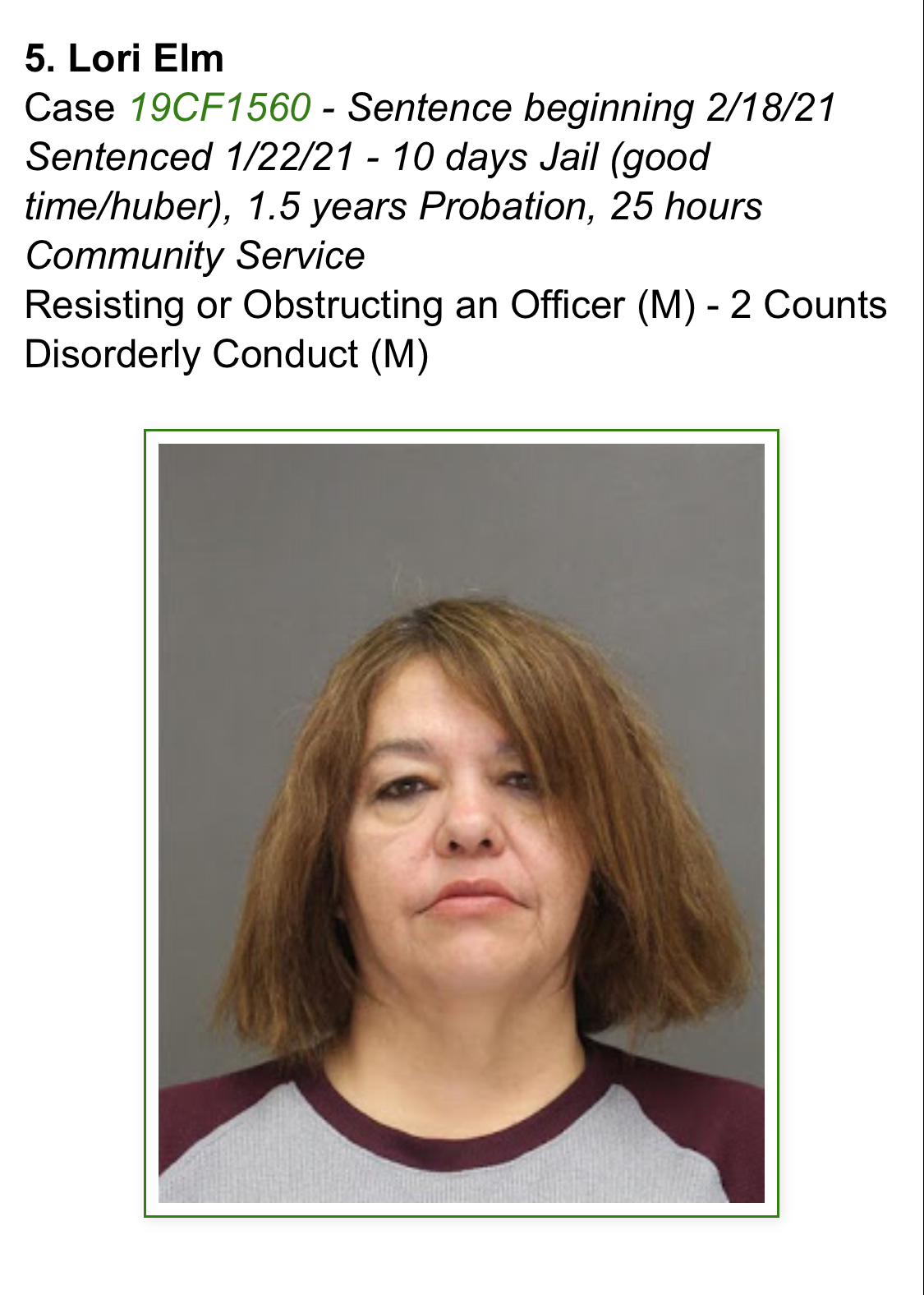
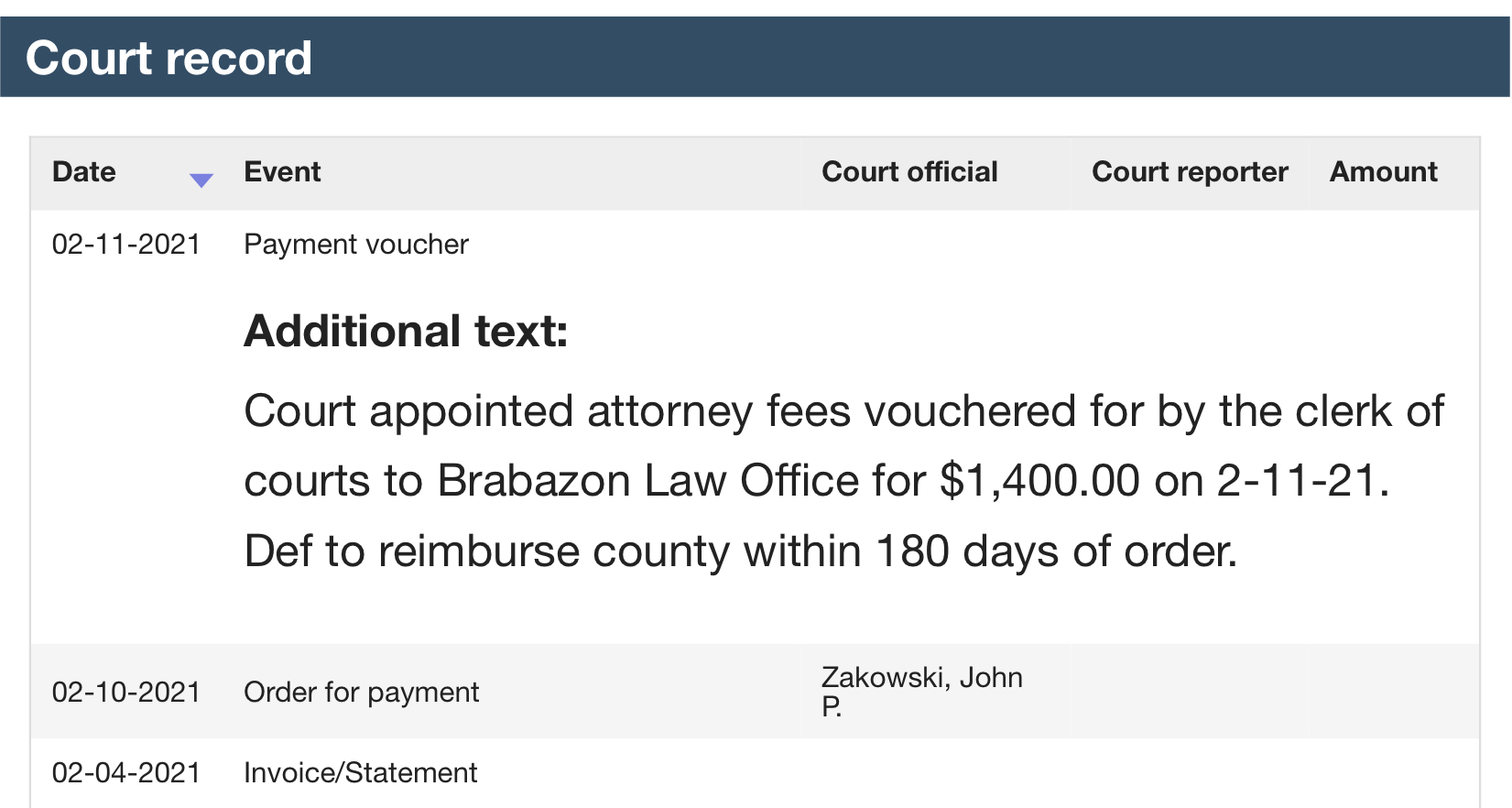
- Court records show MEGAN POLAR (charged w/ Maintaining Drug Trafficking Place) lists same Oneida Nation of Wisconsin reservation address as her mother, Fmr. Office Manager of Division of Land Management LORI ELM, whose sentence on other charges began February 18, 2021
- Brown Co. Case No. 21-CF-387, MAINTAIN DRUG TRAFFICKING PLACE, State of Wisconsin v. Megan Polar
- 03/11/21 Green Bay Crime Reports/GreenBayCrimeReports.com

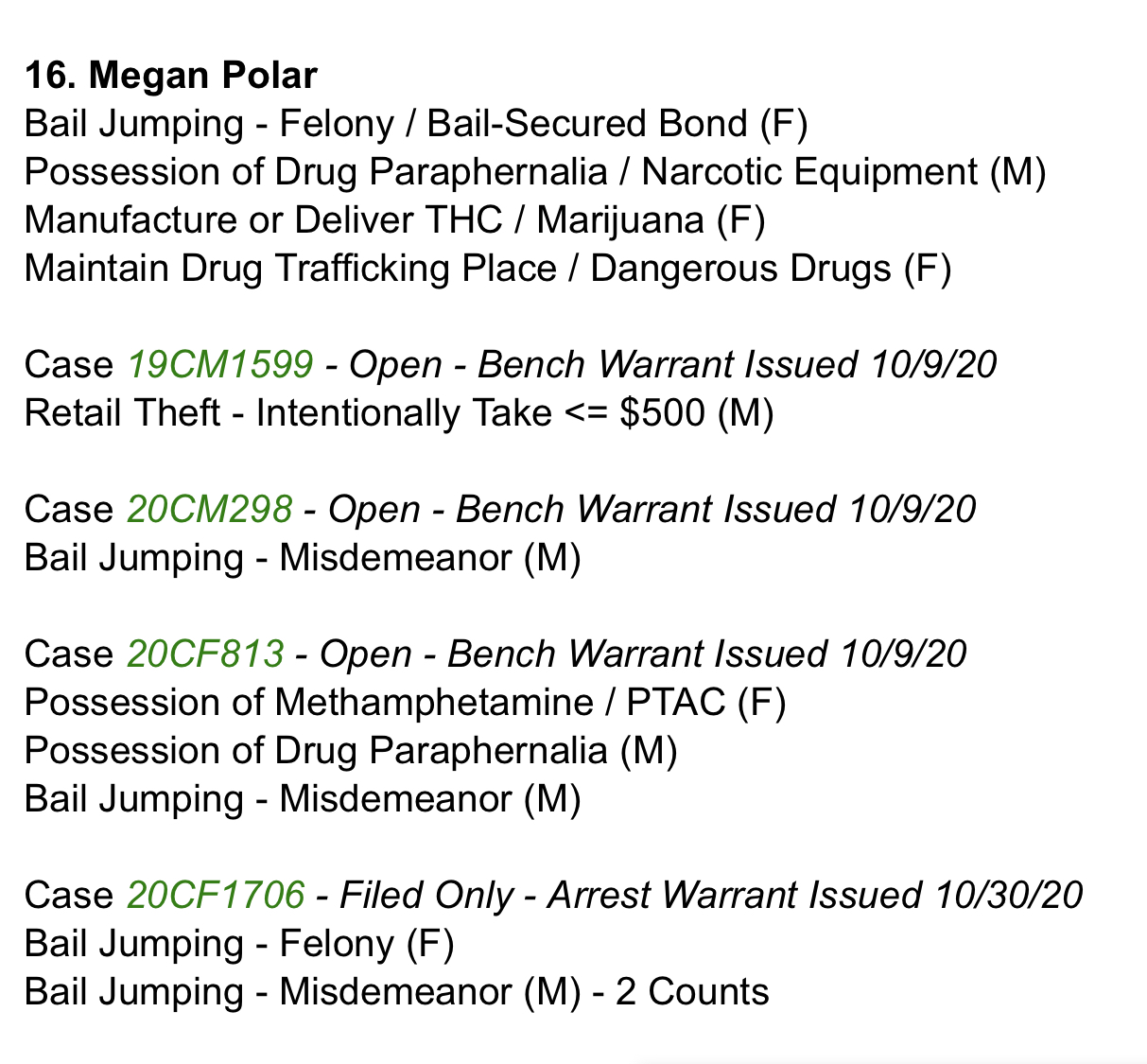
QUESTIONS:
OTHER THAN AN UNDISCLOSED
BIA-BACKED GUARANTEED LOAN,
SAY FOR $20+MILLION OR SO…
(using WHAT as ‘COLLATERAL’?)
…WHERE COULD OSGC SUBSIDIARY
GREEN BAY RENEWABLE ENERGY LLC
EVER BE ABLE TO COME UP WITH
$10+MILLION TO PAY OUT AN
‘UNDISCLOSED SETTLEMENT’
TO RON’S 20-YEAR ASSOCATES
AT GENERATION CLEAN FUELS, LLC
GIVEN THAT GBRE PEFORMED ZERO
‘REVENUE GENERATING ACTIVITY’
DURING ITS ENTIRE EXISTENCE?
Generation Clean Fuels had to reimburse private investors after lawsuits were filed by Tina Fritsch, wife of Mike Fritsch who shared office space with Alliance Construction, and David J. Wolf whose NewWay Energy, LLC was a partner with principals of Alliance GC and P2O Technologies, LLC.
Both Fritsch and Wolf had been guaranteed 700% returns on a $250,000 ‘investment’ as seen in court documents:
- April 5, 2014 Plaintiff’s Brief in Support of Summary Judgment, Brown Co. WI Case No. 13-CV-1065, Tina Fritsch v. Generation Clean Fuels, LLC
- Other Filings & Exhibits regarding Brown Co. Case No. 2013-CV-1065, Tina Fritsch v. Generation Clean Fuels, LLC (50 pages)
- Royalty Agreement between Generation Clean Fuels, LLC, and David J. Wolf, an exact copy of which was signed by Tina Fritsch
______________________
Did Oneida Nation of WI officials & corporate executives and their families make their own ‘Royalty Agreement’ side-investments in GCF / ACF Leasing / ACF Services excpecting to become some of the 70+’millionaires’ Ron Van Den Heuvel claimed in a deposition to have made in the Green Bay area?
______________________
Was GCF / ACF’s $400 Million lawsuit against ONWI, OSGC & GBRE, and subsequently Oneida Energy Inc. and individuals who do not have ‘sovereign immunity’…
and the OBC’s fraudulent Letter to GTC mailed in October 2015 – but dated September – which FALSELY stated that any settlement decision would be presented to GTC for action…
and the OBC’s ‘retro-active’ approval of OSGC & GBRE Managing Agent Peter King III‘s unauthorized & undisclosed multimillion dollar ‘Settlement Agreement’ with GCF / ACF…
actually all just another complex scheme to improperly reimburse ONWI officials & corporate executives or their families and other ‘investors’ for their own ‘Royalty Agreement side-investments’ – without the majority of GTC ever knowing about it – in what amounts to a ‘green energy’ RICO fraud & extortion schemes using Tribal and Wisconsin gaming compact monies – in addition to federal funds?
______________________
Did ONWI-owned Bay Bank – the Board of which includes OSGC Managing Agent Pete King III and former OSGC Board member & current ONWI Legislative Affairs Director Nathan King – ever ‘write off’ any fraudulent loans used for Ron Van Den Heuvel and his several bank fraud scheme ‘straw borrowers’…
including Bill Bain whose son-in-law Matthew R. Olson / Matt Olson who is partners via Crosskeys Investors, LLC with Nature’s Way Tissue Corp. President Artley Skenandore Jr. and having a sweetheart land leasing deal for ONWI-owned property, including 1501 Main Avenue, De Pere, WI 54115 where the BP gas station / A&W restaurant operates under the name De Pere Superstore?
According to the January 2, 2018 United States’ Sentencing Memorandum in U.S. District Court, Eastern District of Wisconsin, Case No. 16-CR-64, United States of America v. Ronald H. Van Den Heuvel
First, [Ron] Van Den Heuvel’s offense was highly planned and elaborately deceitful. Van Den Heuvel was a sophisticated actor who knew how banks operate, having formed numerous business entities, obtained loans from various banks, and even served on the board of directors for a bank. …
Second, the size, scope, and complexity of Van Den Heuvel’s offense compels significant consequences. Through the use of straw borrowers, Van Den Heuvel obtained no fewer than nine additional loans, totaling over $1 million. … And, Van Den Heuvel went to considerable lengths to conceal that he was actually behind the loans. … This was a long-term, calculated scheme to deceive the bank.
Third, Van Den Heuvel repeatedly manipulated and abused the trust of vulnerable people….
…Van Den Heuvel continued living far beyond his means, projecting a false image of success and philanthropy. For example, Van Den Heuvel cites his work for the March of Dimes. … Although that service is admirable, at least one of Van Den Heuvel’s contributions to the March of Dimes came from investors’ funds that he represented would be used to promote his Green Box business plan. See Sara Hager Declaration (Jan. 2, 2018). Thus, Van Den Heuvel’s offense was quite like a Ponzi scheme, seeking loan after loan to maintain a mirage of success.




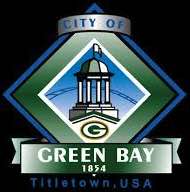
![]()

![]()

TUESDAY, 6 PM
JANUARY 16, 2018
__________________
General Tribal Council
SPECIAL MEETING
Oneida Eye Publisher Leah Sue Dodge’s Petition
was on the Agenda:
Purpose: For GTC to hear a presentation from the law firm of GROSS & KLEIN, LLP about GTC’s options to recover millions of dollars in losses & damages in accordance with the ONWI Constitution, Article IV, Powers of the General Tribal Council, Section 1. (b): “To employ legal counsel, the choice of counsel and fixing of fees,” and for GTC to discuss and vote on retaining GROSS & KLEIN, LLP, which has agreed to represent GTC at a 20% reduced rate.
What’s worse than vexation without explanation?
Exploitation without Representation
______________________________________
GTC must RETAIN a LAW FIRM focused on
TRIBAL, ENVIRONMENTAL & BUSINESS LAW
to RESEARCH, ADVOCATE, and LITIGATE CLAIMS for
LOSSES & DAMAGES due to FRAUD, NEGLIGENCE & ABUSE
______________________________________
The Oneida Business Committee hires non-tribal attorneys.
Oneida Seven Generations Corp. hires non-tribal attorneys.
The Oneida Constitution GUARANTEES General Tribal Council’s RIGHT to hire non-tribal attorneys to protect GTC’s shared interests and to defend GTC against fraud, negligence, abuse, and exploitation.
GTC has long endured a lack of true ‘due diligence’ at several levels: fiscal, corporate, legislative, legal, judicial, and PR / communications.
GTC has risked 100’s of millions of dollars from lack of accountability by tribal corporations and the OBC and Oneida Law Office, as well as outside attorneys whose ‘real clients’ are the OBC & OSGC – not GTC.
GTC has suffered tens of millions of dollars in losses & damages from complex ‘green energy’ fraud schemes, but various culprits are finally now being sued and prosecuted in local, state, and federal courts!
GTC must exercise its CONSTITUTIONAL RIGHT to retain experienced and successful outside representation to research & recommend ways to recover tens of millions of dollars and advise GTC how we can best protect our health, safety, and welfare, and defend GTC against fraud, negligence, abuse, exploitation & corruption … foreign and domestic.
In order to have someone look out for all of us, GTC needs to retain excellent outside legal representation that isn’t related to any of us.
I trust and recommend Attorney Stuart G. Gross.
Leah Sue Dodge, Tribal ID #9705
Publisher, OneidaEye.com
Excerpt:
Potential Service to the GTC
We understand that members of the GTC are concerned regarding events that have occurred in connection with certain Tribe-owned businesses and, more generally, potential malfeasance by Tribal officials, Tribal agents, and others. We are not in a position to render an opinion on the substance of these concerns, at this stage. However, the experience of other tribes strongly supports the conclusion that it is in the interest of the Tribe and its members that such concerns be independently and expeditiously addressed. Unaddressed, such concerns can, at best, lead to deep fissures within a tribe and, at worst, lead to criminal corruption and even violence among members.
As special outside counsel to the GTC, the firm is prepared to conduct an independent, thorough, and impartial investigation into the substance of such concerns, and, if appropriate and requested by the GTC, pursue claims on behalf of the Tribe against any individual or entity determined to have committed violations of federal or state law against the Tribe. The Firm is further prepared to provide the GTC with assistance, as needed, in developing the appropriate internal oversight mechanisms and regulations to ensure that any problems uncovered in the investigation are not repeated in the future.
Under Article IV, Section 1(c) of the Tribe’s constitution, we understand that the GTC is empowered to engage legal counsel on behalf of the Tribe. Accordingly, the GTC would define the scope of the Firm’s representation and would have control over that representation. This includes the decision whether to pursue claims on behalf of the Tribe in federal or state court and against whom such claims would be pursued.
The Tribe is entitled to pursue claims under federal and state law to the same extent as any other entity; Congress has, in fact, specifically provided federal courts with the jurisdiction to hear claims by federally-recognized Indian tribes for violations of federal law. Such claims could, as appropriate, include claims for damages under federal racketeering laws, as well as claims under state law for fraud, professional negligence, and breach of fiduciary duties.
In short, the Firm, as special counsel, would get to the bottom of matters that have eroded the trust of Tribe members in those acting on the Tribe’s behalf and those with whom the Tribe does business. The Firm can further, if instructed by the GTC, pursue appropriate recovery from any individual or entity who is found to have illegally harmed the Tribe, regardless of any position held by the person within the Tribe or at any third party organization.
(CORNING, Calif. – August 14, 2015) A federal judge ruled today that the U.S. District Court, Eastern District of California, has subject matter jurisdiction over a lawsuit filed by the Paskenta Band of Nomlaki Indians under the federal Racketeer Influence and Corruption (RICO) Act and other state and federal laws against former Tribal officials and senior employees accused of defrauding the Tribe of tens of millions of dollars. The court rejected claims by defendants that the Tribe’s lawsuit is an intra-tribal dispute and therefore the Court had no jurisdiction to hear any of the Tribe’s claims.
“We are gratified by the Court’s decision. The Tribe brought this action to hold responsible a group of individuals who, for well over a decade, conspired to steal tens of millions of dollars from the Tribe,” the Paskenta Band of the Nomlaki Indians Tribal Council said in a statement. “That stolen money, much of which the Ringleaders used to pay for a lifestyle of private jet travel, sports cars, and luxury homes, could and should have been used to improve the welfare of the Tribe’s members. The Court’s decision today makes clear that these individuals and others who benefited from their scheme will be held responsible for the harms they caused.”
The Tribe’s co-lead counsel Stuart Gross, of Gross Law P.C., added, “With a single sentence, the Court rejected the argument that this case is an intra-tribal dispute over tribal membership and governance over which the Court lacks jurisdiction. The decision sends a clear message that tribal officials who steal from the tribes they are supposed to serve can and will be held responsible in federal courts. The defendants misleadingly defended their conspiracy to defraud the Tribe through arguing the federal courts had no power to review actions that violate federal and Tribal law. The opposite is true; and we are pleased the Court rejected defendants’ attempt to avoid liability on this basis.”

PREVIOUSLY …
- December 12, 2017
ORDER re: Circuit Rule 33,
U. S. Seventh Circuit Court of Appeals,
Docket No. 17-02341,
ONEIDA NATION of WI-owned
ONEIDA SEVEN GENERATIONS CORP.
& OSGC subsidiary
GREEN BAY RENEWABLE ENERGY, LLC
v.
CITY OF GREEN BAY
Pursuant to Rule 33, Appellant Oneida Seven Generations [Corp.], both counsel and client representatives, and Appellee City of Green Bay, counsel, client, and insurance representatives, are directed to participate in a telephonic mediation conference on Wednesday, December 20 at 12:00 pm Central time to report the status and the timing of the payment of the settlement funds. The Circuit Mediation Office will initiate the call.
- November 14, 2017
ORDER re: Circuit Rule 33,
U.S. Seventh Circuit Court of Appeals Docket No. 17-02341, OSGC & subsidiary GBRE v. City of Green Bay
Pursuant to Circuit Rule 33, all proceedings in this appeal are STAYED pending further court order.
Counsel for the Appellant and Appellee are directed to make a telephonic or electronic mail Status Report to the Circuit Mediation Office by December 13, 2017. This requirement may be satisfied by filing a motion under Fed. R. App. P. 42(b) to dismiss the appeal.
- August 24, 2017 ORDER re: U.S. Seventh Circuit Court Rule 33, Court of Appeals Docket 17–02341, [ONEIDA NATION of WI/ ONWI–owned] Oneida Seven Generations Corp. and OSGC subsidiary Green Bay Renewable Energy, LLC / GBRE v. City of Green Bay
Pursuant to Circuit Rule 33, briefing in this appeal is SUSPENDED pending further court order.
- June 28, 2017 Court Documents for the U.S. 7th Circuit Court of Appeals, 17–02341, ONWI-owned OSGC & GBRE v. City of Green Bay
- June 6, 2017 Decision & Order Granting Motion to Dismiss, U.S. District Court for the Eastern District of WI, 16-CV-1700, ONWI-owned OSGC & GBRE v. City of Green Bay
For the reasons set forth above, the City’s motion to dismiss pursuant to Rule 12(b)(6) for failure to state a claim is granted.
- March 14, 2017 Reply in Support of Defendant’s Motion to Dismiss Plaintiffs’ Complaint, U.S. District Court, Eastern District of WI, 1:16-cv-1700, ONWI-owned OSGC & GBRE v. City of Green Bay
- February 28, 2017 Plaintiffs’ Response in Opposition to Defendant’s Motion to Dismiss the Complaint, U.S. District Court, Eastern District of WI, 1:16-cv-1700, ONWI-owned OSGC & GBRE v. City of Green Bay
- February 7, 2017 Defendant’s Motion to Dismiss Plaintiffs’ Complaint, U.S. District Court, Eastern District of WI, 1:16-cv-1700, ONWI-owned OSGC & GBRE v. City of Green Bay
- December 23, 2016 Complaint & Jury Demand, U.S. District Court, Eastern District of WI, 16-CV-1700, ONWI-owned OSGC & GBRE v. City of Green Bay
- November 18, 2017
Green Bay Press-Gazette:
Letter to the Editor –
Law takes away local control
GREEN BAY – Changes in state law are coming that will take away the ability of cities, villages, towns and counties to have a say in what projects happen in their local communities and backyards.
Senate Bill 378 and Assembly Bill 479, the Homeowner’s Bill of Rights, passed the Legislature in its final days of the session. The bill removes the deliberative process in the issuance of conditional use permits, or CUPs. Under then proposed change, public testimony could no longer be used to deny an applicant. If the applicant meets, or agrees to meet, the criteria of the CUP, the municipality would be required to issue it.
Public input was crucial in proposed projects like the failed Walmart Supercenter in downtown Green Bay or the revocation of the CUP for Oneida Seven Generations Corp.’s planned trash incinerator.
CUPs are designed to be flexible tools for municipalities. Citizens can weigh in and their ideas and concerns can lead to specific conditions for approval within a zoning district. Denials can open municipalities to litigation. However, a local municipality should be able to decide on issuing a CUP, as long as it does not arbitrarily deny a permit or place unreasonable conditions on upon it.
The erosion of local control is not new to state lawmakers. They have already passed nearly 140 new laws that in some way erode the decision-making power of elected or appointed bodies. This needs to end. People power must be restored. I want to be able to say ‘not in my neighborhood.’
– Terry Lee
MEANWHILE . . .
01/05/18 : Green Bay Press-Gazette / USA TODAY
“[Ronald] Van Den Heuvel presents himself as a selfless entrepreneur and philanthropist even today,” [Judge] Griesbach said. “It is a lie. He can’t admit (his role) to himself, his family or this court. He has delayed the proceedings with motions that are frivolous. It tells us he’s still not gotten the message that
what he believes
is a lie.”

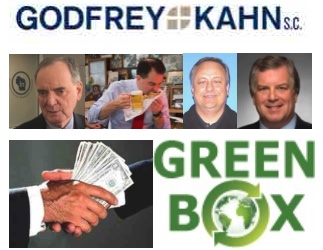
Oneida Eye has previously reported that an owner and an executive of Generation Clean Fuels, LLC [GCF, f/k/a Arland Clean Fuels, LLC / ACF] – Gaylen La Crosse and associate Michael Galich hold a patent for a “waste recycling system” which is supposedly a “portable reactor system for pyrolysis of waste plastic materials.”
Oneida Eye readers have reported that since 1997 Green Box owner Ron Van Den Heuvel and Generation Clean Fuels, LLC part-owner Gaylen La Crosse have been business partners marketing Gaylen La Crosse’s patents for an “apparatus for removal of solid, chemical and bacterial waste from water” and another for a “process for removal of solid, chemical and bacterial waste from water” as evidenced by documents from WI Dept. of Financial Institutions / WDFI regarding two similarly named entities.
On 04/23/97 Ron and Gaylen’s business Aqua 2MG, Inc. was registered w/ WDFI; it was renamed Recovering Aqua Resources, Inc. one month later on 05/23/97, with changes of Registered Agent on 08/18/98, and 08/28/00, and 11/16/04, and 07/12/06, and 05/21/09 to Ron Van Den Heuvel; Dissolved 06/12/12.
- April 23, 1997 Articles of Incorporation for Aqua 2MG, Inc. filed with WDFI; Registered Agent: Atty. C. David Stellpflug of Stellpflug, Janssen, Hall & Hammer, S.C., 325 Reid Street, De Pere, WI 54115; Shares issued: 9,000 (shareholders not listed)
- May 23, 1997 Restated Articles of Incorporation for Aqua 2MG, Inc. changing its name to Recovering Aqua Resources, Inc. [RAR] filed with WDFI
Oneida Eye believes that the two ‘M’s and the ‘G’ in Aqua 2MG stand for:
- Michael Flaherty – ACF / GCF owner;
- Michael Galich – patent holder & ACF / GCF executive;
and - Gaylen La Crosse – patent holder & ACF / GCF owner
On 02/07/01 Recovering Aqua Resources Technologies, Inc. [RARTI] was registered w/ WDFI, with Registered Agent Steven C. Peters and its primary offices at 2079-A Lawrence Dr., De Pere, WI.
- February 7, 2001 Articles of Incorporation for Recovering Aqua Resources Technologies, Inc. filed w/ WDFI
RARTI’s Registered Agent Steven Peters was also part-owner and General Manager of Nature’s Way Tissue Corp., in partnership with Ron Van Den Heuvel, Oneida Seven Generations Corp., and Artley Skenandore Jr., who was made President of the company despite the WI Tax Court’s finding that “Skenandore had no expertise in the paper industry.”
During his PULP & PYROLYSIS ‘GREEN BOX’ PITCH at the April 15, 2014 City of De Pere Common Council Meeting in which Ron asked the City to issue Green Box NA Green Bay, LLC $125,000,000 in tax-exempt industrial development revenue bonds… (the same amount Ron also sought on behalf of Green Box NA Michigan, LLC from Gov. Rick Snyder’s Michigan Strategic Fund, for a total of $250,000,000), Ron stated at the 3 min 7 sec mark:
There’s sixteen of us that work these patents.
At the 4 min 7 sec mark, Ron claims:
The [Green Box] site will have zero wastewater discharge.
- Patents by Inventor Gaylen La Crosse
- Apparatus for removal of solid, chemical and bacterial waste from water
Patent number: 5308480 - Process for removal of solid, chemical and bacterial waste from water
Patent number: 5180499
- Apparatus for removal of solid, chemical and bacterial waste from water
- Patents assigned to ESTR, Inc.
- Aerator and wastewater treatment system
Patent number: 6682057 - UV-enhanced ozone wastewater treatment system
Patent number: 5178755
- Aerator and wastewater treatment system
- 04/11/2011 – Juneau County Star Times:
Sports complex sparks lawsuit
The complaint also alleges that Woodside followed H&K’s recommendation to hire [Midwest]Engineering Services[Inc.] and Environmental Systems Technology & Research [ESTR] to design and install a wastewater treatment system to meet state Department of Natural Resources’ permit requirements.
The suit claims that neither company disclosed that ESTR planned to use a proprietary wastewater system, invented and patented by an ESTR principal, Gaylen LaCrosse, that later failed to meet DNR requirements.
The proprietary system had no track record of approval by state regulators for the planned application and was more expensive than other systems already backed and recommended by the DNR, the complaint alleges.
In addition, the complaint alleges that the companies attempted to hide that the proposed wastewater system had run afoul of DNR regulators and that H&K later incorrectly claimed that the [DNR] had issued the needed permit and that the company had also obtained related loans and grants.
ESTR later allegedly hired Midwest Engineering Services [MES]to assist with obtaining the DNR permit without notifying Woodside, according to the complaint.
The employee MES assigned to the project, Jeffrey Fischer, had previously surrendered his state license to work as a professional geologist after felony fraud convictions related to the state’s Petroleum Environmental Cleanup-up Fund and had no expertise in wastewater systems, the suit claims.
The suit also claims that H&K was negligent in not disclosing that a company executive, Terry Gaouette, had pleaded guilty to falsifying financial records of the Milwaukee Public Museum when he served as a top museum executive.
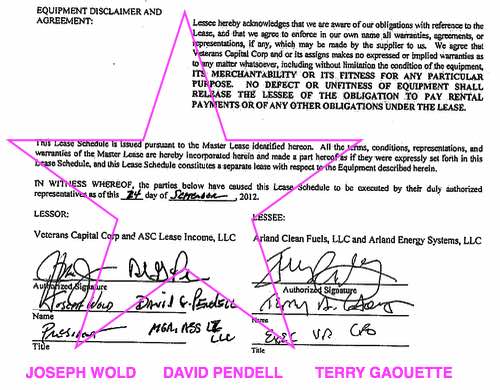
Terry Gaouette was also the signatory
Lessee as Executive VP & CFO of
• Arland Clean Fuels LLC / aka
Generation Clean Fuels LLC, and
• Arland Energy Systems LLC in the
Master Lease Agreement
between ACF / GCF and Naples, FL-based ASC Lease Income LLC and Veterans Capital Corp. of which Joseph E. Wold Jr. is President.
 Veterans Capital Corp. was to lease a
Veterans Capital Corp. was to lease a
“poly conversion liquefaction machine”
that was to be located & operated at
437 South Main Street
CHEBOYGAN, MI 49721
after being manufactured by
Spartan, Inc. of Bakersfield, CA,
of which the President was
ACF / GCF Principal Louis Stern
and its Vice-President Charles Hinson,
co-patent holder with Gaylen La Crosse.
437 South Main Street
CHEBOYGAN, MI 49721
is the business address of Clarence Roznowski‘s
Great Lakes Tissue Co.
- SEE April 3, 2018 USA’s Motion to Amend Defendant Ronald Van Den Heuvel’s Conditions of Release w/ Exhibits, U.S. District Court, Eastern District of Wisconsin, Case No. 17-CR-160, United States of America v. Ronald H. Van Den Heuvel [129 pages] regarding true ownership of that address.

On May 24, 2013 and June 10, 2013 ACF / GCF CEO Louis Stern signed Master Lease & Service Agreements with OSGC CEO / GBRE Chair Kevin Cornelius resulting in ACF / GCF filing a $400 Million lawsuit against the Oneida Nation of Wisconsin which appears to be an extortion racket designed to defraud the ONWI General Tribal Council of MULTIMILLIONS.
To defend their criminal fraud scheme, OSGC & GBRE have engaged in malicious litigation against the City of Green Bay at the behest of OSGC / GBRE counsel and co-conspirators…
GODFREY & KAHN S.C.
According to the September 19, 2017 Complaint in U.S. District Court, Eastern District of Wisconsin, Case No. 17-CV-1261, U.S. Securities and Exchange Commission [SEC] v. Ronald Van Den Heuvel & Green Box NA Detroit LLC:
19. [OSGC associate Ron] Van Den Heuvel touted the Green Box Process as a world-changing technology that allowed 100% reclamation of food-contaminated waste. The Green Box facilities allegedly would recycle food-contaminated waste, such as garbage from fast-food restaurants, cafeterias, concession stands, stadiums, and theme parks. The Green Box Process allegedly would transform post-consumer waste into usable products such as recycled paper napkins, facial tissue, and brown and white paper pulp, as well as fuel pellets that could be used to create synthetic gas, electricity, and biodiesel fuel. He claimed that the Green Box Process would result in total solid waste reclamation with zero wastewater discharge and zero landfill deposits.
20. In reality, the Green Box Process largely became a vehicle for Van Den Heuvel to attract money from investors, and then spend it as he pleased.
The Cliffton Equities Offering
21. Cliffton Equities, Inc. is a Canadian company based in Montreal, Canada. Cliffton Equities manages assets for its principals. Cliffton Equities invested with Van Den Heuvel in 2012 and 2014, and is the victim of his fraud. Cliffton Equities was a signatory on the Loan and Investment Agreement dated
September 20, 2012, as well as an amended agreement in 2014. …
25. Van Den Heuvel told Cliffton’s principals that a certain piece of equipment, known as a pyrolysis or liquefaction unit, was the missing link in the Green Box Process to convert food and plastic waste from the paper pulping process into oil, gas and other useful products.
26. Van Den Heuvel told the principals of Cliffton Equities that he would use its money to purchase and install sorting equipment and a pyrolysis unit made by a particular manufacturer. The principals of Cliffton Equities were attracted by the promises of Van Den Heuvel that he would use their funds to purchase equipment for an eco-friendly manufacturing process.
27. Based on Van Den Heuvel’s representations, Cliffton Equities agreed to invest $2 million in 2012.
28. On or about September 20, 2012, Cliffton Equities entered into a Loan and Investment Agreement (the “Loan and Investment Agreement”) with Green Box Green Bay and EARTH, two entities controlled by Van Den Heuvel. Van Den Heuvel executed the agreement on behalf of Green Box Green Bay and EARTH in his capacity as Chairman. …
35. The Loan and Investment Agreement entitled Cliffton Equities to a share of future profits. The Loan and Investment Agreement provided that Cliffton Equities would receive “one-half of the future income generated from pellet processing liquification pyrolysis units (‘LPPUs’) installed at each of the first four (4) geographic locations constructed in the United States after the date of this Agreement.”

 April 21, 2016 Letter from Wipfli LLP to Attorneys Joe Nicks and Amber Coisman of Godfrey & Kahn regarding Oneida Seven Generations Corp. / OSGC ‘Waste-to-Energy’ Pyrolysis Project
April 21, 2016 Letter from Wipfli LLP to Attorneys Joe Nicks and Amber Coisman of Godfrey & Kahn regarding Oneida Seven Generations Corp. / OSGC ‘Waste-to-Energy’ Pyrolysis Project
Contract with Environmental Systems Technology Research, Inc. (ESTR) for purchase of the oil generated
- 07/20/2015 – Milwaukee Journal Sentinel reported in its physical version:
A Milwaukee Journal Sentinel review found that WEDC failed to run adequate checks and gave two awards worth more than $1.2 million to a financially troubled De Pere businessman who had not disclosed his money problems to the state. Despite those omissions in 2011 and 2012, WEDC kept working with Ron Van Den Heuvel and his ‘clean’ energy company, Green Box, into 2014, state records show.
There is no record so far of WEDC notifying the City of De Pere about the company’s money troubles even though Green Box was working with the city in an unsuccessful attempt to get federally tax-exempt bonds — in part to repay the state’s soured loan. …
Despite the troubles with Green Box, WEDC suggested a company representative go on a May trip to East Africa as recently as March of [2015].
On March 20 — just one day before Van Den Heuvel voiced concern that Green Box hadn’t received more money — Katy Sinnott, the vice president of the Division of International Business Development, wrote in a letter to Green Box’s human resources director that the agency was planning a trade venture to Tanzania and Kenya.
“Your project is extremely exciting and we are proud to have Green Box in Wisconsin making a difference in waste management,” she wrote to Phil Reinhart. “I look forward to hearing more about the next project —
cleaning the seas!”
In other words, it appears that
Ron Van Den Heuvel has been
business partners with at least
two owners & one executive of
ACF Leasing / ACF Services /
Generation Clean Fuels, LLC
for over TWENTY YEARS!



 QUESTION:
QUESTION:
WHAT IS…
OF WHICH RON VAN DEN HEUVEL IS REGISTERED AGENT…
AND WHY DID RON’s WAREHOUSE-RESIDING ‘ATTORNEY’
(WHEN NOT SUSPENDED) TY C. WILLIHNGANZ ORGANIZE IT
ON MAY 24, 2013 [ARTICLES of ORGANIZATION] WITH RON’s
E.A.R.T.H. AS ‘REGISTERED AGENT’ … THE EXACT SAME DAY
ONEIDA SEVEN GENERATIONS CORP. CEO & OSGC SUBSIDIARY
GREEN BAY RENEWABLE ENERGY LLC CEO KEVIN CORNELIUS
SIGNED MASTER LEASE CONTRACTS WITH ACF LEASING LLC,
ACF SERVICES LLC & GENERATION CLEAN FUELS LLC…
FOR OSGC’s ‘PYROLYSIS’ SITES IN MONONA, WISCONSIN…
& IN CHEBOYGAN, MICHIGAN?
- October 18, 2017:
GreatLakesEcho.org / Capital News Service:
Major ‘recycling’ scam in Michigan & Wisconsin sparks indictment
A bogus scheme
to build an eco-friendly
“green energy”
waste processing facility in Detroit defrauded lenders and investors — including Chinese investors hoping to qualify for U.S. visas — of $4,475,000, according to a federal grand jury in Milwaukee. …[Ron] Van Den Heuvel worked through Green Detroit Regional Center, which is owned by a Georgia law firm that is authorized to operate in Wayne, Livingston, St. Claire, Lapeer and Macomb counties.... The center finds “foreign clients, mainly from China and South Korea, to invest in large alternative energy projects,” according to its website.
“Green Detroit Regional Center promoted the EB-5 investments in Green Box Detroit based on Van Den Heuvel’s representations,” the SEC suit said. It said the chief executive officer of the Green Detroit Regional Center, Georgia lawyer Simon Ahn, marketed the project to investors through immigration consultants in China. …
Ahn said, “If the charges are true,
it is completely shocking to learn about the extent that Ron Van Den Heuvel hid the truth from me,” the center and investors.“All of us visited the plants in Wisconsin many times, including the potential site in Detroit, and everything checked out fine. All the financials from a recognized accounting firm indicated that everything was proceeding on track, Ahn said.
The SEC suit said Van Den Heuvel falsely told investors that the MEDC [Michigan Economic Development Corp.] had approved tax exempt bonds for the project. However, the MEDC rejected the request after discovering five tax liens, one construction lien, two state tax warrants, four civil judgments and three civil lawsuits, according to court documents.
- September 20, 2017 U.S. Dept. of Justice Press Release,
De Pere Businessman Indicted for $9 Million Green Energy Fraud
United States Attorney Gregory J. Haanstad, of the Eastern District of Wisconsin announced that the grand jury indicted Ronald Van Den Heuvel (age: 62) of De Pere, on wire fraud and money laundering charges today. The indictment alleges that Van Den Heuvel fraudulently obtained over $9 million in loans and investments for his eco-friendly “Green Box” business plan but diverted much of the funds to his own purposes.
- September 20, 2017 U.S. Securities and Exchange Commission Litigation Release No. 23938, U.S. Securities and Exchange Commission [SEC] v. Ronald Van Den Heuvel, et al., No. 17-cv-1261 (E.D. Wis. filed Sept. 19, 2017), ‘Businessman Charged with Stealing Investor Funds for Packers Tickets’
- September 19, 2017 SEC Complaint, U.S. District Court, Eastern District of Wisconsin, Case No. 17-CV-1261, United States Securities and Exchange Commission [SEC] v. Ronald Van Den Heuvel & Green Box NA Detroit LLC
- September 19, 2017 Indictment for Wire Fraud & Money Laundering, U.S. District Court, Eastern District of WI, Case No. 17-CR-160, United States of America v. Ronald H. Van Den Heuvel
INDICTMENT
THE GRAND JURY CHARGES:
1. Beginning at by March 8, 2011, and continuing at least through August 2015 in the State and Eastern District of Wisconsin and elsewhere,
RONALD H. VAN DEN HEUVEL
knowingly devised and participated in a scheme to defraud lenders and investors, and to obtain money from lenders and investors by means of materially false and fraudulent pretenses, representations, and promises related to his “Green Box” business plan, which scheme is more fully described below.
2. As a result of his scheme, Van Den Heuvel fraudulently obtained more than $9,000,000 from a range of lenders and investors, including individual acquaintances, the Wisconsin Economic Development Corporation (“WEDC”), a Canadian institutional investor, and Chinese investors who participated in the EB-5 immigrant investor program. …
- September 19, 2017 Complaint, U.S. District Court, Eastern District of WI, Case No. 17-CV-1261, U.S. Securities and Exchange Commission [SEC] v. Ron Van Den Heuvel & Green Box NA Detroit LLC
COMPLAINT
The United States Securities and Exchange Commission alleges as follows: Nature of the Action
Nature of the Action
1. This case involves misrepresentations and the misappropriation of millions of dollars of investor funds by defendant Ronald Van Den Heuvel. He took advantage of investors who believed that they were investing in a new way to recycle post-consumer waste.
2. Van Den Heuvel lured investors with promises that he would use their funds for an eco-friendly recycling process called the Green Box Process. He claimed that the Green Box Process would take food-contaminated waste and convert it into usable products, such as recycled paper. Van Den Heuvel represented that he would use investor funds to buy equipment, open a Green Box facility, and ultimately help to create a green solution for post-consumer waste.
3. In reality, Van Den Heuvel misappropriated a substantial percentage of the funds contributed by investors. Instead of using investor funds to implement the Green Box Process, Van Den Heuvel used a significant portion of their investments for improper purposes, such as a Cadillac Escalade, payments to his ex-wife, overdue taxes, Green Bay Packers tickets, and cash for himself.
4. Van Den Heuvel took advantage of foreign investors who put their trust in him. In particular, in 2012 and 2014, Van Den Heuvel raised over $3 million from a Canadian asset management firm named Cliffton Equities. Van Den Heuvel promised to use its investment to buy and operate specific pieces of equipment, but in reality, he spent the money as he pleased.
5. Van Den Heuvel also exploited investors from China. Between 2014 and 2015, Van Den Heuvel and his company (Green Box NA Detroit, LLC) raised approximately $4,475,000 in investment proceeds from at least nine investors from China. The investors made their investments through the EB-5 immigrant investor program, which is a U.S. government immigration program for foreign nationals seeking permanent U.S. residency.
[CLICK HERE to see Ron’s fraudulent
GREEN BOX NA DETROIT brochure]
6. Van Den Heuvel promised to use the funds from the EB-5 investors from China to develop a Green Box facility in Michigan. In reality, Van Den Heuvel misappropriated millions of dollars, using investor funds to pay unrelated business and personal expenses.
7. Van Den Heuvel made other misrepresentations about the Green Box Process in order to attract funds from investors. He touted a relationship with Cargill and the ability to use a key additive when, in reality, Cargill had terminated the relationship and sued his company. He claimed that tax-exempt bonds would provide approximately $95 million to $125 million in financing when, in reality, he knew that the State of Michigan had all but denied the application. He represented that his company held seven patents when, in reality, it held only one. He also told different investors that their funds had purchased the same pieces of equipment.
8. Based on Van Den Heuvel’s representations, the investors believed that they were investing in a new, environmentally-friendly project to recycle waste. In reality, they unwittingly provided the financing for Van Den Heuvel’s improper spending spree. …
- October 4, 2017 Ronald H. Van Den Heuvel Plea Agreement, U.S. District Court, Eastern District of WI, Docket No. 16-CR-64, USA v. Ron Van Den Heuvel, Paul Piikkila & Kelly Van Den Heuvel
- GUILTY – October 10, 2017 Change of Plea Hearing Minutes, U.S. District Court, Eastern District of Wisconsin, Docket No. 16-CR-64, USA v. Ron Van Den Heuvel, Paul Piikkila & Kelly Van Den Heuvel
- October 10, 2017 Minute Entry for Arraignment Proceedings, U.S. District Court, Eastern District of Wisconsin, Case No. 17-CR-160, USA v. Ron Van Den Heuvel
- October 10, 2017 Order Setting Conditions of Release. U.S. District Court, Eastern District of WI, Case No. 17-CR-160, USA v. Ronald H. Van Den Heuvel
- October 31, 2017 Clerk’s Entry of DEFAULT as to Green Box NA Detroit LLC, U.S. District Court, Eastern District of WI, Case No. 17-CV-1261, SEC v. Ron Van Den Heuvel & Green Box NA Detroit LLC
- October 31, 2017 DEFAULT JUDGMENT against Tissue Technology LLC and Ron Van Den Heuvel – $4,475,686.80 – Brown Co. Case No. 16CV1137, Daniel J. Platkowski v. Ron Van Den Heuvel; Howard Bedford [rep’d by Godfrey & Kahn]; Tissue Technology LLC; Glen Arbor LLC; Quotient Partners [dismissed defendants: GlenArbor Equipment LLC; Reclamation Technology Systems LLC; Stonehill Converting LLC; Horicon Bank]
- October 30, 2017 SEC’s Request for Clerk’s Entry of Default Against Green Box NA Detroit LLC, U.S. District Court, Eastern District of Wisconsin, Case No. 17-CV-1261, SEC v. Ron Van Den Heuvel & Green Box NA Detroit LLC
- November 1, 2017 Court Minutes & Order, U.S. Bankruptcy Court, WI Eastern District Docket No. 16-24179, Chapter 11, Green Box NA Green Bay LLC
- AUDIO – November 1, 2017, 10:07 A.M. Hearing re: Paper Holdco’s Motion to Dismiss and Ability Insurance Company’s Motion for Relief from Stay and/or Motion to Dismiss [Run Time 00:38:59], U.S. Bankruptcy Court, WI Eastern District, 16–24179, Chapter 11, Green Box NA Green Bay, LLC
- November 9, 2017 Defendant Ronald Van Den Heuvel’s Motion to Stay Civil Proceedings Pending Resolution of Criminal Proceedings, U.S. District Court, Eastern District of WI, Case No. 17-CV-1261, SEC v. Ron Van Den Heuvel & Green Box NA Detroit LLC
- November 20, 2017 WEDC’s Brief in Support of Conversion to Chapter 7, U.S. Bankruptcy Court, WI Eastern District, 16–24179, Chapter 11, Green Box NA Green Bay LLC
• November 20, 2017 Affidavit of Atty. Brian P. Thill for WEDC
• November 20, 2017 Affidavit of Brian Nowicki, CFO of WEDC
WISCONSIN ECONOMIC DEVELOPMENT CORPORATION’S BRIEF IN SUPPORT OF CONVERSION TO CHAPTER 7
Wisconsin Economic Development Corporation (“WEDC”), a creditor and party-in- interest, in support of conversion of this case to Chapter 7, rather than dismissal, respectfully represents to and requests from the Court as follows:
INTRODUCTION
WEDC has been asked to provide specific facts demonstrating the basis for one or more claims or assets, including fraudulent transfer claims, that may be owned by the Debtor, Green Box NA Green Bay, LLC (“Debtor”), as of the date of the filing of this case on April 27, 2016, and administered by a hypothetical Chapter 7 trustee for the benefit of creditors. As more particularly described below, these facts consist of, for example:
• The marked difference between the Debtor’s previously-disclosed assets and the Debtor’s currently-disclosed assets;
• The undercapitalization of the Debtor, combined with the commingling of assets between the Debtor and several related entities, and common management of the Debtor and the same related entities; and
![]() • The Debtor’s management, which: (a) previously included a Chairman, Ronald Van Den Heuvel (“RVDH”), now both guilty and federally indicted in two separate cases, the latter of which directly implicates his actions occurring during his management of the Debtor in this case; (b) currently necessarily admits a lack of understanding of certain relevant pre-petition transactions; and (c) for the purposes of this case, is a new Manager, Stephen Smith (“Smith”), who is also the President and CEO of GlenArbor Capital, a major creditor of the Debtor.
• The Debtor’s management, which: (a) previously included a Chairman, Ronald Van Den Heuvel (“RVDH”), now both guilty and federally indicted in two separate cases, the latter of which directly implicates his actions occurring during his management of the Debtor in this case; (b) currently necessarily admits a lack of understanding of certain relevant pre-petition transactions; and (c) for the purposes of this case, is a new Manager, Stephen Smith (“Smith”), who is also the President and CEO of GlenArbor Capital, a major creditor of the Debtor.
Any one of these categories of facts would be sufficient to compel the conversion of this case to Chapter 7.
ARGUMENT
I. THE DEBTOR’S PRE-PETITION AND POST-PETITION DISCLOSURES DEMOSTRATE THE TRANSFER, MISCHARACTERIZATION, AND/OR NON- DISCLOSURE OF NUMEROUS VALUABLE ASSETS.
Attached to the Affidavit of Brian Nowicki filed herewith are three documents. The first attached document, a Balance Sheet for the Debtor as of June 30, 2014, for example, shows:
1. Patents & Intellectual Property —not just licensed to the Debtor, but owned by the Debtor;
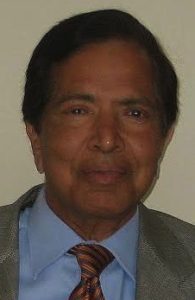
![]() 2. Ownership of a “TAK Case”, or Case No. 14-CV-01203-WGC (E.D. Wis.), Tissue Technology LLC, Partners Concepts Development Inc, Oconto Falls Tissue & Tissue Products Technology Corp v. TAK Investments LLC & Sharad Tak (trial held September 18, 2017 and September 19, 2017, and pending decision following post-trial briefing)l
2. Ownership of a “TAK Case”, or Case No. 14-CV-01203-WGC (E.D. Wis.), Tissue Technology LLC, Partners Concepts Development Inc, Oconto Falls Tissue & Tissue Products Technology Corp v. TAK Investments LLC & Sharad Tak (trial held September 18, 2017 and September 19, 2017, and pending decision following post-trial briefing)l
3. Ownership of 50% of “WFRT”, an unknown company or asset; and …
4. Ownership of 60% of “PCDI”, or Partners Concepts Development, Inc. (see Nowicki Aff., Ex. N-1).
[NOTE: Oneida Eye believes “WFRT” is actually
Waste Tire Recovery Technology, LLC
Registered Agent – E.A.R.T.H. LLC;
reg’d in Wisconsin 12/29/09 –
– f/k/a Waste Fibre Recovery Technology, LLC
– f/k/a Waste Fibre Recovery, LLC
Different than Waste Fiber Technology, Inc.
… & Waste Poly Recovery Technology, LLC
– f/k/a Waste Material Recovery Technology, LLC
… & Waste Liquid Recovery Technology, LLC
… & Military Waste Recovery Technology, LLC
– f/k/a PC Material Technology, LLC]
None of these assets or interests appear on the Debtor’s Petition, Schedules, or Statement of Financial Affairs filed in this case (see Docket 14).
The second document attached to the Affidavit of Brian Nowicki is a flowchart of the Debtor’s alleged parent company, E.A.R.T.H.
[NOTE: Environmental Advanced Reclamation Technology HQ, LLC
– f/k/a/NATURE’S CHOICE TISSUE CORP.
– n/k/a Reclamation Technology Systems, LLC
Registered Agent: GlenArbor, LLC;
Registered Agent Office: 2107 American Blvd. De Pere, WI
Different than, but related to
NATURE’S WAY TISSUE CORP.
Registered Agent: Artley Skenandore, Jr.
Registered Agent Office: 2107 American Blvd. De Pere, WI]
… (see Nowicki Aff., Ex. N-2).This document, among other things:
1. Confirms the Debtor’s 60% ownership in PCDI; and
2. Further claims the Debtor’s 60% ownership in Patriot Tissue, LLC.
Neither asset or interest is disclosed in Debtor’s Petition, Schedules, or Statement of Financial Affairs filed herein (see Docket 14).
The importance of the Patriot Tissue, LLC ownership is demonstrated by the third document attached to the Affidavit of Brian Nowicki – Patriot Tissue, LLC’s Balance Sheet as of December 31, 2014 (see Nowicki Aff., Ex. N-3). As evidenced by its Balance Sheet, Patriot Tissue was or is not a minor company. It had combined assets of over $17 million.
This case should be converted to Chapter 7, if nothing else to investigate the additional assets the Debtor claimed to own within the two (2) years of the filing of this case and have somehow since disappeared.
II. THE DEBTOR IS THE ALTER EGO OF ONE OR MORE RELATED COMPANIES.
Whether an entity is the alter ego of another requires examination of the three (3) factors outlined by the Supreme Court of Wisconsin in Consumers Co-Op of Walworth County v. Olsen. See 142 Wis. 2d 465, 484, 419 N.W.2d 211 (1988). Those factors are:
1. Control, not mere majority or complete stock control, but complete domination, not only of finances but of policy and business practice in respect to the transaction attacked so that the corporate entity as to this transaction had at the time no separate mind, will or existence of its own;
2. Such control must have been used by the defendant to commit fraud or wrong, to perpetrate the violation of a statutory or other positive legal duty, or dishonest and unjust act in contravention of plaintiff’s legal rights; and
3. The aforesaid control and breach of duty must proximately cause the injury or unjust loss complained of.
Consumers Co-Op, 142 Wis. 2d at 484 (citation omitted).
In this instance, the Debtor testified at least two times through RVDH prior to the filing of this case. On the first occasion, RVDH testified regarding an equipment list that combined the assets of not less than ten (10) RVDH-related companies (see Thill Aff., Ex. T- 3). According to RVDH, “We create this list daily. . . . Every time we move or sell equipment, the list changes” (see id., Ex. T-1 at 13:9 & 11-12). When asked who has used the equipment, RVDH testified, “All four of those entities [PCDI, Green Box NA Green Bay, TPTC, and now Eco Hub {EcoHub Wisconsin LLC / Green Box Wisconsin LLC / Green Box Wisconsin OP LLC}]” (see id., Ex. T-1 at 26). Indeed, employees of the Debtor itself operated and maintained machines allegedly owned by E.A.R.T.H. for not just E.A.R.T.H, but “For Glen Arbor or Quotient . . . or RVDH” (see id., Ex. T-1 at 57-58). Even the payments for the Debtor’s Utica leases were paid by five different entities – PCDI, Green Box NA Green Bay, TPTC, Eco Hub [EcoHub Wisconsin], and RVDH Development (see id., Ex. T-1 at 30-31).
This is because for the Debtor [Green Box NA Green Bay LLC], an alleged $277 million company, “There was only one bank account, ever” (see id., Ex. T-1 at 27:24). When pressed about current location and ownership of equipment, RVDH refused to answer and stated, “I have criminal investigations you’re well aware of, and I am not going to go into every company and where everything is owned today . . . ” (see id., Ex. T-1 at 43:16-18).
Just two (2) days after giving the above testimony, RVDH pled the Fifth Amendment to virtually every question asked, including the following:
• Being an officer, director, or manager of the Debtor and numerous related entities (see id., Ex. T-2 at 124-126);
• Removing two (2) computers containing information regarding the Debtor from his possession (see id., Ex. T-2 at 126-127);
• Having no documents to confirm the ownership or liens listed on the joint equipment spreadsheet (see id., Ex. T-2 at 127);
• Transferring a Kool unit out of state without the receiver’s permission (see id., Ex. T-2 at 129);
• Making payments to insiders (see id.); and
• Insufficiently capitalizing the Debtor (see id., Ex. T-2 at 164-165).
All of the answers to these questions entitle WEDC to an adverse inference. See Baxter v. Palmigiano, 425 U.S. 308, 318, 96 S. Ct. 1551 (1976).
Whether the Debtor is entitled to property of one or more other RVDH-related entities must be examined [by] a Chapter 7 trustee.
III. THE DEBTOR’S PRE-PETITION ACTIVITIES ARE CLOUDED BY ACTUAL OR ALLEGED CRIMINAL ACTIVITY, LACK OF KNOWLEDGE, AND/OR INHERENT CONFLICTS OF INTEREST.
There is a large void in pre-petition information and documentation available to both the Debtor’s current management and its attorneys. This has occurred for several reasons. First, it has long been established in this case that the Debtor was previously chaired by RVDH, a man who has now pled guilty to conspiracy to commit bank fraud (see Thill Aff., Ex. T-5), and is further charged with more than a dozen counts of wire fraud and unlawful financial transactions involving the Debtor in this case (Docket 330, Ex.). Second, even at the point of the Debtor’s plan confirmation, “A substantial portion of the important documents have yet to be returned” (Docket 182:14). Third, Mr. Kolasinski did not join the Debtor until late 2015 (Docket 182:22). Fourth, the Debtor’s current Manager, Smith, did not assume that position until April of 2016 at the earliest (Docket 182:12). Accordingly, neither the current attorneys nor management of the Debtor can hardly state with any certainty what exactly the Debtor and/or RVDH did or did not do in the months or years leading up to the filing of this bankruptcy case. Of course those transactions are precisely what a Chapter 7 trustee is charged to investigate.
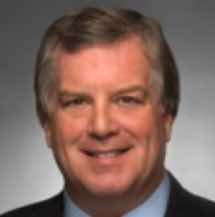 Additionally, Smith is of course both the current Manager of the Debtor and a principal of GlenArbor Capital, “a significant investor in the project prior to Fall 2015” (Docket 182:10 & 21). This relationship is on its face a conflict. However, outside of the facial conflict, “Indeed, [Ron Van Den Heuvel] relied on the advice of GlenArbor as an investor in moving the project forward . . .” (Docket 182:10). Creditors and a neutral third party are entitled to know exactly what advice GlenArbor provided and what occurred as a result. To the extent the Debtor has any claims against GlenArbor and GlenArbor is ostensibly left in charge of the Debtor, it is highly questionable whether those claims would ever be prosecuted, much less reviewed or even considered. These claims would also be assets of the bankruptcy estate as of the date this case was filed.
Additionally, Smith is of course both the current Manager of the Debtor and a principal of GlenArbor Capital, “a significant investor in the project prior to Fall 2015” (Docket 182:10 & 21). This relationship is on its face a conflict. However, outside of the facial conflict, “Indeed, [Ron Van Den Heuvel] relied on the advice of GlenArbor as an investor in moving the project forward . . .” (Docket 182:10). Creditors and a neutral third party are entitled to know exactly what advice GlenArbor provided and what occurred as a result. To the extent the Debtor has any claims against GlenArbor and GlenArbor is ostensibly left in charge of the Debtor, it is highly questionable whether those claims would ever be prosecuted, much less reviewed or even considered. These claims would also be assets of the bankruptcy estate as of the date this case was filed.
SUMMARY
This case should be converted to one under Chapter 7 of the Bankruptcy Code to allow a Chapter 7 Trustee the opportunity to pursue any claims of the Debtor. A Chapter 7 Trustee will have significant guidance in doing so. The above facts recounted by WEDC in this Brief are specific, multiple, and real. They are not fictional or abstract.
CONCLUSION
WHEREFORE, WEDC, for the reasons stated herein and on or to be on the record, respectfully requests the Court convert this matter to a case under Chapter 7 of the Bankruptcy Code, and grant WEDC the relief requested herein any other relief in this matter deemed fair and/or equitable, including but not limited to its attorneys’ fees and costs.
MURPHY DESMOND S.C.
Attorneys for Wisconsin Economic
Development Corporation
By: Brian P. Thill,
Wisconsin State Bar No. 1039088
- November 21, 2017 Order Clarifying Scheduling Order, U.S. Bankruptcy Court, Wisconsin Eastern District Docket No. 16–24179, Chapter 11, Green Box NA Green Bay LLC
…Responses by any parties advocating dismissal rather than conversion must be filed by December 4, 2017.
…Reply briefs by WEDC and Paper Holdco must be filed by December 11, 2017.
- November 29, 2017 Debtor’s Response to WEDC’s Brief in Support of Motion to Convert to Chapter 7, U.S. Bankruptcy Court, Wisconsin Eastern District Docket No. 16–24179, Chapter 11, Green Box NA Green Bay LLC
In the holiday spirit, the Debtor is willing to make a gift to WEDC by way of requesting dismissal. If the Court dismisses this case, WEDC and the State of Wisconsin will be free to pursue any claims it has from anyone it believes is liable to them. It will then be paid before Debtor’s counsel and other administrative expenses. In other words, if WEDC believes there are significant assets or claims, it is free to use its own resources. If its hunches are correct, it will benefit by being paid before all other creditors. Such a result would benefit WEDC and Wisconsin’s tax payers.

 November 28, 2017 United States’ Memorandum in Support of Motion to Intervene and Stay Civil Proceedings, U.S. District Court, Eastern District of Wisconsin, Case No. 17-CV-1261, United States Securities & Exchange Commission [SEC] v. Ronald Van Den Heuvel and Green Box NA Detroit LLC
November 28, 2017 United States’ Memorandum in Support of Motion to Intervene and Stay Civil Proceedings, U.S. District Court, Eastern District of Wisconsin, Case No. 17-CV-1261, United States Securities & Exchange Commission [SEC] v. Ronald Van Den Heuvel and Green Box NA Detroit LLC
On September 19, 2017, the plaintiff in this case, the Securities and Exchange Commission (“SEC”), filed a complaint alleging that Ronald Van Den Heuvel and Green Box NA Detroit LLC (“Green Box Detroit”) violated the antifraud provisions of the federal securities laws by engaging in fraudulent conduct relating to the offer or sale of securities. … Also on September 19, 2017, a federal grand jury in the Eastern District of Wisconsin returned an indictment charging Van Den Heuvel with multiple counts of wire fraud and money laundering based upon his fraudulent conduct in obtaining money from investors and lenders on behalf of Green Box Detroit and other related companies. See United States v. Van Den Heuvel, 17-CR-160 (E.D. Wis. Sept. 19, 2017).
The SEC’s complaint and the criminal indictment involve the same defendant, as well as overlapping facts and law. Specifically, according to both the SEC’s complaint and the criminal indictment, Van Den Heuvel obtained funds from investors and lenders with promises that he would use their money for an eco-friendly recycling process called the Green Box Process. Van Den Heuvel formed and controlled numerous business entities that, he claimed, were furthering the Green Box Process, including Green Box Detroit, Green Box NA LLC, and Green Box NA Green Bay LLC. Van Den Heuvel represented to investors and lenders that their funds would promote the Green Box Process through these corporate entities. In reality, according to both the SEC’s complaint and the criminal indictment, Van Den Heuvel misappropriated a substantial percentage of the funds contributed by investors and lenders. Instead of using his victims’ funds to implement the Green Box Process, Van Den Heuvel used a significant portion of their money for improper purposes, such as a Cadillac Escalade and Green Bay Packers tickets.
The SEC’s complaint and the criminal indictment identify numerous specific victims of Van Den Heuvel’s fraud. Some of the same victims are identified in both cases – specifically, Cliffton Equities, a private investment firm located in Canada, and multiple foreign persons who invested through the EB-5 visa program. The SEC’s complaint and the criminal indictment also identify numerous specific misrepresentations made by Van Den Heuvel in the process of obtaining these victims’ funds. Again, some of those misrepresentations overlap; in both cases, for example, it is alleged that Van Den Heuvel lied to investors about his business relationship with Cargill, about his ability to obtain tax-exempt bonds to fund Green Box Detroit, and about how he would use the money he obtained from investors and lenders. Van Den Heuvel has not filed an answer to the SEC’s complaint and has instead moved to stay proceedings in this case. … The parties have not yet engaged in discovery. The United States now seeks to intervene in this civil proceeding in order to seek a stay of discovery pending resolution of the criminal case. The SEC does not oppose this motion.


 November 30, 2017 Order Granting USA’s Motion to Intervene & Stay Civil Proceedings, U.S. District Court, Eastern District of Wisconsin, Case No. 17-CV-1261, U. S. Securities & Exchange Commission [SEC] v. Ronald Van Den Heuvel and Green Box NA Detroit LLC
November 30, 2017 Order Granting USA’s Motion to Intervene & Stay Civil Proceedings, U.S. District Court, Eastern District of Wisconsin, Case No. 17-CV-1261, U. S. Securities & Exchange Commission [SEC] v. Ronald Van Den Heuvel and Green Box NA Detroit LLC
The motion for stay is granted based on the representation that the SEC does not oppose the motion and Van den Heuvel has in fact filed his own motion for a stay. The United States is permitted to intervene in this civil case, and discovery in this case is stayed until the resolution of the related and recently indicted criminal case.
- December 11, 2017 WEDC’s Reply Brief in Support of Conversion to Chapter 7, U.S. Bankruptcy Court, Wisconsin Eastern District Docket No. 16–24179, Chapter 11, Green Box NA Green Bay LLC
Prior to the filing of this case, Green Box was for all practical purposes [Ron Van Den Heuvel], both in management and ownership, whether in whole or in part…. RVDH was not a low-level employee or former employee. He was an executive, a current and actively-involved executive…. As the fortunes of the Debtor went, so did the fortunes of RVDH … (see Docket … confirming RVDH’s continued retention of equity interest). At the time of the filing of this case, a bench warrant had been signed for RVDH’s arrest for physically transferring one or more of Debtor’s assets to another state…. Yet, as pointed out by even the Debtor’s successor leadership team, the filing of this case had the objective effect of not only staying creditors in the prior Chapter 128 action, but also staying the bench warrant against RVDH individually…. The Debtor and RVDH each benefited from the: (1) delay created by RVDH’s pre-petition silence; and (2) filing of this bankruptcy case. The interests of [Green Box] and RVDH clearly aligned.
Nor is the fact that that RVDH is not talking now a basis to deny conversion to chapter 7…. Nearly ninety-five years ago, Justice Louis Brandeis observed just the exact opposite, “Silence is often evidence of the most persuasive character.” Bilokumsky v. Tod… (1923). To the extent RVDH is no longer talking, that serves as all the more reason to convert, not dismiss.
The appointment of “Mike Polsky, one of the most prominent and successful receivers in Wisconsin” … does not serve as some sort of consolation to WEDC and other creditors. First, nowhere does the Debtor cite with any factual support what Mr. Polsky actually did or did not do prior to the filing of this case…. The fact that WEDC, a co-plaintiff to the Chapter 128 proceeding who sought to get Mr. Polsky appointed in that action…, now prefers conversion of this case over dismissal should speak volumes. Even Ability concedes, “Unfortunately, the information obtained by the Receiver was shoddy, at best….” Notably, the expansive reach of the United States Bankruptcy Court is far greater than the limited jurisdiction of the State of Wisconsin Brown County Circuit Court. Compare, e.g., 28 U.S.C. § 157, with Wis. Stat. § 801.05. That is not an immaterial detail, particularly given RVDH’s physical transfer of at least one asset over state lines…. WEDC is in a far better position than either the Debtor or Ability to determine what is in the best interest of WEDC.
Nor is the potential nominal inconvenience to Debtor’s counsel a reason to deny conversion…. Debtor’s counsel has already invested nearly 360 hours in this case…. Yet the greatest fear now is apparently that there will be “at least one 341 meeting”…. The Debtor’s attorneys are already versed in the Debtor’s affairs. None of the Debtor’s fee applications have ever been objected to…. In other words, the relative amount of time required to complete this case and collect fees should pale in comparison to the steps the Debtor has taken thus far. Conversely, the amount of machinations WEDC and other creditors have been forced to endure to-date, both in the Chapter 128 action … and this case, should not be ignored. Quite simply, WEDC does not ask for comparatively much when it makes its conversion request to investigate matters which both the Receiver and Debtor have failed to address, for whatever reason, for a period of now multiple years. “[W]hile the Bankruptcy Code is indeed a code of debtors’ rights …, it is equally a code of creditors’ remedies.” United States v. Frontone….
CONCLUSION
WHEREFORE, WEDC, for the reasons stated herein and on or to be on the record, respectfully requests the Court convert this matter to a case under Chapter 7 of the Bankruptcy Code, and grant WEDC the relief requested herein any other relief in this matter deemed fair and/or equitable, including but not limited to its attorneys’ fees and costs.
- December 27, 2017 Opinion and Order Granting Ability Insurance Company’s Motion to Dismiss, U.S. Bankruptcy Court, Wisconsin Eastern District Docket No. 16–24179, Chapter 11, Green Box NA Green Bay LLC
- December 27, 2017 Ron Van Den Heuvel’s Motion to Adjourn Sentencing, U.S. District Court, Eastern District of Wisconsin, Case No. 17-CR-160, United States of America v. Ronald H. Van Den Heuvel
- December 27, 2017 United States’ Opposition to Motion to Adjourn Sentencing, U.S. District Court, Eastern District of Wisconsin, Case No. 17-CR-160, United States of America v. Ronald H. Van Den Heuvel
- December 28, 2017 Order Denying Defendant Ron Van Den Heuvel’s Motion to Adjourn Sentencing, U.S. District Court, Eastern District of Wisconsin, Case No. 16-CR-64, United States of America v. Ronald H. Van Den Heuvel
- December 28, 2017 Defendant Ron Van Den Heuvel’s Sentencing Memorandum, U.S. District Court, Eastern District of Wisconsin, Case No. 16-CR-64, United States of America v. Ronald H. Van Den Heuvel
![]()
- January 2, 2018 Ron Van Den Heuvel’s Motion to Vacate Plea, U.S. District Court, Eastern District of Wisconsin, Case No. 16-CR-64, United States of America v. Ronald H. Van Den Heuvel
- January 2, 2018 Ron Van Den Heuvel’s Memorandum in Support of Motion to Vacate Plea, U.S. District Court, Eastern District of Wisconsin, Case No. 16-CR-64, United States of America v. Ronald H. Van Den Heuvel
01/02/18 : WLUK – Ron Van Den Heuvel wants to withdraw guilty plea in bank fraud case
After two motions to delay the sentencing were denied by Judge William Griesbach, Van Den Heuvel’s attorney filed a motion Tuesday to withdraw his plea, and requested a hearing. …
At the October plea hearing … Van Den Heuvel was … admonished by Judge Griesbach at one point, who told Van Den Heuvel that if the guilty plea was accepted, he couldn’t later argue he was innocent.
- January 2, 2018 Declaration of FDIC Special Agent Sara Hagar w/ Exhibits A–C, U.S. District Court, Eastern District of Wisconsin, Case No. 16-CR-64, United States of America v. Ronald H. Van Den Heuvel
- January 2, 2018 United States’ Sentencing Memorandum, U.S. District Court, Eastern District of Wisconsin, Case No. 16-CR-64, United States of America v. Ronald H. Van Den Heuvel
First, [Ron] Van Den Heuvel’s offense was highly planned and elaborately deceitful. Van Den Heuvel was a sophisticated actor who knew how banks operate, having formed numerous business entities, obtained loans from various banks, and even served on the board of directors for a bank. …
Second, the size, scope, and complexity of Van Den Heuvel’s offense compels significant consequences. Through the use of straw borrowers, Van Den Heuvel obtained no fewer than nine additional loans, totaling over $1 million. … And, Van Den Heuvel went to considerable lengths to conceal that he was actually behind the loans. … This was a long-term, calculated scheme to deceive the bank.
Third, Van Den Heuvel repeatedly manipulated and abused the trust of vulnerable people in his life. Van Den Heuvel put forward not only his business associate Steve Peters and family friend William Bain to obtain loans from Horicon Bank. Van Den Heuvel also took advantage of Julie Gumban, the nanny for his children. … As a live-in nanny, Gumban was dependent upon the Van Den Heuvels for food, shelter, and wages. … The Van Den Heuvels exploited Gumban’s vulnerable position by using her credit cards and convincing her to take out a loan at Horicon Bank. … Van Den Heuvel also roped in his administrative assistant Deb Stary, a subordinate who likely felt compelled to follow her boss’s orders. … And Van Den Heuvel involved his wife, who helped secure two loans for KYHKJG, LLC, and the loan to Gumban, and as a result, was indicted as a co-conspirator. … That was not the last time Van Den Heuvel would enlist his family in fraud. In 2013, Van Den Heuvel offered a job to his son-in- law [Patrick Hoffman] but did not pay him for several months of work. … Van Den Heuvel then convinced his son-in-law to approach several banks with forged pay stubs, which falsely inflated his salary, to seek loans on Van Den Heuvel’s behalf. … Van Den Heuvel’s claim to be a selfless family man simply does not match reality.
Fourth, contrary to Van Den Heuvel’s claim to be driven by “a desire to create and/or maintain functioning corporations,” his offense was driven by greed. Witnesses consistently described the Van Den Heuvels as living a high-end lifestyle that included:
• A riverfront, five-bedroom residence worth at least $1.9 million
• A second home in Florida
• Luxury automobiles, such as two Cadillac Escalades
• A live-in nanny
• Private schools for their children
• Country club memberships
• Frequent dining at expensive restaurants
• Annual trips to Las Vegas
• A private jetThe Van Den Heuvels lived that life even as his businesses failed to generate any significant income. … Earlier in his career, Van Den Heuvel may well have been a successful businessman, able to support that life and engage in philanthropy. Tellingly, most of the charitable efforts Van Den Heuvel cites date from the 1990s. … But by the mid-2000s, Van Den Heuvel’s fortunes had changed, and he was not generating much income. … Rather than scale back his expenses, Van Den Heuvel sought to maintain the image by borrowing money. To keep just ahead of creditors, he kept on borrowing and then pressed others to borrow for him. All the while, Van Den Heuvel continued living far beyond his means, projecting a false image of success and philanthropy. For example, Van Den Heuvel cites his work for the March of Dimes. … Although that service is admirable, at least one of Van Den Heuvel’s contributions to the March of Dimes came from investors’ funds that he represented would be used to promote his Green Box business plan. See Sara Hager Declaration (Jan. 2, 2018). Thus, Van Den Heuvel’s offense was quite like a Ponzi scheme, seeking loan after loan to maintain a mirage of success.
Finally, this offense is especially serious because it targeted a federally insured financial institution. … Congress … provided stiffer sentences for frauds that affect financial institutions. … Van Den Heuvel has thus made a practice of manipulating financial institutions for his personal gain. This makes Van Den Heuvel’s fraud more serious than frauds against other types of victims. If anything, criminal history category I understates Van Den Heuvel’s criminality. … Many other offenders in criminal history category I are first-time offenders who engaged in a one-off offense. That description does not remotely fit Van Den Heuvel. Thus, the Court should consider that Van Den Heuvel has a long history of manipulating others for his personal gain. …
The need for both specific and general deterrence also supports a term of imprisonment. Van Den Heuvel has shown a disturbing, serial pattern of manipulating others over a long period of years. As noted, several years after the Horicon Bank fraud scheme, Van Den Heuvel attempted to defraud other banks through his son-in-law [Patrick Hoffman]. … A period of incarceration is appropriate to prevent Van Den Heuvel from engaging in fraud and to send him a message that such conduct results in real consequences. Likewise, a significant sentence is necessary to deter others in the community who would be tempted to view banks as opportunities to engage in scams. The potential for general deterrence is increased by the fact that Van Den Heuvel and this case are well known in the Green Bay area. Indeed, a light sentence would send the troubling message that crime pays.
 January 3, 2018 Ron Van Den Heuvel’s Renewed Motion to Adjourn Sentencing, U.S. District Court, Eastern District of Wisconsin, Case No. 16-CR-64, United States of America v. Ronald H. Van Den Heuvel
January 3, 2018 Ron Van Den Heuvel’s Renewed Motion to Adjourn Sentencing, U.S. District Court, Eastern District of Wisconsin, Case No. 16-CR-64, United States of America v. Ronald H. Van Den Heuvel
 January 3, 2018 United States’ Opposition to Motion to Adjourn Sentencing, U.S. District Court, Eastern District of Wisconsin, Case No. 16-CR-64, United States of America v. Ronald H. Van Den Heuvel
January 3, 2018 United States’ Opposition to Motion to Adjourn Sentencing, U.S. District Court, Eastern District of Wisconsin, Case No. 16-CR-64, United States of America v. Ronald H. Van Den Heuvel
- January 3, 2018 United States’ Opposition to Motion to Vacate Plea, U.S. District Court, Eastern District of Wisconsin, Case No. 16-CR-64, United States of America v. Ronald H. Van Den Heuvel
- Included in the PDF of the U.S.’s Opposition to Motion to Vacate Plea is a full transcript of the Tuesday, October 10, 2017 Change of Plea Hearing [26 pages]
By now claiming to have pleaded guilty involuntarily, Van Den Heuvel is stating, in effect, that he perjured himself at the plea colloquy.
01/03/18 : WLUK – Prosecutors oppose Van Den Heuvel’s request to withdraw guilty plea
After two motions to delay the sentencing were denied, Van Den Heuvel filed a motion Tuesday, asking to withdraw his plea.
But in a 14-page response filed Wednesday, federal prosecutors call the motion “delay tactics and gamesmanship” and say it should be denied.
Prosecutors point out Judge William Griesbach had a lengthy conversation with Van Den Heuvel about the his [sic] plea, it being voluntary, and the evidence being used as the basis for the conviction. Van Den Heuvel agreed on all points, prosecutors note.
- January 4, 2018 TEXT ONLY ORDER as to Ronald H Van Den Heuvel DENYING MOTION to Withdraw Plea of Guilty and DENYING MOTION to Adjourn sentencing filed by Ronald H. Van Den Heuvel, signed by Chief Judge William C. Griesbach on 01/04/2017, U.S. District Court, Eastern District of Wisconsin, Case No. 16-CR-64, United States of America v. Ronald H. Van Den Heuvel [written decision to follow]
- January 4, 2018 Court-appointed Defense Attorney Robert LeBell Motion to Withdraw, U.S. District Court, Eastern District of Wisconsin, Case No. 16-CR-64, United States of America v. Ronald H. Van Den Heuvel
01/04/18 : WLUK – Judge rules businessman’s sentencing will proceed, but attorney wants off the case
A De Pere businessman will be sentenced as scheduled Friday in a bank fraud case, a judge ruled Thursday – but the defense attorney subsequently asked to withdraw from the case.
Ron Van Den Heuvel has filed three motions to delay the sentencing and one motion to withdraw his guilty plea on a count of conspiracy to commit bank fraud. Federal Judge William Griesbach previously denied two motions to postpone the hearing, and today denied the two most recent motions, according to court records.
After Judge Griesbach entered the order, defense attorney Robert LeBell filed a motion asking to withdraw from the case.
“AS GROUNDS THEREFORE it is maintained that a breakdown in communications has occurred to the extent that further competent representation cannot be provided,” LeBell wrote.
![]()
- January 4, 2018 United States’ Notice of Intent to Withhold Acceptance of Responsibility Recommendation, U.S. District Court, Eastern District of Wisconsin, Case No. 16-CR-64, United States of America v. Ronald H. Van Den Heuvel
The United States of America, by and through its attorneys, Gregory J. Haanstad, United States Attorney, and Matthew D. Krueger, Assistant United States Attorneys, hereby gives notice in advance of sentencing that it no longer recommends that the defendant Ronald Van Den Heuvel receive credit for acceptance of responsibility under U.S.S.G. § 3E1.1.
 01/05/18 : January 5, 2018 Sentencing Minutes, U.S. District Court, Eastern District of Wisconsin, Case No. 16-CR-64, United States of America v. Ronald H. Van Den Heuvel
01/05/18 : January 5, 2018 Sentencing Minutes, U.S. District Court, Eastern District of Wisconsin, Case No. 16-CR-64, United States of America v. Ronald H. Van Den Heuvel

- FOX 11 WLUK –
Ron Van Den Heuvel sentenced for bank fraud scheme
GREEN BAY (WLUK) – After multiple legal maneuvers failed to delay Friday’s hearing, Ron Van Den Heuvel was sentenced to three years in federal prison and three years supervised release in a bank fraud scheme.
The owner of De Pere-based Green Box was also ordered to pay $316,445.79 in restitution. …
Judge William Griesbach noted there wasn’t one lapse of judgement; there were seven loans which used straw borrowers to funnel him money. He called Van Den Heuvel’s actions “flagant fraud” which required punishment.
Van Den Heuvel, his wife and Paul Piikkila, who worked at Horicon Bank, were charged with conspiracy to commit bank fraud after illegally obtaining loans for Van Den Heuvel’s business. Piikkila agreed to testify in the case and reached a plea deal. He will be sentenced Feb. 7. The charges against Kelly Van Den Heuvel were dismissed as part of the plea deal with her husband.
Ron Van Den Heuvel pleaded guilty to one count – [which is why] more than a dozen other charges were dismissed – at a hearing in October. …
In the weeks leading up to Friday’s hearing, Van Den Heuvel and his attorney filed three motions to the delay the sentencing, arguing newly discovered evidence would have an impact on the case. Also, Van Den Heuvel tried to withdraw his plea, and his attorney tried to leave the case. Judge Griesbach met privately in chambers with Van Den Heuvel and his attorney for more than 20 minutes Friday before the judge instructed attorney Robert LeBell to finish the hearing today.
Judge Griesbach noted Van Den Heuvel did not own up to his actions, saying there was “little hope of rehabilitation” when he isn’t honest with himself about what he did. …
He also faces prosecution in a second case, which is still pending. A scheduling conference will be held March 16 [2018]. In that case, prosecutors allege Van Den Heuvel raised more than $9 million from investors, including the Wisconsin Economic Development Corp., for his company, Green Box, but used some of the money on personal items, including a car and Packers tickets. If convicted of all 14 counts, he faces up 240 years in prison and more than $2.5 million in fines.

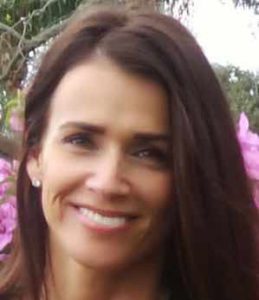 Green Bay Press-Gazette –
Green Bay Press-Gazette –
Ron Van Den Heuvel sentenced to 3 Years in federal prison on bank fraud charges
by Jeff Bollier
GREEN BAY – De Pere businessman Ron Van Den Heuvel will spend three years in prison for using straw borrowers to defraud Horicon Bank and three credit unions.
U.S. District Court Judge William Griesbach on Friday sentenced Van Den Heuvel, 63, on one count of conspiracy to commit bank fraud. Van Den Heuvel will also serve three years of supervision after his release from prison. He will also be required to pay $316,445 in restitution to Horicon Bank.
Griesbach sentenced Van Den Heuvel after denying his request to delay Friday’s hearing for reasons that included a claim that new evidence would exonerate Van Den Heuvel and his attorney’s request to withdraw as counsel.
The judge chastised Van Den Heuvel for trying to delay the 2-year-old case at the last minute.
“Intent to defraud was part of your plea (to the charge),” Griesbach said. “I cannot accept that you lied under oath simply to advance the proceedings. It’s gamesmanship. It will not be tolerated.”
According to court records, Van Den Heuvel worked with Horicon Bank loan officer Paul Piikkila to obtain more than $1 million in loans for Green Box, a recycling company he owned at the time, under the names of Van Den Heuvel’s employees [Steven Peters] and a former relative [William ‘Bill’ Bain]. Prosecutors portrayed the employees and relative as straw borrowers who did not receive the money and were not expected to repay it.
Horicon Bank reported losing more than $700,000 as a result of loans that were issued between Jan. 17, 2008, and Sept. 25, 2009.
Van Den Heuvel claimed one straw borrower, [Julie Gumban] his [Phillipine] live-in housekeeper, reinvested tens of thousands of dollars she earned from investments in his companies. But prosecutors pointed out Van Den Heuvel falsified income statements so the nanny could secure a loan and credit cards that Van Den Heuvel used to pay his expenses.
In another case, he made his administrative assistant [Debra Stary, Bill Bain’s sister in law who Ron ‘browbeat into being VP of OSGC’s Nature’s Way Tissue Corp.,] a board member in one of his limited liability companies [Source of Solutions, LLC] one month before she sought a loan for more than $200,000 via Piikkila and Horicon.
Horicon Bank Executive Vice Presidents Allen Schwab and Jay Vanden Boogart testified during the hearing that Van Den Heuvel’s conspiracy worried customers, left prospective employees concerned about working for the company and hurt Horicon’s employees, who own 25 percent of the bank.
“Horicon sustained a substantial loss beyond the amount of restitution,” Schwab said. “We have sustained a reputational loss, especially in the Fox Valley market. Google ‘Horicon‘ and this fraud case comes up. Customers come in to ask about if their investments are safe.”
Piikkila had been told by bank management to no longer loan money to Van Den Heuvel, according to court documents. He has pleaded guilty to his role in the straw borrower scheme and is scheduled for sentencing next month [February 7, 2018].
Done with delays
Van Den Heuvel pleaded guilty in October to the single fraud charge as part of a plea agreement that dismissed 18 other charges. Charges against his wife, Kelly Van Den Heuvel, were also dismissed under the agreement.After rejecting Van Den Heuvel’s attempt to withdraw his plea, Griesbach said a prison term was warranted based on Van Den Heuvel’s continued insistence that he’d done nothing wrong.
He said Van Den Heuvel’s family support, business acumen, his claims of trying to benefit those who borrowed money on his behalf, and his support of local nonprofits made his decision to conspire to defraud banks all the more disturbing.
“Mr. Van Den Heuvel presents himself as a selfless entrepreneur and philanthropist even today,” Griesbach said. “It is a lie. He can’t admit (his role) to himself, his family or this court. He has delayed the proceedings with motions that are frivolous. It tells us he’s still not gotten the message that what he believes is a lie.”
More charges ahead
Van Den Heuvel will be required to report to prison even as a Securities and Exchange Commission fraud case continues in federal court. In that case, Van Den Heuvel has pleaded not guilty to 14 counts in that case of defrauding Green Box investors out of $9 million.Van Den Heuvel [has long claimed to investor victims that he] spent years developing Green Box and its related companies’ system for converting food-contaminated trash and other waste into new paper products, reusable plastics and other materials.
The effort fell apart as financiers, investors and the Wisconsin Economic Development Corp. filed civil lawsuits against Van Den Heuvel and the limited liability companies under which the business was controlled.
Hisprimarycompany[sic]Green Box NA [Green Bay, LLC –– which is just one of many ‘Green Box’ fronts under actual ‘parent’ companyNature’s Choice Tissue Corp. / aka E.A.R.T.H. / aka Reclamation Technology Systems, LLC ––]filed for federal bankruptcy protection in April 2016. According to court documents, [GBNAGB] had less than $50,000 in assets and more than $10 million in debt.A U.S. Bankruptcy Judge dismissed the [Green Box NA Green Bay, LLC] Chapter 11 reorganization case on [December 27, 2017] based on the investors’ inability to restart the business and the court’s inability to identify assets that could be sold to restart the business and repay Van Den Heuvel’s investors.
The creditors can still individually use state and federal laws to try to recoup their losses, the judge wrote.

PREVIOUSLY…
- January 27, 2013 Decision & Order of the Wisconsin Tax Appeals Commission, various dockets, Steven Peters, Ronald Van Den Heuvel & Artley Skenandore Jr. v. WI Dept. of Revenue [re: NATURE’S WAY TISSUE CORP.]
[Artley] Skenandore had no expertise in the paper industry. Nevertheless, he was made president [of Nature’s Way Tissue Corp.]
Nature’s Way Tissue Corp. scheme principals: OSGC, Artley Skenanadore Jr., Ron Van Den Heuvel, and Steven Peters (who was also a ‘straw borrower’ in Ron’s bank fraud scheme during the same time period that Nature’s Way Tissue Corp. violated state tax laws and ONWI ‘wrote off’ over $5 million dollars)
 July 1, 2016 Paul Piikkila Plea Agreement, U.S. District Court, Eastern District of Wisconsin Criminal Case No. 16-CR-64, USA v. Paul J. Piikkila re: Conspiracy/Fraud Schemes against Horicon Bank with Ron & Kelly Van Den Heuvel
July 1, 2016 Paul Piikkila Plea Agreement, U.S. District Court, Eastern District of Wisconsin Criminal Case No. 16-CR-64, USA v. Paul J. Piikkila re: Conspiracy/Fraud Schemes against Horicon Bank with Ron & Kelly Van Den Heuvel
• Exhibit A: July 6, 2015 Brown Co. Search Warrant for 2077 Lawrence Drive Suite A, De Pere, WI 54115
Debra Stary worked as [Ron] Van Den Heuvel’s secretary for 17-18 years. She was his right hand person, kept all the ledgers and was in charge of and maintained finances. She had no decision making authority.
Debra Stary was the Vice President of Nature’s Way [Tissue Corp.] She didn’t want to be on the Board but [Ron] Van Den Heuvel browbeat her until she agreed. [Paul] Piikkila didn’t know if Stary and Van Den Heuvel had a romantic relationship.
Van Den Heuvel was intimidating and Piikkila once saw [Ron] punch Howard Bedford. They had a fight because Van Den Heuvel approached [Ken Dardis] and asked him to invest $30,000. Bedford told him not to invest. Van Den Heuvel needed the money immediately for the Waste Fiber facility.
• Exhibit B: July 6, 2015 Brown Co. Search Warrant for 2077 Lawrence Drive Suite B, De Pere, WI 54115
• Exhibit C: July 6, 2015 Brown Co. Search Warrant for 500 Fortune Avenue, De Pere, WI
• Exhibit D: July 6, 2015 Brown Co. Search Warrant for 2107 American Boulevard, City of De Pere, WI
• Exhibit F: March 14, 2008 Email from Paul Piikkila to John Jez regarding Source of Solutions, LLC $7.1 million financing request
• Exhibit G: 2009 Horicon Bank Loan Documents for Kelly Y. Van Den Heuvel’s KYHKJG, LLC [91 pages]
• Exhibit H: April 15, 2015 FDIC Memorandum of Interview of Paul Piikkila at US Attorney’s Office, Eastern District of WI
[Paul J.] Piikkila presented the $7.1 million loan [proposal] to the [Horicon Bank] Loan Committee for approval. Piikkila stated that [the] loan purpose was to purchase equipment for the paper mill. Piikkila said that the loan committee denied the loan because they did not like [Ron Van Den Heuvel]’s character. Piikkila reviewed the loan presentation and his attention was brought to the section intended to list the other related loans (Attachment 2). The RVDH [LLC] loan previously discussed was not listed in this section. Piikkila could not explain why he hadn’t listed that loan.
Piikkila restructured the $7.1 million loan [request] several times and presented it to the loan committee. The loan was denied each time.
Piikkila denied multiple times that bank management told him not ot loan money to [Ron Van Den Heuvel] or his related businesses. He was presented an email from Schwab to Piikkila which stated that the bank was not interested in loaning to [Ron Van Den Heuvel] unless the loan was collateratlized by CDs (Attachment 3). Piikkila did not remember that email. Piikkila stated that he continued to loan to [Ron Van Den Heuvel] because he felt he “could handle” him.
Piikkila stated that [Ron Van Den Heuvel] came to him and asked if he could approve a loan to William Bain. [Bill] Bain is [Ron Van Den Heuvel]‘s former brother-in-law [and partner in Ron & Bill Investments LLP, and Vice-President of Vos Electric, Inc.] [Ron Van Den Heuvel] said that he would pledge collateral for the loan.
Piikkila claimed that he thought the loan proceeds would be a split between Bain and [Ron Van Den Heuvel]. Piikkila said that at the closing Bain said he was not going to make any payments to the loan. Piikila counseled him that he should not sign the loan if he did not understand that he was responsible. Bain then signed for the loan. When asked if he thought this was a red flag, Pikkila said he didn’t think so because Bain was an accomplished businessman and knew what signing for a loan entailed.
Piikkila stated that Kelly Van Den Heuvel, [Ron Van Den Heuvel]‘s wife, introduced Julie Gumban … to him for a loan. … Piikkila stated that it seemed as though [Julie] Gumban did not really understand what was going on because she didn’t speak English very well. He thought that Kelly Van Den Heuvel was pushing [Julie Gumban] into getting the loan. Piikkila approved the loan anyway. Piikkila thought that Gumban was investing in KYHKJG, [LLC] owned by Kelly Van Den Heuvel.
Piikkila stated that [Julie] Gumban had taken out previous loans and credit cards for the Van Den Heuvel[s]. Piikkila was asked why he approved a loan for Gumban because she had a low credit score…, lots of credit card debt and the unsecured loan was half of her annual salary. Piikkila stated that he thought Gumban’s living expenses were low and therefore she would be able to repay the loan.
Pikkila then admitted that he knew that [Julie] Gumban’s loan would be used to pay down [Ron Van Den Heuvel]’s other loans at Horicon [Bank]. Piikila stated that he approved this loan so [Ron Van Den Heuvel]‘s loans would stay off the watch list.
At this point in the interview Piikkila’s attorney’s asked for a break so they could speak to their client.
After the break, Piikkila explained why he thought doing business with [Ron Van Den Heuvel] would be beneficial to the bank. He said that [E.A.R.T.H./ Environmental Advanced Reclamation Technology HQ, LLC / formerly named NATURE’S CHOICE TISSUE CORP. / renamed Reclamation Technology Systems, LLC / R.T.S. / RTS] was the endgame and Piikkila had full faith that [Ron Van Den Heuvel] would be successful in this venture. After [E.A.R.T.H.] took off, [Ron Van Den Heuvel] would bring his deposits to Horicon [Bank] and this would be a big payoff. Piikkila stated that he did this for his reputation and would hopefully get an additional bonus. Piikkila had worked closely with [Ron Van Den Heuvel] while he was at Anchor Bank and spoke to him on a weekly basis. Piikkila reiterated that he did not know how [Ron Van Den Heuvel] knew that he was at Horicon Bank and did not seek him out for business. …
Piikkila made a $250,000 loan to Source of Solutions [LLC]. The authorized signer was Debra Stary. [Ron Van Den Heuvel] made her a Vice President of the company so she could sign for the note to keep [Ron Van Den Heuvel]‘s name off the paperwork so [Horicon Bank] management would not notice it. Piikkila added that [Debra] Stary also typed up the lease agreements which were later disputed by the bank.
Piikkila’s attorney’s noted that [Debra] Stary’s signature looked very similar to the renewal signature for the $70,000 KYHKJG line of credit.
Piikkila worked for [Ron Van Den Heuvel] after he was fired from Horicon Bank. He provided some information on [Ron Van Den Heuvel] and potentially defrauded investors. …
Debra Stary and William Bain’s wife [Cynthia / Cindy Bain] are sisters.
Debra Stary no longer works for [Ron Van Den Heuvel…]. She was very close to [Ron] Van Den Heuvel and would do anything he asked. Pikkilla stated that her family had an intervention to get her to quit working for [Ron Van Den Heuvel].
WHEN IT RAINS…
- September 25, 2017 First Amended Complaint, U.S. District Court, Northern District of Illinois, Eastern Division, Docket No. 17-CV-108, RNS Servicing, LLC v. Spirit Construction Services, Inc., Steven Van Den Heuvel, ST Paper, LLC and Sharad Tak
- Exhibit D: March 28, 2007 Settlement Agreement between IFC Credit Corporation, Tissue Products Technology Corporation, Partners Concepts Development, Inc., Ronald H. Van Den Heuvel, Eco-Fibre Inc., and Oconto Falls Tissue, Inc.
- Exhibit L: Emails between Marc Langs and Sharad Tak
- November 3, 2017 Plaintiffs’ Post Trial Brief, U.S. District Court / Eastern WI, Case No. 14-CV-1203, Tissue Technology LLC, Partners Concepts Development Inc., Oconto Falls Tissue Inc., and Tissue Products Technology Corp. v. TAK Investments LLC and Sharad Tak
From a macro prospective, [Sharad] Tak took a position in this case that he believed would exonerate him from having to pay the investment notes. However, that position taken to its logical conclusion put Mr. Tak in jeopardy of having committed bank fraud. That fraud takes two forms. First, Mr. Tak claims to have issued the “worthless” notes so Ron Van Den Heuvel could use them to obtain financing from conventional sources. That is, he willingly executed the “worthless” notes for Mr. Van Den Heuvel to present to lending institutions to obtain more financing. … Second, Mr. Tak executed documents granting his approval of the use of the Notes as collateral by lending institutions, notes that he claims were of no value but were nevertheless utilized to secure borrowing. … Of course, his testimony in this regard is not worthy of any belief as he was clearly motivated to lie so as not to have to pay the plaintiffs the money he had promised on behalf of his company. Sharad Tak is a liar and his testimony should be disregarded in its entirety. He lied to the Court on repeated occasions leaving the only reasonable version of facts upon which this Court can rely to be those presented by the plaintiffs. Despite the fact that the strict falsus in uno inference has been abandoned, the modified doctrine applies here. When a witness’ falsehoods have been so pervasive, as have Mr. Tak’s, that his entire testimony is tainted, the trier of fact can reject the entirety of the witness’ testimony. … Mr. Tak’s lies were pervasive and central to the substance of the case thereby enabling the modified falsus in uno analysis. It is respectfully requested that this Court order judgment in favor of the plaintiffs on the four Notes with interest and attorney’s fees.
FACTS
Ron Van Den Heuvel and Sharad Tak are the principals of the respective parties herein. Their stories and clashes have been recounted numerous times in the various pleadings submitted to this Court. Their business relationship commenced in 2005 when they talked about various projects including the building of tissue mills in De Pere, Wisconsin, the State of Utah and Oconto Falls, Wisconsin. In fact, the parties prepared a document on December 27, 2005 describing the scope of their anticipated projects. … This yielded a memorandum of understanding executed by the same parties on May 5, 2006. … They executed a joint business development agreement on the same date. … At trial, the defense tried to hone in on the fact that these were non-binding agreements–which is true. However, the documents were submitted in order to demonstrate the background that brought the parties to the execution of the Final Business Terms Agreement and the four Promissory Notes on April 16, 2007. … The four Notes, termed the “Investment Notes”, were executed in anticipation of some rather significant construction projects that would benefit Mr. Van Den Heuvel’s construction company, Spirit Construction. … The scope of the project was as significant as $550 to $600 million. … Nevertheless, all of the documents taken together serve as the backbone for what became the Final Business Terms Agreement. … This background is vitally important to understanding why the four Investment Notes were issued, how and why they relate to the Final Business Terms Agreement and how those Notes were to be terminated should the parties enter into the overarching construction contracts they had anticipated.
The parties’ agreements were paired down in scope as they neared the April 16, 2007 closing at which time the defendant was to complete the purchase of the assets of the Oconto Falls tissue mill. It is clear that the financing of the project was cut substantially immediately before the closing by Goldman Sachs. … Because of that reduction in funding and the fact that there were various outstanding loans that needed to be satisfied at or before closing, Ron Van Den Heuvel and his companies made certain agreements, including with Mr. Van Den Heuvel’s brothers, to ensure that Sharad Tak received clean title. … It was clear that the Investment Notes and the Final Business Terms Agreement were to further reflect the agreement between the parties, to wit: Sharad Tak and his companies and Ron Van Den Heuvel and his companies, to clear title as well as to prospectively govern their conduct. … As set forth in the Closing Statement, …there were various parties who were not paid out of closing, but were paid outside of closing and were otherwise given security for the loans in order to have the deal go through. This included certain side deals that satisfied debts with Nicolet Bank, Johnson Bank, Associated Bank, William Bain, Mr. Van Den Heuvel’s brothers’ companies and others. …
…Not only should Mr. Tak’s testimony be disregarded as disingenuous, deceitful and even criminal – his testimony as to the meaning of the documents is not consistent with the Wisconsin requirement that the documents must be read so as to make sense.
CONCLUSION
It is time for the Defendant’s charade to end. Mr. Tak has lied to this Court in brazen fashion. He has tried in every way to avoid his legal obligations and promises. The Plaintiffs are entitled to judgment in this case as of December 1, 2017 in the amount of $ $34,191,050.00 along with actual attorney’s fees as called for in the Notes. It is respectfully requested that the Court so order.
Dated this 3rd day of November, 2017.
TERSCHAN, STEINLE, HODAN & GANZER, LTD.
ATTORNEYS FOR PLAINTIFFS,
BY: /S/MICHAEL J. GANZER
STATE BAR NO. 1005631
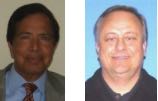
 December 4, 2017 Defendant Tak Investments LLC’s Post Trial Brief, U.S. District Court / Eastern Wisconsin, Green Bay Division Case No. 14-CV-1203, Tissue Technology LLC, Partners Concepts Development Inc., Oconto Falls Tissue Inc., and Tissue Products Technology Corp. v. TAK Investments LLC and Sharad Tak
December 4, 2017 Defendant Tak Investments LLC’s Post Trial Brief, U.S. District Court / Eastern Wisconsin, Green Bay Division Case No. 14-CV-1203, Tissue Technology LLC, Partners Concepts Development Inc., Oconto Falls Tissue Inc., and Tissue Products Technology Corp. v. TAK Investments LLC and Sharad Tak
The Plaintiffs – Tissue Technology, LLC, Partners Concepts Development, Inc., Oconto Falls Tissue, Inc. and Tissue Products Technology Corp. (collectively, the “OFTI Group”) – have now tried to this Court a claim for the enforcement of four notes (the “Investment Notes”) from Tak Investments, LLC (“Tak Investments”) in 2007. Through that claim, Plaintiffs seek a recovery of more than $34 million in principal and interest. The record developed before and at trial, however, establishes three fundamental flaws in the Plaintiffs’ case:
The Plaintiffs are not in possession of the Investment Notes and, therefore, lack standing to enforce them;
The Plaintiffs’ claim is barred by the statute of limitations; and,
The Investment Notes were made without consideration.
Accordingly, on any one ground, this matter should be dismissed.
Plaintiffs’ post-trial brief offers few facts and little law but, instead, a stream of invective directed at Sharad Tak (“Tak”). The brief lacks any serious discussion of the evidence Plaintiffs believe entitles them to more than $34 million on notes signed more than ten years ago and even less discussion of the Defendant’s responsive arguments. Littered throughout the Plaintiffs’ brief are assertions that Tak admitted to “what is loosely termed bank fraud,” that Tak was “in jeopardy of having committed bank fraud,” and that Tak’s testimony was “disingenuous, deceitful and even criminal.” (Pls.’ Br. at 2, 4, 16, ECF No. 91.) That Plaintiffs would accuse Tak is rich in irony. As the Court knows, Rule 201 of the Federal Rules of Evidence brings to the fore the fact that Plaintiffs’ principal and chief witness, Ron Van Den Heuvel, himself has just been adjudged guilty of criminal conspiracy to commit bank fraud. Change of Plea Hearing Minutes, United States v. Van Den Heuvel, No. 16-CR-64 (E.D. Wis. Oct. 10, 2017), ECF No. 152.
Beyond their unfounded accusations of inappropriate behavior, Plaintiffs contend that Tak’s testimony lacks veracity. (Pls.’ Br. at 4, ECF No. 91) (“Sharad Tak is a liar and his testimony should be disregarded in its entirety.”). Here, too, irony abounds: Ron Van Den Heuvel’s credibility is, to put it mildly, subject to serious question. Early in one of his own criminal proceedings, this Court itself called into question Ron Van Den Heuvel’s credibility.
[Footnote: In an Order Appointing Counsel pursuant to the Criminal Justice Act, this Court observed that the affidavit Ron Van Den Heuvel submitted attesting to his income and assets was an inaccurate representation of his financial circumstances. United States v. Van Den Heuvel, No. 16-CR-64 (E.D. Wis. July 26, 2016).]
Then, here at trial, David Van Den Heuvel, Ron’s brother, testified that he had formed an opinion as to Ron’s character for truthfulness, but he declined to state that opinion in open court:
Q. …Have you had an opportunity through your interactions with [your brother Ronald] over your whole life to form an opinion as to his character for truthfulness?
A. I guess, yes.
Q. And what would that opinion be?
A. That he’s a very nice guy.
Q. But nothing in relation to truthfulness?
A. What do you want me to say about truthfulness?
Q. I’m asking for your opinion about whether… what his character for truthfulness is.
A. That’s a hard one for me to answer because I don’t know specifically what you’re – what you’re asking. I – I did a lot of things with my brother, Ron, through the years and a lot of them were very, very good things. A few didn’t work out so well, but most were very good.
Q. Separate from, I guess, the various feelings you’ve had, I just asked if you had an opinion about his character for truthfulness and if so what that was. You indicated you had the opinion, but apparently –
MR. GANZER: Your Honor, I’d object, that’s been asked and answered.
THE COURT: Well, I don’t think it’s been answered. If you have any other answer – I think you’re reluctant to answer, is that a fair statement?
THE WITNESS: That’s a fair statement.
(Day 1 Tr. at 19:21-20:20.) The inescapable implication is, of course, that David Van Den Heuvel did not credit his own brother with a truthful character. Further, the fact that Ron Van Den Heuvel is now a felon, convicted of conspiracy to commit bank fraud and awaiting sentencing on January 5, 2018, is also evidence on the issue of Mr. Van Den Heuvel’s character for truthfulness. See Fed. R. Evid. 609. …
David Van Den Heuvel stated that his brother [Ronald] owed his company approximately $150 million altogether[.]
09/18&19/17 : September 18-19, 2017 Court Trial Minutes, U.S. District Court / Eastern Wisconsin, Green Bay Division Case No. 14-CV-1203, Tissue Technology LLC, Partners Concepts Development Inc., Oconto Falls Tissue Inc., and Tissue Products Technology Corp. v. TAK Investments LLC and Sharad Tak
- September 18, 2017 Court Trial Transcript Excerpts, U.S. District Court / Eastern Wisconsin, Green Bay Division Case No. 14-CV-1203, Tissue Technology LLC, Partners Concepts Development Inc., Oconto Falls Tissue Inc., and Tissue Products Technology Corp. v. TAK Investments LLC and Sharad Tak
SPEAKING OF BILL & THE BOYS…
& BANK FRAUD….
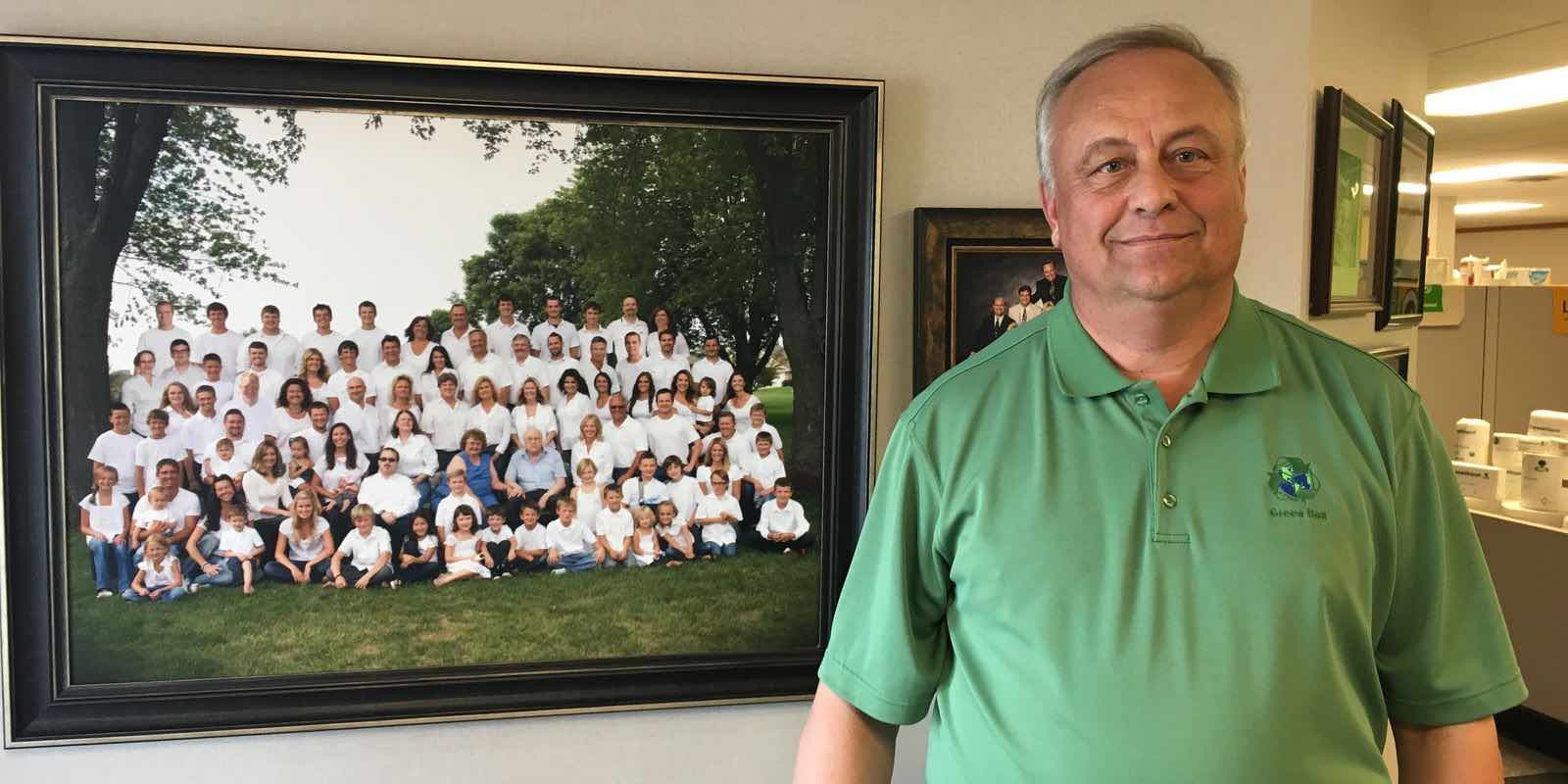
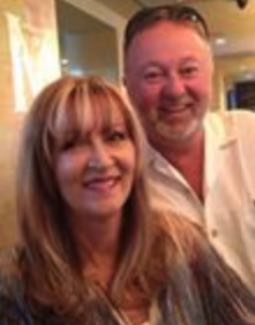
- November 7, 2017 Opinion,
U.S. Tax Court
Docket Nos. 4756-15, 21583-15,
VHC Inc. and Subsidiaries v.
Commissioner of Internal Revenue [IRS]
Excerpts:
In 1997 Ronald H. [Van Den Heuvel] formed Partners Concepts Development, Inc. (PCDI), in De Pere, Wisconsin. During the tax years at issue he owned a majority of PCDI shares and managed its business. He was PCDI’s president and chairman. In 2012 PCDI received a notice of administrative dissolution, but as of June 4, 2014, PCDI was a corporation in good standing with the State of Wisconsin. …
From 1998 through 2002 VHC shareholders that owned PCDI shares included all of the VDH brothers, as well as [VOS Electric Inc. VP William Bain], [Guy ‘Butch’ Piontek], [Craig Kassner], [Ronald Lentz], [VHC Inc. Secretary Nancy Van Den Heuvel / Nancy Stellpflug], and [Jim Rottier]. Raymond [Van Den Heuvel] also owned shares of PCDI. Most of these shares were canceled in November of 2003. [James Kellam] still owns his PCDI shares. …

 PCDI owned 67% of Custom Tissue, LLC (Custom Tissue), and the remaining portion was owned by employees or other related parties. Custom Tissue was incorporated in Wisconsin in 2003. Custom Tissue owned 49% of Nature’s Way Tissue Corp. (NWTC), a Wisconsin corporation that was majority owned by Native American investors. TPTC performed management functions for NWTC under a management agreement. NWTC converted tissue rolls into finished, packaged products. [Nature’s Way Tissue Corp.] owned 100% of both Custom Paper Products, Inc. (CPPI), and Purely Cotton Products Corp. (Purely Cotton). CPPI was incorporated in 2000 in Wisconsin. It operated as a converting operation, which took large tissue rolls and cut them into consumer-size rolls. Purely Cotton owned the patents, technology, and intellectual property regarding a process for making tissue out of cotton. Custom Tissue, NWTC, CPPI, and Purely Cotton were administratively dissolved in 2012.
PCDI owned 67% of Custom Tissue, LLC (Custom Tissue), and the remaining portion was owned by employees or other related parties. Custom Tissue was incorporated in Wisconsin in 2003. Custom Tissue owned 49% of Nature’s Way Tissue Corp. (NWTC), a Wisconsin corporation that was majority owned by Native American investors. TPTC performed management functions for NWTC under a management agreement. NWTC converted tissue rolls into finished, packaged products. [Nature’s Way Tissue Corp.] owned 100% of both Custom Paper Products, Inc. (CPPI), and Purely Cotton Products Corp. (Purely Cotton). CPPI was incorporated in 2000 in Wisconsin. It operated as a converting operation, which took large tissue rolls and cut them into consumer-size rolls. Purely Cotton owned the patents, technology, and intellectual property regarding a process for making tissue out of cotton. Custom Tissue, NWTC, CPPI, and Purely Cotton were administratively dissolved in 2012.
Tissue Technology, LLC (TTL), was incorporated in 2006 in Wisconsin, and serves as a holding company. Ronald H. is one of its members and controls the company. In 2012 TTL received a notice of administrative dissolution, but it was restored to good standing in July 2014. …
Beginning in 2000 William Bain, a VHC shareholder and former brother-in-law, served as a straw borrower for Ronald H. by obtaining loans on behalf of Ronald H. at different banks. In 2000 he obtained a loan for $125,000 from Associated Bank and a loan for $250,000 through Nicolet Bank. In 2002 he used his personal credit to obtain a $500,000 loan of which Ronald H. used the proceeds to buy out an EcoFibre shareholder. …
Nicolet Bank merged with Baylake Bank in 2016. As part of the due diligence process, it discovered that Baylake Bank had an $8 million loan with Ronald H. on its books. Nicolet Bank requested that Baylake Bank write off the loan with Ronald H., which it did, before the merger. There had been no source of repayment or collateral for that loan. In 2008 or 2009 Nicolet Bank also wrote off loans with Ronald H. and his related companies because there was no source of repayment. …
… Conclusion
After consideration of the circumstances of VHC’s advances to or for the benefit of Ronald H. and/or his related companies, and in the light of the factors set forth above, we conclude that the advances did not represent bona fide debt. VHC did not intend to create a bona fide debtor-creditor relationship, and the economic circumstances that existed during the time VHC made itsadvances establish that it did not reasonably expect repayment. VHC is not entitled to related-party bad debt deductions for the advances it made to Ronald H. and his related companies during the tax years at issue. Because we conclude that the advances do not constitute bona fide debt, we need not address whether VHC established that the advances became partially worthless during the tax years at issue.
Ron & Bill’s ‘straw borrower’ bank fraud schemes continued long after the year 2000:

- September 20, 2016 Superseding Indictment re: ‘Straw Borrower’ Bank Fraud Scheme, U.S. District Court, WI Eastern District Docket No. 16-CR-064, USA v. Ron Van Den Heuvel, Paul Piikkila & Kelly Van Den Heuvel
See, Compare & Contrast:
Recipients include:
- WI Gov. Scott Walker
- WI Atty. General Brad Schimel
- Former WI Atty. General
J.B. Van Hollen
HMMM…
 BANK FRAUD
BANK FRAUD
TO
BUY FAVORS
STRAW BORROWERS
STRAW DONORS
STRAW CORPORATIONS
- November 9, 2009 WIDoC Contract #LEG FY10-19812, $2 Million Legislative Award Agreement between the Wisconsin Dept. of Commerce and Oneida Seven Generations Corp. / OSGC
- September 30, 2011 Wisconsin Economic Development Corp. Contract #WEDC FY12-21010, $1.2 Million Loan Agreement Between the Wisconsin Economic Development Corporation and Green Box NA Green Bay, LLC with exhibits, amendments and General Business Security Agreement with Ron Van Den Heuvel’s signed personal Unlimited Guaranty, along with the signature of Fmr. Green Bay Mayor & Fmr. WEDC CEO Paul Jadin, and renegotiation contract signed by WEDC Vice-President Jake Kuester
- November 16, 2011 Contract #SEP FY10-20265, $2 Million State Energy Program Loan Agreement between the Wisconsin Economic Development Corporation / WEDC and Oneida Seven Generations Corp. / OSGC-subsidiary Oneida Energy Inc.
- VIDEO EXCERPT – At the September 9, 2015 WI Joint Legislative Affairs Committee Meeting, Fmr. WEDC Board Member & WI State Sen. Julie Lassa testified:
[WEDC] had invited Green Box as late as [March 20, 2015] to participate in a ‘trade trip’ to Tanzania, even though Green Box is beinginvestigated and it might be something like aPonzi scheme or a check-kiting organization.
On July 21, 2015 the Green Bay Press-Gazette reported in its physical edition:
Green Box has been under scrutiny since the Milwaukee Journal Sentinel reported earlier this month that Van Den Heuvel failed to disclose prior business lawsuits to WEDC in a 2011 loan application. The agency approved the loan after a background check failed to identify the lawsuits.
A review of Brown County Circuit Court records by Press-Gazette Media identified multiple civil lawsuits filed by creditors against Van Den Heuvel’s companies for failing to repay loans and investors.
WEDC provided the $1.1 million loan to Green Box NA, LLC in 2011 in exchange for a pledge to create 115 jobs by Dec. 31, 2014.
The company stopped making payments in 2013, got the loan terms restructured in 2014 and WEDC declared the company in default in March. …
Brown County court records indicate that SC Acquisitions LLC of Winnetka, Ill., sought repayment of $28.3 million in a 2010 mortgage foreclosure case filed against four Van Den Heuvel companies – Eco Fibre Inc., Custom Paper Products Inc., Partners Concepts Development Inc., and Tissue Products Technology Corp.
The company’s struggle to repay existing debt didn’t stop Van Den Heuvel from continuing to pursue loans from WEDC. …
A WEDC statement on Green Box indicates it authorized Green Box’s 2011 loan less than a month after the quasi-public agency was created [by Governor Scott Walker].
_________________
![]()
ORDER
These consolidated cases are calendared for a Special Session commencing on August 15, 2016, in Milwaukee, Wisconsin. On May 31, 2016, petitioners filed a motion for leave to serve subpoena and notice of deposition of non-party Schenck, S.C. pursuant to Tax Court Rule 74(c)(2)(B). Attached to the motion, petitioners included the notice of deposition with proof of service. The Court granted petitioners’ motion on June 7, 2016.
Upon due consideration, it is
ORDERED that the deposition of Schenck, S.C. shall take place on June 30, 2016, from 10:30 a.m. to 5:00 p.m., at the offices of petitioners’ counsel, One Law Group, S.C. [formerly doing business as Stellpflug Law, S.C.], 444 Reid Street, Suite 200, DePere, Wisconsin 54115.
It is further
ORDERED that in addition to the usual service, the Clerk of the Court shall serve a copy of this Order on: Dennis J. Langenberg, Schenck S.C., 200 E. Washington Street, Appleton, WI 54911, and on Brian C. Spahn, Godfrey & Kahn, S.C., 780 North Water Street, Milwaukee, WI 53202-3590.
Atty. Mark Bartels of SC Acquisition Company, LLC, is the ‘Registered Agent’ for One Law Group/Stellpflug Law…
…and, oh… by the way…
Nancy Van Den Heuvel / Nancy Stellpflug – wife of One Law Group/Stellpflug Law partner C. David Stellpflug who retired in January 2016 – just happens to be Secretary of VHC, Inc.
_________________
On July 20, 2015 the Milwaukee Journal Sentinel reported in its physical version:
A Milwaukee Journal Sentinel review found that WEDC failed to run adequate checks and gave two awards worth more than $1.2 million to a financially troubled De Pere businessman who had not disclosed his money problems to the state. Despite those omissions in 2011 and 2012, WEDC kept working with Ron Van Den Heuvel and his ‘clean’ energy company, Green Box, into 2014, state records show.
There is no record so far of WEDC notifying the City of De Pere about the company’s money troubles even though Green Box was working with the city in an unsuccessful attempt to get federally tax-exempt bonds — in part to repay the state’s soured loan. …
[Ron Van Den Heuvel, a] financially troubled businessman who has since defaulted on more than $1.2 million in loans from Wisconsin’s flagship jobs agency voiced frustration with state officials for not giving him more money.
Ron Van Den Heuvel wrote to an official with the Wisconsin Economic Development Corporation in spring to say his energy company, Green Box, was “disappointed” it had not received more money from the agency.
“Green Box is disappointed in the amount of assistance we got bringing in $200,000,000 of capital and 500 manufacturing jobs in to the state of Wisconsin,” Van Den Heuvel wrote.
Those figures are disputed by the state, who say the company created a small fraction of the jobs numbers he cited.
The De Pere businessman, who did not disclose his problems to the state when he applied for the loans, suggested that Wisconsin’s lagging job creation figures may be the result of failing to give more money to companies like Green Box.
“In 5 other states that Green Box is building new facilities with less jobs, no one is under $17,000,000 of assistance,” Van Den Heuvel wrote in the March 21 letter. “Now reading in the Milwaukee newspaper that Wisconsin new job growth is lagging other states, maybe there’s a reason.”
Despite Van Den Heuvel’s omissions in 2011 and 2012, Gov. Scott Walker’s administration kept working with him and Green Box into 2014. But he made it clear he wasn’t impressed with their efforts.
“Green Box supports Governor Walker’s programs everywhere and cannot understand why this program is lacking behind the other states,” he wrote in the letter to Steve Sabatke, an economic development consultant with WEDC. “The other states business development and jobs area promotional personnel are more persistent, aggressive and hardworking; maybe that’s why they are winning.” …
Despite the troubles with Green Box, WEDC suggested a company representative go on a May trip to East Africa as recently as March of this year.
On March 20 — just one day before Van Den Heuvel voiced concern that Green Box hadn’t received more money — Katy Sinnott, the vice president of the Division of International Business Development, wrote in a letter to Green Box’s human resources director that the agency was planning a trade venture to Tanzania and Kenya.
“Your project is extremely exciting and we are proud to have Green Box in Wisconsin making a difference in waste management,” she wrote to Phil Reinhart. “I look forward to hearing more about the next project — cleaning the seas!”
More like cleaning out victims’ wallets.
You know…
Racketeering Influenced & Corrupt Organization / RICO activities.
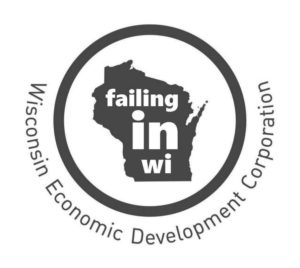
FLASHBACK:
20 YEARS AGO…
EXPOSÉ of RONALD’s PAY-to-PLAY…

 November 2, 1997:
November 2, 1997:
Milwaukee Journal Sentinel
by Daniel Bice
Businessman Ronald Van Den Heuvel says he donated money through Wisconsin residents to Gov. Tommy Thompson’s campaign for several years while living in Georgia – an apparent violation of state election laws.
In a recent interview, Van Den Heuvel was questioned about $10,000 in campaign donations that he and his wife [Jan Marie Summers Van Den Heuvel] made one day before the state approved a large issue of tax-free bonds for one of his businesses. Van Den Heuvel responded by saying he had given similar amounts in the past.
When asked why reporters had not spotted those earlier donations on Thompson’s financial reports, Van Den Heuvel said, “Yeah, you may not have because when I was a Georgia resident, I gave it to people here.”
Those Wisconsin individuals, whom he did not name, then turned the money over to Thompson, he said. Van Den Heuvel, owner of VOS Electric in Green Bay and other businesses, said he moved to Wisconsin three years ago. …

Kevin Kennedy, executive director of the state Elections Board, said state law specifically bars people from laundering campaign donations or knowingly accepting laundered funds. Kennedy said it could be either a civil or criminal offense, depending on whether prosecutors believe they can prove the campaign money was given or received in intentional violation of the law.
Kevin Keane, spokesman for the governor, said the governor and his campaign were unaware of any laundered money. If Van Den Heuvel did pass money through others to Thompson, Keane said, the governor will return the money immediately once it is identified.
C. David Stellpflug, Van Den Heuvel’s lawyer [and husband of VHC Inc. Secretary Nancy Stellpflug], called the Journal Sentinel to say that his client was talking about giving money to political parties. But in his interview, Van Den Heuvel was critical of parties, specifically saying he did not give to the Republican National Committee.
“To me, parties – they kind of get in the way,” Van Den Heuvel said. “I like to know the person and what kind of person that person is.”
11/02/1997 – Milwaukee Journal Sentinel:
by Steve Schultze
and Daniel Bice
Like others before him, Ron Van Den Heuvel, a Green Bay-area entrepreneur, found the route to state largess with the help of Gov. Tommy G. Thompson.
Van Den Heuvel hit the jackpot in late September when an obscure state board awarded $24 million worth of tax-free bond financing to help him reopen an Oconto Falls tissue factory – the largest such approval this year and among the largest ever made by the state.
The award culminated nearly a year’s effort that included a formal application through the Commerce Department. But Van Den Heuvel worked informal channels to Thompson as well. And last May – the day before an initial financing award was made by the state – Van Den Heuvel and his wife [Jan Marie Summers Van Den Heuvel] donated a total of $10,000 to the governor’s campaign fund. Van Den Heuvel said he had been asked for the donation by Thompson’s fund-raiser in November 1996.
When asked by reporters last month about the campaign donations, Thompson moved quickly to return the money.
The subsidy will save Van Den Heuvel’s company at least $2 million in short-term financing costs, Van Den Heuvel said. The financing covers nearly half of the $52 million cost of renovating the Oconto Falls factory.
The circumstances of the case and others reviewed by the Journal Sentinel in an eight-month investigation suggest a trend in which donors and well-connected firms enjoy a close and mutually beneficial relationship with the Thompson administration.
“You don’t pay, you don’t play,” said a veteran lobbyist, speaking of state government generally, including the governor and legislators. ….
The $24 million in financing aid, while large, was far less than the total of $70 million that Van Den Heuvel originally requested for the De Pere Re-Box project, state officials noted. …
[L]obbyists for major firms and interest groups who do business with the state, and business executives interviewed by the newspaper, said the fund-raising events are sold as prime opportunities to bend the governor’s ear on state issues – often worth millions to major players in issues ranging fromutility regulation to Indian gaming. The fund-raisers often include discussion of those issues. …



A second lobbyist said Thompson’s fund-raising machine “systematically and methodically” milked firms with state business for donations. “Everybody understands if you go and ask the government to do something, you are going to have to make contributions.”
Both lobbyists asked not to be named, saying they feared retribution for speaking out.

What does the ‘H.’ stand for?


- July 23, 2017 Order, U.S. Tax Court Docket No. 14370-17, Ronald Hewry Van Den Heuvel & Kelly Y. Van Den Heuvel v. Commissioner of Internal Revenue
For cause, it is ORDERED that the caption of this case is amended to read,
“Ronald Hewry Van Den Heuvel &
Kelly Y. Van Den Heuvel ,
Petitioner(s)
v.
Commissioner of Internal Revenue,
Respondent.”
- October 20, 2017 Order, U.S. Tax Court Docket No. 14370-17, Ronald Hewry Van Den Heuvel & Kelly Y. Van Den Heuvel v. Commissioner of Internal Revenue
- November 6, 2017 Order, U.S. Tax Court Docket No. 14370-17, Ronald Hewry Van Den Heuvel & Kelly Y. Van Den Heuvel v. Commissioner of Internal Revenue
ORDER
On November 3, 2017, respondent filed in the above-docketed case a Motion To Dismiss for Lack of Jurisdiction as to Petitioner Kelly Y. Van Den Heuvel, on the ground that the petition was not executed or filed by Kelly Y. Van Den Heuvel or on her behalf by a party with proper authorization and capacity pursuant to the Tax Court Rules of Practice and Procedure. Rather, the petition had been signed only by Ronald Hewry Van Den Heuvel. If a petition has not been has not been properly signed by a petitioner personally or by a representative admitted to practice before this Court, then in order for the Court to acquire jurisdiction to consider the case as to that taxpayer, it is necessary to obtain a Ratification of Petition bearing the taxpayer’s original signature and ratifying the petition previously filed. The Tax Court, unlike the Internal Revenue Service (IRS), does NOT recognize powers of attorney.
Upon due consideration, it is ORDERED that, on or before November 27, 2017, Kelly Y. Van Den Heuvel shall file with the Court a Ratification of Petition, bearing her original signature (preferably in blue ink), in which petitioner states, if such be the case, that she has read the petition filed June 29, 2017, and ratifies and affirms the filing of said document. If no such Ratification of Petition is received by that date, the Court may dismiss this case for lack of jurisdiction. Petitioner should note that the Ratification of Petition may NOT be filed electronically.
It is further ORDERED that the Clerk of the Court is directed to attach to the copies of this Order served on petitioners a form which may be used for the purpose of ratifying the petition. Respondent’s motion to dismiss shall be held in abeyance.
(Signed) L. Paige Marvel Chief Judge
- December 15, 2017 Order, U.S. Tax Court Docket No. 14370-17, Ronald Hewry Van Den Heuvel v. Commissioner of Internal Revenue

 November 13, 2017 NOTICE of ENTRY of JUDGMENT against Tissue Technology LLC and Ron Van Den Heuvel – $4,475,686.80 – Brown Co. Case No. 16-CV-1137, Daniel J. Platkowski v. Ron Van Den Heuvel; Howard Bedford [rep’d by Godfrey & Kahn]; Tissue Technology LLC; Glen Arbor LLC; Quotient Partners [dismissed defendants: GlenArbor Equipment LLC; Reclamation Technology Systems LLC; Stonehill Converting LLC; Horicon Bank]
November 13, 2017 NOTICE of ENTRY of JUDGMENT against Tissue Technology LLC and Ron Van Den Heuvel – $4,475,686.80 – Brown Co. Case No. 16-CV-1137, Daniel J. Platkowski v. Ron Van Den Heuvel; Howard Bedford [rep’d by Godfrey & Kahn]; Tissue Technology LLC; Glen Arbor LLC; Quotient Partners [dismissed defendants: GlenArbor Equipment LLC; Reclamation Technology Systems LLC; Stonehill Converting LLC; Horicon Bank]
- November 20, 2017 Order directing Defendant Ron Van Den Heuvel to meet with pre-trial services by November 28, 2017 and provide information under oath required to establish his eligibility for CJA counsel, U.S. District Court, Eastern District of Wisconsin, Case No. 17-CR-160, United States of America v. Ronald H. Van Den Heuvel
On October 10, 2017, at the defendant’s arraignment in the above matter, the court orally appointed Robert LeBell as CJA counsel for the defendant based upon the finding of indigency in an earlier case to which the defendant entered a plea agreement on the same date. At the same time, however, the court indicated that Van Den Heuvel would be required to meet with pre-trial services and complete a financial disclosure affidavit to establish his eligibility for a CJA appointment. Counsel for the defendant has filed several motions requesting authorization for expenditures related to his representation of the defendant. During a discussion of one of the expenditures, the court reminded counsel of his client’s obligation to complete the financial disclosure declaration required to establish his eligibility for CJA counsel. It appears that the defendant has yet to do so. Instead, he has simply deposited with the Clerk a collection of documents and a handwritten statement that contains little of the kind of information that would allow Pretrial Services to confirm the information provided. This is not sufficient.
Based upon the foregoing, defendant is directed to meet with pre-trial services and provide the information under oath required to establish his eligibility for CJA counsel on or before November 28, 2017. Failure to do so will result in the termination of the CJA appointment.
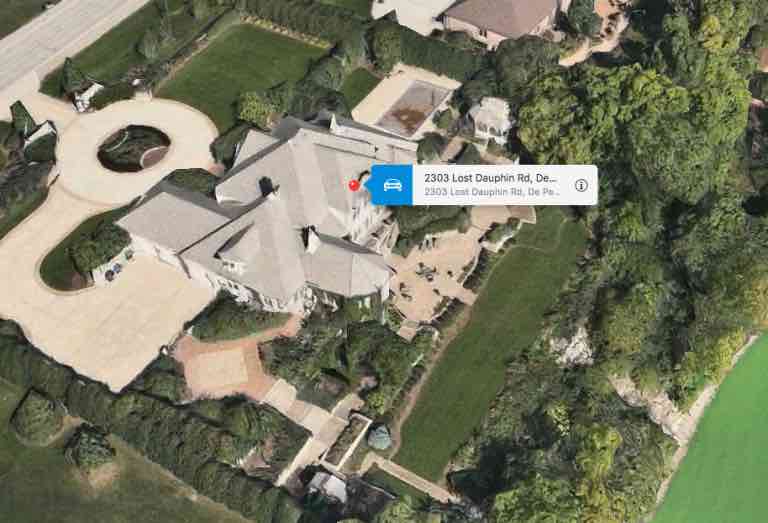
The ONEIDA NATION of Wisconsin has a LONG HISTORY of Following FRAUDS, IMPOSTERS, and SCOUNDRELS…
because that’s how it came to exist in the first place.
1820 and 1821 : Con-artist Masonic Mohawk & Episcopal Missionary – Eleazer Williams – leads delegations of Oneidas from New York to settlements on Menominee tribal land in Wisconsin on what became the Oneida Nation of Wisconsin reservation.
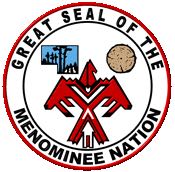

Eleazer Williams claimed to be the
– the kidnapped son of Louis XVI and Marie Antoinette – and, thus, the rightful heir to the throne of France.
- September 5, 2018 Village of Hobart WI Brief in Opposition to ONWI Motion for Summary Judgment, U.S. District Court, Eastern District of Wisconsin, Green Bay Division, Case No. 16-CV-1217, Oneida Nation of Wisconsin v. Village of Hobart, Wisconsin
- Exhibit 12 – TRANSCRIPT of March 11, 2018 Deposition of Emily Greenwald, Ph.D.
- Exhibit 12 – INDEX
As Dr. [Emily] Greenwald explains, after completion of the Treaty of 1838, Oneida leaders almost immediately began petitioning the federal government to exchange their individual 100-acre parcels for larger 320-acre parcels west of the Mississippi. These petitions resulted in the negotiation and execution of a new treaty that would have allowed for individual Oneida to voluntarily determine whether to exchange their individual 100-acre parcels for larger parcels outside of Wisconsin. ... Although the new treaty was never ratified, this documentary evidence shows that both the United States and the Oneida understood the Treaty of 1838 as granting separate 100-acre tracts to each individual Oneida Indian. In contrast to this evidence, the Nation does not cite a single piece of evidence that would illustrate how the Oneida understood the Treaty of 1838 when it was executed.

PREVIOUSLY:
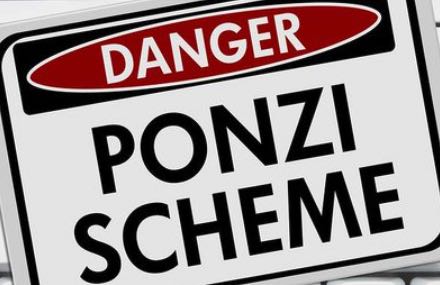
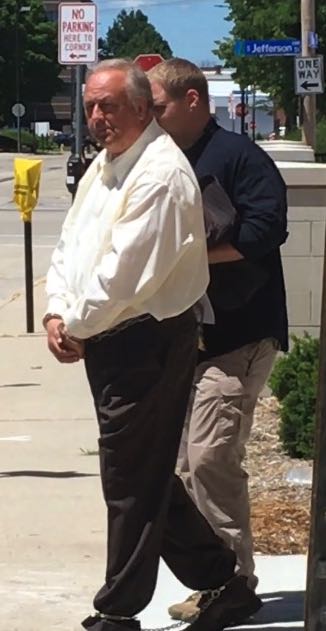

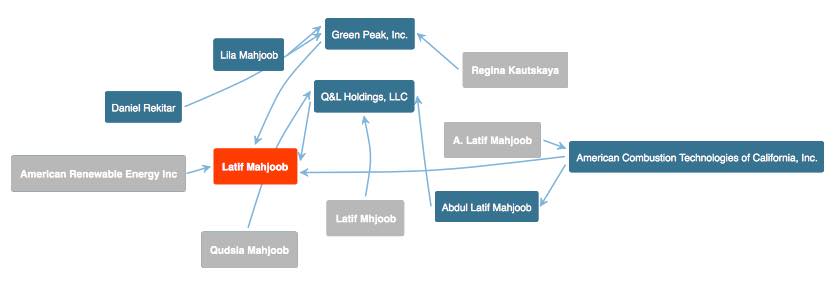
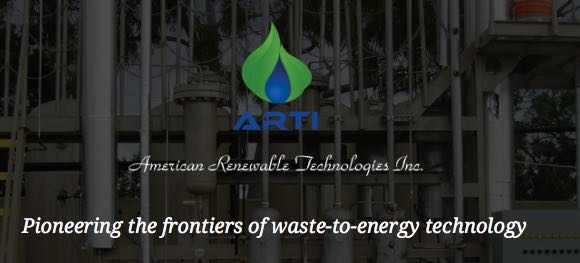


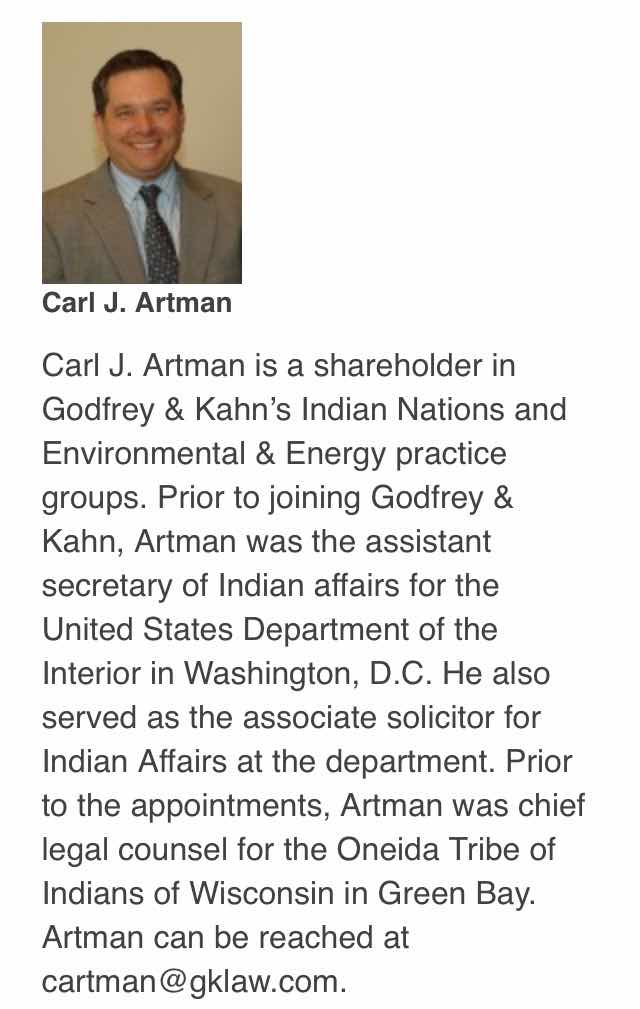
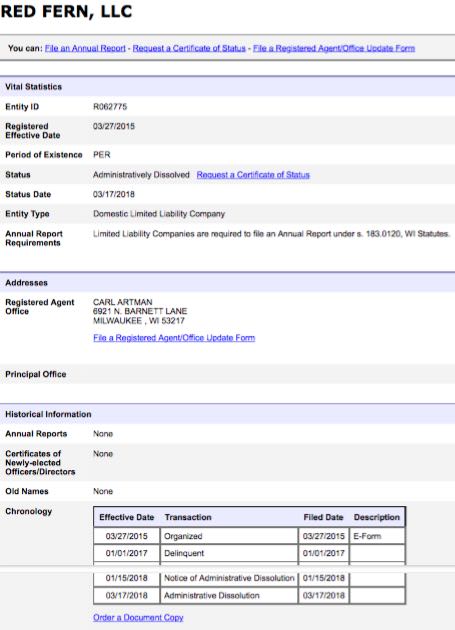
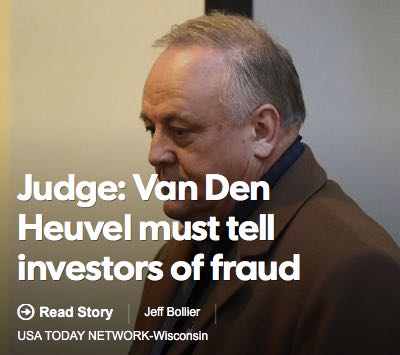
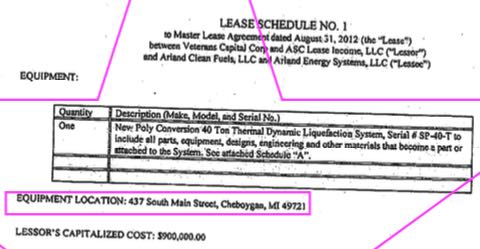
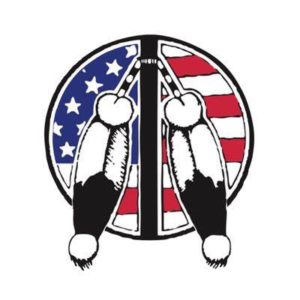
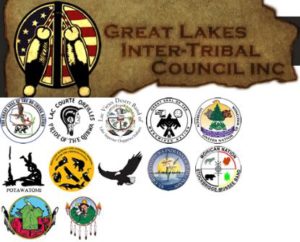
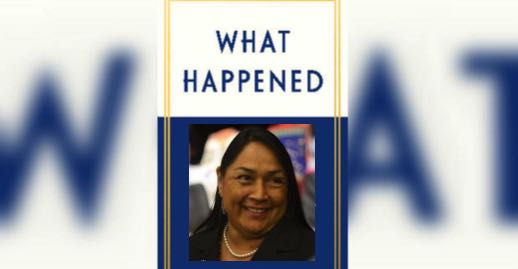

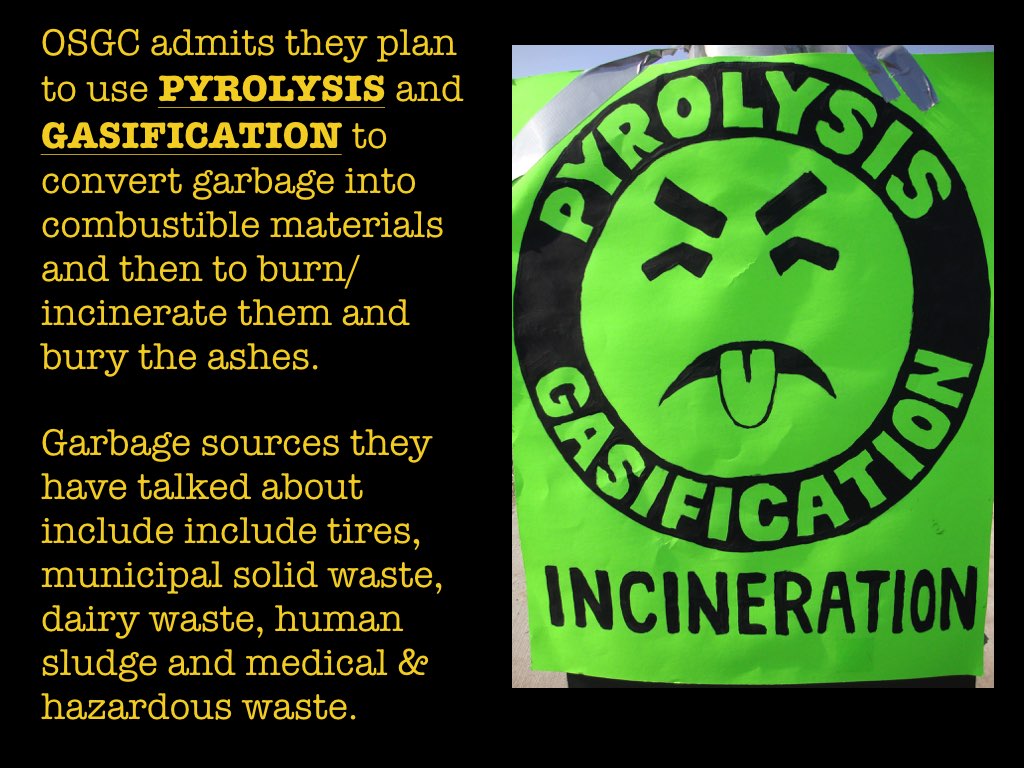
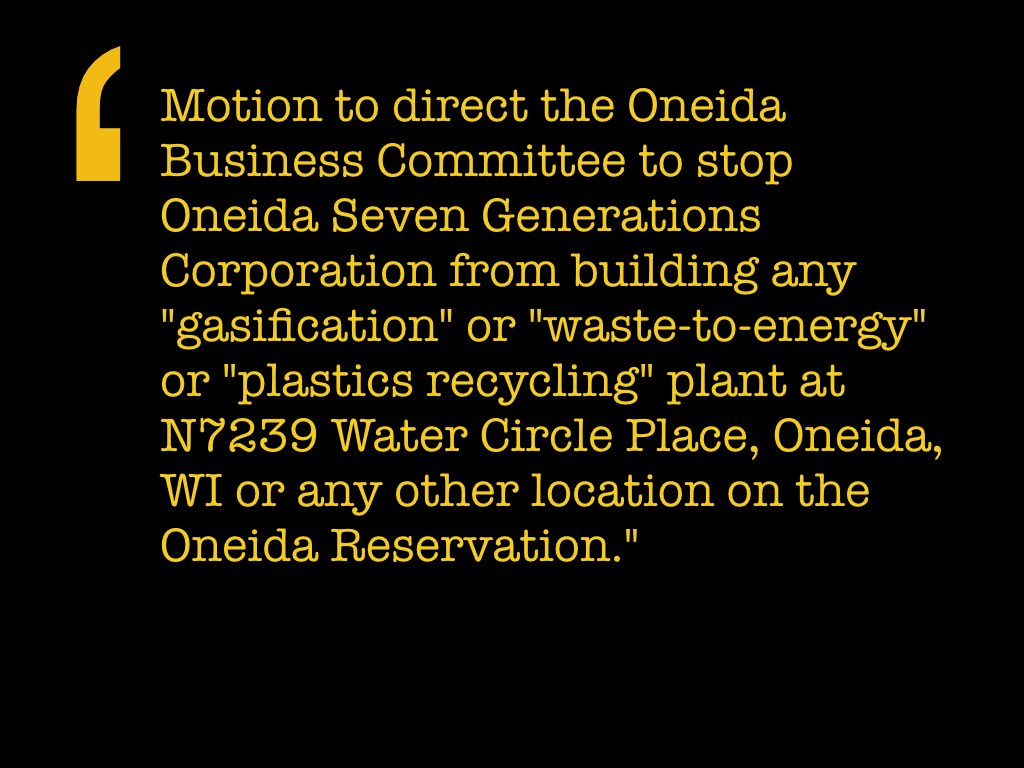
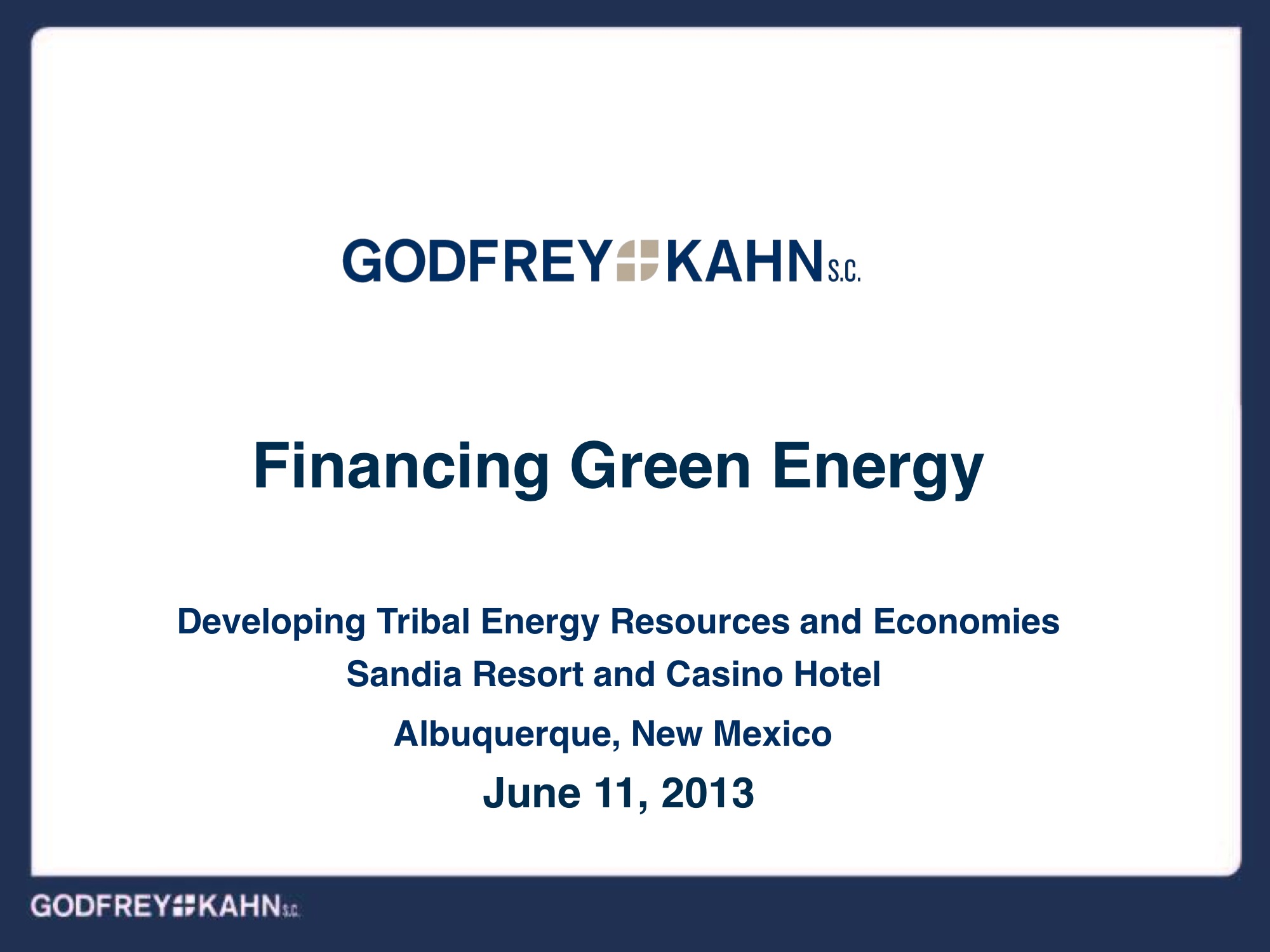
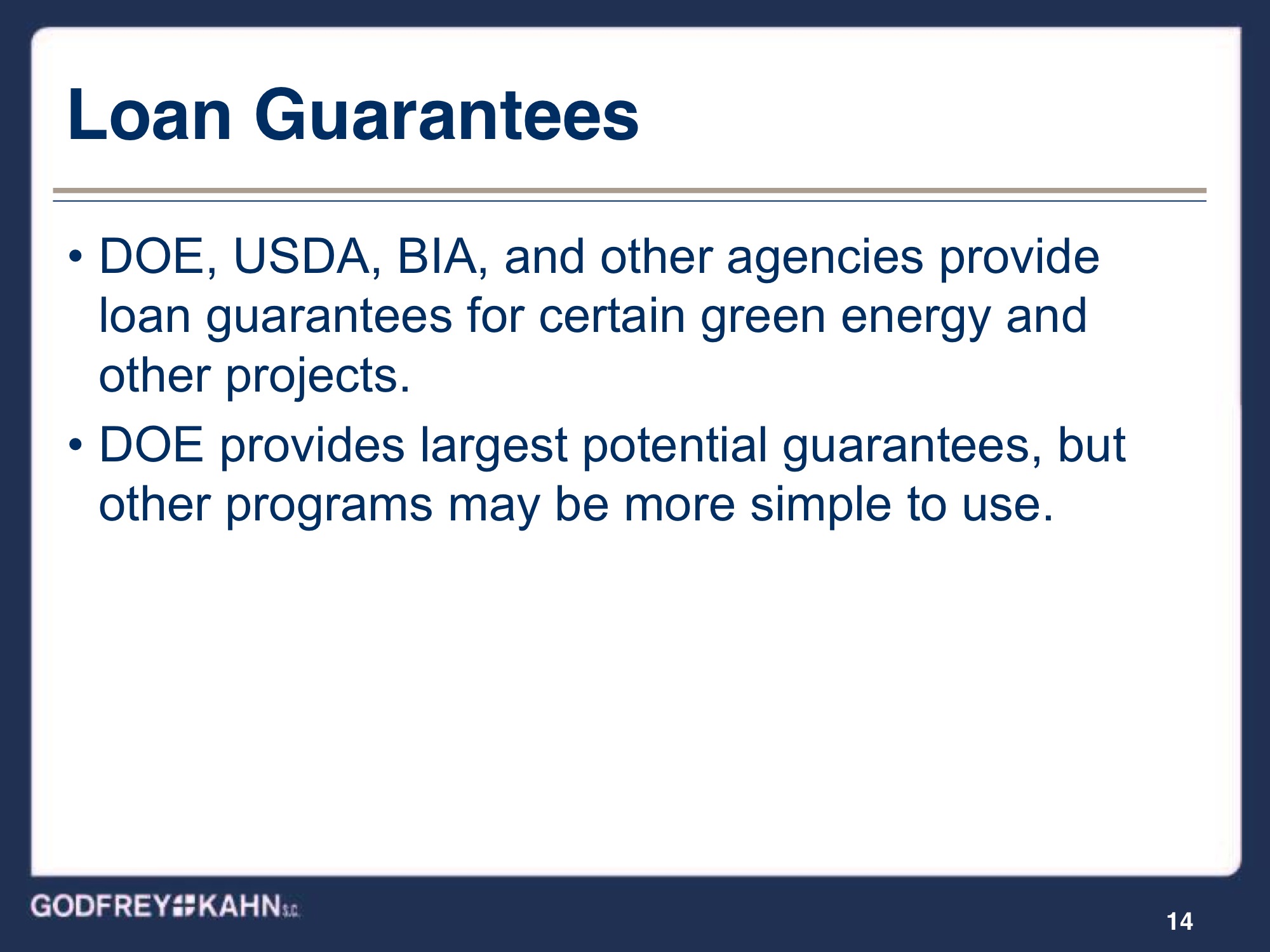

 •
• 